

CHALLENGE US!
With our running gears and special axle solutions, there is nothing that can’t be transported. Your requirements motivate us to create new things. They inspire us to use our entire engineering expertise and decades of experience to develop innovative and reliable solutions together with you – customised for the type of vehicle and intended use.
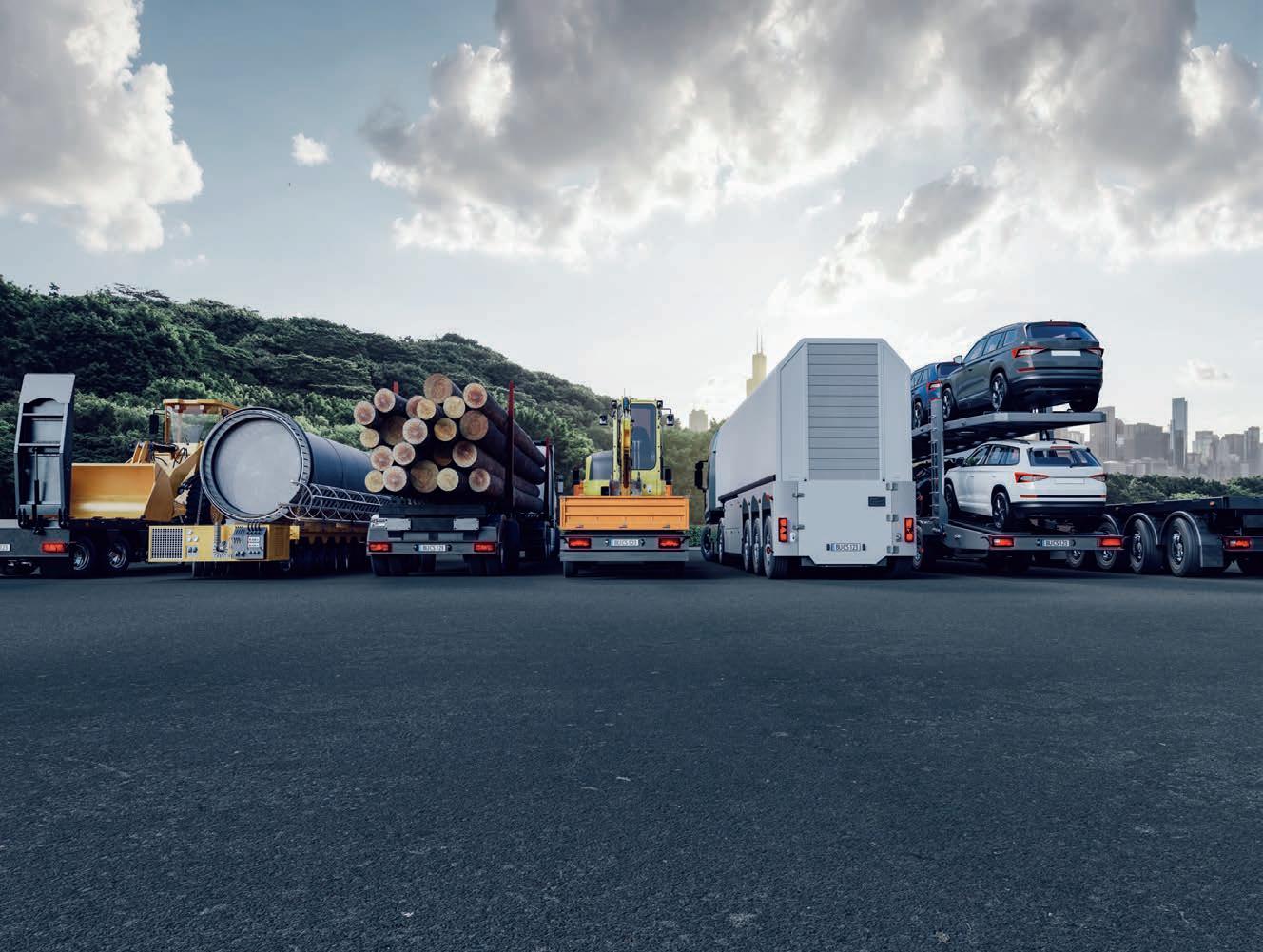
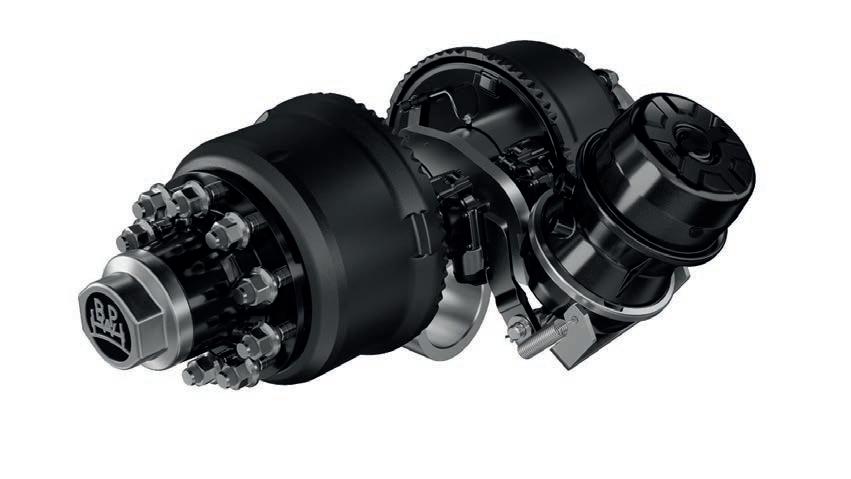
The swing axle masters any heavy transport - even on critical ground and difficult terrain. It is part of our individual solutions that are uniquely powerful and resilient. Challenge us!
INDIVIDUAL RUNNING GEAR SOLUTIONS FOR SPECIAL TRANSPORT TASKS. MORE
34
IN THIS ISSUE
BUSINESS
34 MARKET REPORT
From its ancient roots, transport has been a defining aspect to Saudi Arabia’s economic and cultural fabric.

50 INDUSTRY VOICE
JOST CEO, Joachim Dürr, reflected on JOST’s dominant global market position which led the KKS’ arrival down under.
52 BUILT TO ASK
Valk Welding helps Australian trailer builder, MaxiTRANS, with its growth ambition.
54 EXECUTIVE PROFILE
An exclusive interview with SAFHolland Middle East Managing Director, Jean Khoury.
GAME CHANGER
CIMC Vehicles proves to be a powerful world leader in the international trailer manufacturing scene with its commitment to state-of-the-art technology, driven in part by an entrepreneurial spirit that is capitalising on new opportunities, particularly in electrification and the final mile.
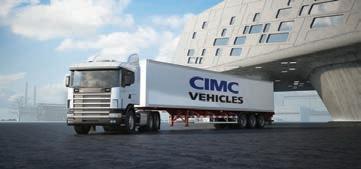
”OVER THE PAST 20 YEARS, WE HAVE CONSISTENTLY PURSUED INNOVATION, INCREASING OUR INVESTMENT IN GLOBAL, ADVANCED TECHNOLOGIES AND INTRODUCING AND INCUBATING ADVANCED RESEARCH AND DEVELOPMENT METHODS AND MANUFACTURING TECHNOLOGIES.”
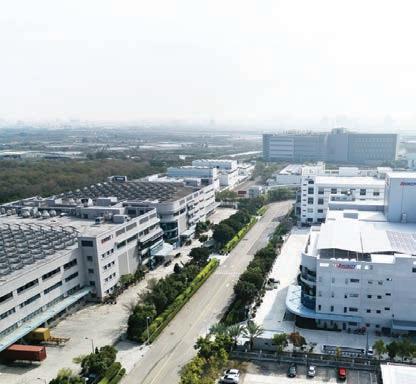
CIMC Vehicles CEO and President, David Li
56 EVENT REVIEW
More than 75,000 visitors from more than 120 countries attended this year’s Transport Logistic event in Munich to see innovation in transport across all modes.
FEATURES
40 REFRIGERATED TRANSPORT TECHNOLOGY
See what GORICA and Brianza Plastica bring to the cold chain transportation market.
46 BODY HARDWARE, EXTRUSIONS AND LIGHTS
A showcase of technologies from SAFHolland and Lucidity Group.
65 SPECIAL REPORT
By 2024, vehicles purchased for transport use in California will have to start transitioning to zero-emissions, just the first of various regulations set to unfold over the next 20 years.
HELD TO ACCOUNT
IT IS A PRIVILEGE TO USE THIS publication as a means to dive deep into industry issues and ask pertinent questions. Earlier this year a US organisation criticised a government agency’s regulation on what is essentially a phased-in transition toward zero emission commercial vehicles. There was a lot of noise about ‘forcing’ carriers to invest in new technologies and our editorial team investigated claims from a number of sources about the pros and cons. Read our special report on the subject and please let us know what you think of this situation.
Whether you agree, disagree or are indifferent to the matter, we are keen to learn more as sustainability and the uptake of new technologies is rapidly becoming the norm. The likes of CEVA Logistics proudly declared at this year’s Transport Logistic event in Munich, Germany, that it is committed to growing its electric vehicle fleet to more than 1,450 units over the next three years and other transport and logistics companies are following suit. More recently, Schmitz Cargobull delivered an all-electric trailer to a fleet in Romania and there are so many other incredible innovations in the pipeline. Meanwhile, take a look at what is happening on Britain’s roads. At the time
of writing there were about 3,000 Longer Semi-Trailers (LSTs) using that freight network and that is expected to increase following new legislation. These heavy goods vehicles are typically up to 2.05 metres longer than the current standard semi-trailers on UK roads (15.65 metres instead of 13.6 metres). Important to note these are not the road trains permitted in some other countries or the 25.25-metre designs found in some EU countries. Also, new guidance on the approval and intended use of these vehicles has been released for transport operators which is fantastic. There are concerns about the impact it may have on infrastructure, though, and there are other voices that are vocal about safety risks to cyclists and pedestrians however you only need to consider the economic and tangible benefits of leveraging efficient road transport technologies to realise that this will lead to reductions in emissions and fuel and help to minimise the environmental impact with fewer truck movements required for freight tasks.
CEO
John Murphy john.murphy@primecreative.com.au
COO
Christine Clancy christine.clancy@primecreative.com.au
INTERNATIONAL SALES
Ashley Blachford ashley.blachford@primecreative.com.au
MANAGING EDITOR
Luke Applebee luke.applebee@primecreative.com.au
JOURNALISTS
Peter White peter.white@primecreative.com.au
Louise Surette louise.surette@primecreative.com.au
DESIGN PRODUCTION COORDINATOR
Michelle Weston michelle.weston@primecreative.com.au
ART DIRECTOR
Blake Storey DESIGN
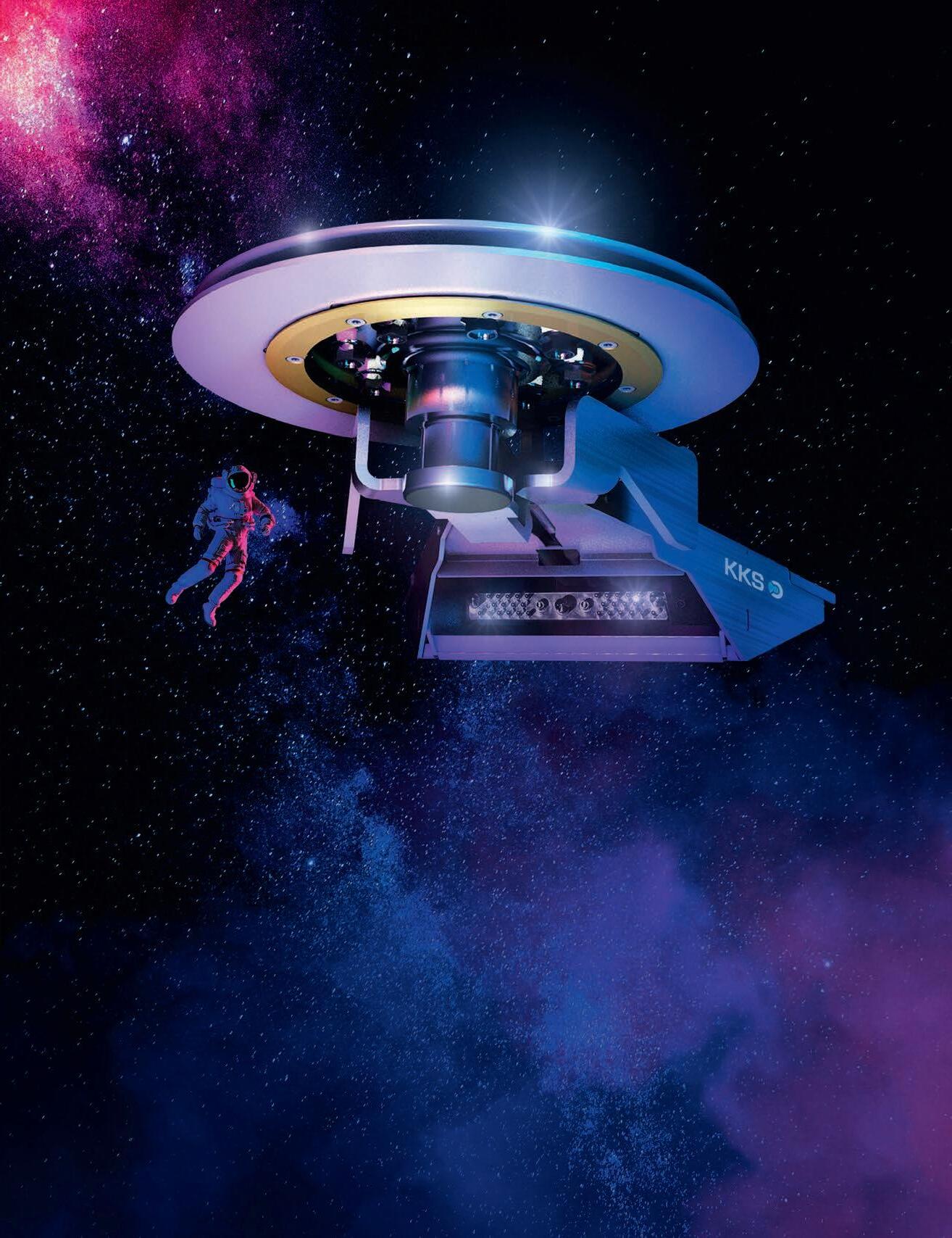
Kerry Pert, Louis Romero
CLIENT SUCCESS MANAGER

Salma Kennedy salma.kennedy@primecreative.com.au
HEAD OFFICE
Prime Creative Pty Ltd
379 Docklands Drive Docklands VIC 3008 Australia p: +61 3 9690 8766 f: +61 3 9682 0044 enquiries@primecreative.com.au www.globaltrailermag.com
SUBSCRIPTIONS
+61 3 9690 8766 subscriptions@primecreative.com.au
Global Trailer is available by subscription from the publisher. The rights of refusal are reserved by the publisher.
ARTICLES
All articles submitted for publication become the property of the publisher. The Editor reserves the right to adjust any article to conform with the magazine format.
COPYRIGHT
Global Trailer is owned by Prime Creative Media and published by John Murphy. All material in Global Trailer is copyright and no part may be reproduced or copied in any form or by any means (graphic, electronic or mechanical including information and retrieval systems) without written permission of the publisher. The Editor welcomes contributions but reserves the right to accept or reject any material. While every effort has been made to ensure the accuracy of information, Prime Creative Media will not accept responsibility for errors or omissions or for any consequences arising from reliance on information published.
The opinions expressed in Global Trailer are not necessarily the opinions of, or endorsed by the publisher unless otherwise stated.
Follow us on twitter @Globaltrailer
OUT OF THIS WORLD

JOST KKS – push-button trailer coupling
#futurenow – Thanks to our revolutionary coupling system you can now change semitrailer quickly and safely out of the cab. Your start in the future of logistics. Ready to beam up?
NEWS INTERNATIONAL
AFRICA & ASIA
SOUTH AFRICA
Truck body and trailer manufacturer, Serco, was tasked with building three mobile clinics to boost local health services.
Truck rental and logistics company, Spartan Truck Hire, specified Serco for the project.
These clinics will be used by Shout-ItNow in areas where there is little or no access to medical care and attention in South Africa.
The deal was funded by PEPFAR – the United States’ President’s Emergency Plan for AIDS Relief – which is the largest commitment by any nation to address a single disease with its activities focusing on expanding access to HIV prevention, treatment and care interventions.
Shout-It-Now is a proudly South African organisation which aims to empower youth to have bold conversations about sex and relationships through innovative approaches to reach communities with free sexual and reproductive health services.
Shout-It-Now works in partnership with the SA Department of Health and is funded by PEPFAR through the Centres for Disease Control and Prevention and Grand Challenges Canada.
The three mobile clinics needed to be fitted with all the equipment necessary for the efficient and all-round functioning of a modern health care provider.
Serco built the 9.5m insulated truck bodies with provisions to accommodate the required equipment which was fitted and installed in co-operation with a variety of local suppliers.
Features in and on the vehicles include cubicles to cater for a variety of patients day or night, air conditioning, electric power supply (solar and
generator backup), Wi-Fi, TV, ablutions, a kitchenette, furniture, and storage compartments in the belly of the chassis with full livery on the boxes. The clinics are already in use and according to the Fleet Director of Spartan Truck Hire, Shailesh Koobair, the client is very satisfied with the vehicles which have more than exceeded their operational expectations.
Koobair said Spartan Truck Hire has been a customer of Serco’s over many years. “We are very happy with the service and quality of the products we have received from Serco and will continue to use them as our needs require.”
Spartan Truck Hire, which has been in business in South Africa for more than 40 years, and has more than 2,000 vehicles in its fleet. It operates in Johannesburg, Cape Town, Pretoria and Durban.
CHINA
Global transport and logistics company, Freja, is opening a new office in Shenzhen, China, as it continues to expand its service offerings in air freight, sea freight, project forwarding and e-commerce.
This will be the fourth office, with others located in Shanghai, Qingdao and Guangzhou.
“The opening of the new office is a natural step in our development, and it will support us in better fulfilling our customers’ needs,” said Freja China Managing Director, Leo Hu. “After a slow economic recovery due to Covid-19 and years of political uncertainty, we want to strengthen today’s supply chains by expanding our business.”
The Danish company said the new office will allow it to improve transportation speed and its cargo size range.
CHINA
Kuehne + Nagel is expanding into the area of animal healthcare logistics, addressing a growing need in greater China.
The global transport company has partnered with Elanco Animal Health, an American animal pharmaceutical company, to open two dedicated fulfilment centres in Chengdu, West China.
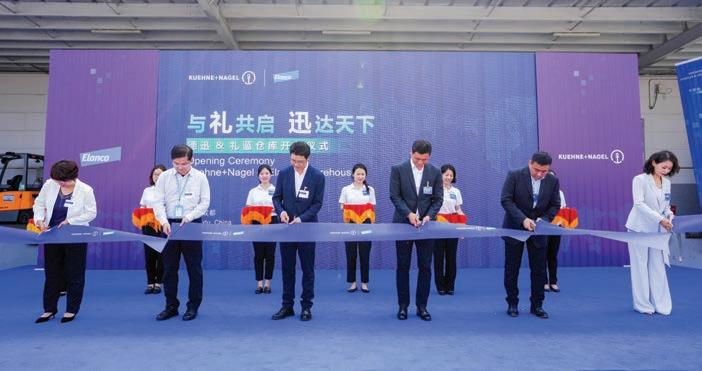
The new facilities comprise a 3,000-square-metre manufacturing
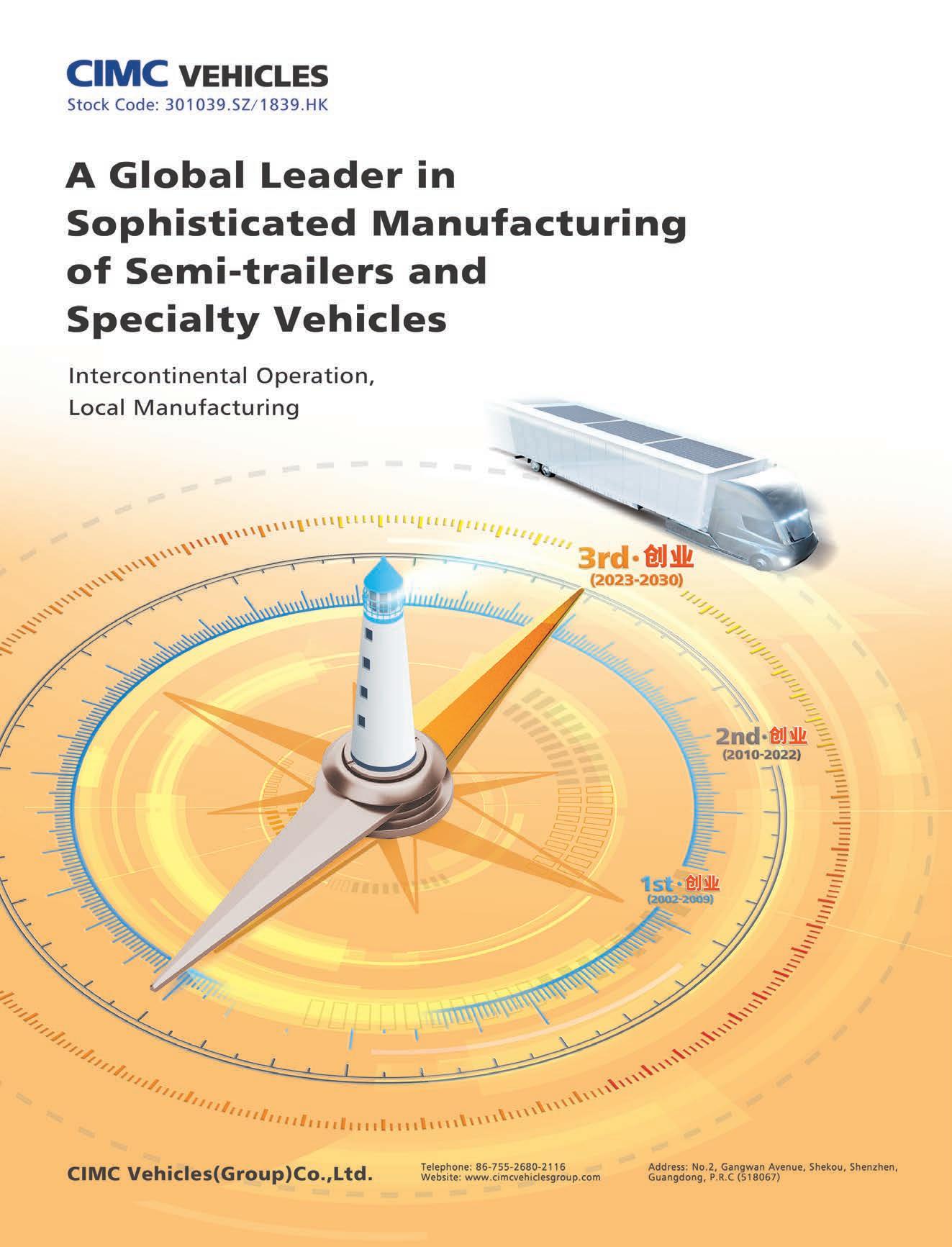

GROUPED. FOR SUCCESS.
NEWS INTERNATIONAL
ASIA & EUROPE
warehouse and a 12,000-square-metre distribution centre for finished products. “As an animal healthcare customer, Elanco relies on the highest quality standards,” said Marcello Ferrari, Global Vice President Customer Development Healthcare and Contract Logistics. “With our HealthChain label, we ensure that our customers’ trust is a core element of our strategic Roadmap 2026.” To streamline the process and satisfy the stringent standards on healthcare products administration, Kuehne + Nagel has implemented a state-of-the-art warehouse management system and computerised validation program for the project.
Combining decades of experience gathered in Asia, Australia, Europe and the US, global manufacturing powerhouse Fuwa has forged the strongest network of truck trailer component specialists in the world. Merging local expertise with world-leading manufacturing prowess and an irrevocable commitment to innovation, our entire range of axles, suspension systems, landing legs, couplings, king pins, fifth wheels and ball races have been designed for one goal only -- to guarantee your success. Join the Group. Join the Revolution.
transportation project is an important symbol of the transformation to green and low-carbon development, conforms to the development trend of high efficiency and low energy consumption and also conforms to the development requirements of high-standard economic and trade rules,” said Jin Shaojing, Director of Shanghai Huangpu District Commission of Commerce.
SINGAPORE
FUWA ENGINEERING
p: +65 68631806
CHINA
“In addition, it conforms to the Chinesestyle modernisation, pushes the industry to move towards high-end, optimises the modern logistics system, and steadily promotes the high-quality development goal of energy conservation and carbon reduction.”
making significance.”
SINGAPORE
Following its win at the top of the World Bank’s Logistics Performance Index (LPI), Singapore will host its first multimodal logistics trade fair.
Set for 1-3 November this year, the event will focus on logistics, mobility, IT and supply chain management.
AUSTRALIA
FUWA HEAVY INDUSTRIES

p: +86 750 5966333
Dylan Lu, Vice President of Elanco in China, said China is the second largest market for Elanco, after the United States.
“Thanks to Kuehne + Nagel, we managed to consolidate our existing facilities and upgrade our supply chain operation to the next level.”
CHINA
International logistics provider, Yusen Logistics, recently launched a new hydrogen-powered transport service. On 28 March, the Yusen Logistics Hydrogen Transport Launch Ceremony was successfully held at YL-CN Kunshan Huaqiao Logistics Centre.
During the event, Yusen Logistics showed all guests its new hydrogen fuel cell truck and the prospects of the hydrogen transportation business. With environmental issues being one of the most urgent and critical areas at present, the launch of the truck was a crucial step in Yusen Logistics’ ESG practice.
“Yusen Logistics’ hydrogen
Yusen Logistics China President and CEO, Tomoo Moriya, said the project is just the beginning of the company’s sustainable development.
“In the future, Yusen Logistics will continue to promote initiatives based on long-term sustainable development prospects in line with our brand promise and we are willing to work with all partners to promote sustainable social development,” he said.
In March this year, Yusen Logistics joined the Green and Low-Carbon Development Branch of Shanghai Foreign Investment Association as a founding member.
“Carbon reduction in road transportation is the key to the low carbon transition in the transportation sector, in which carbon emissions from trucks play a pivotal role,” said Huang Feng, President of Shanghai Foreign Investment Association.
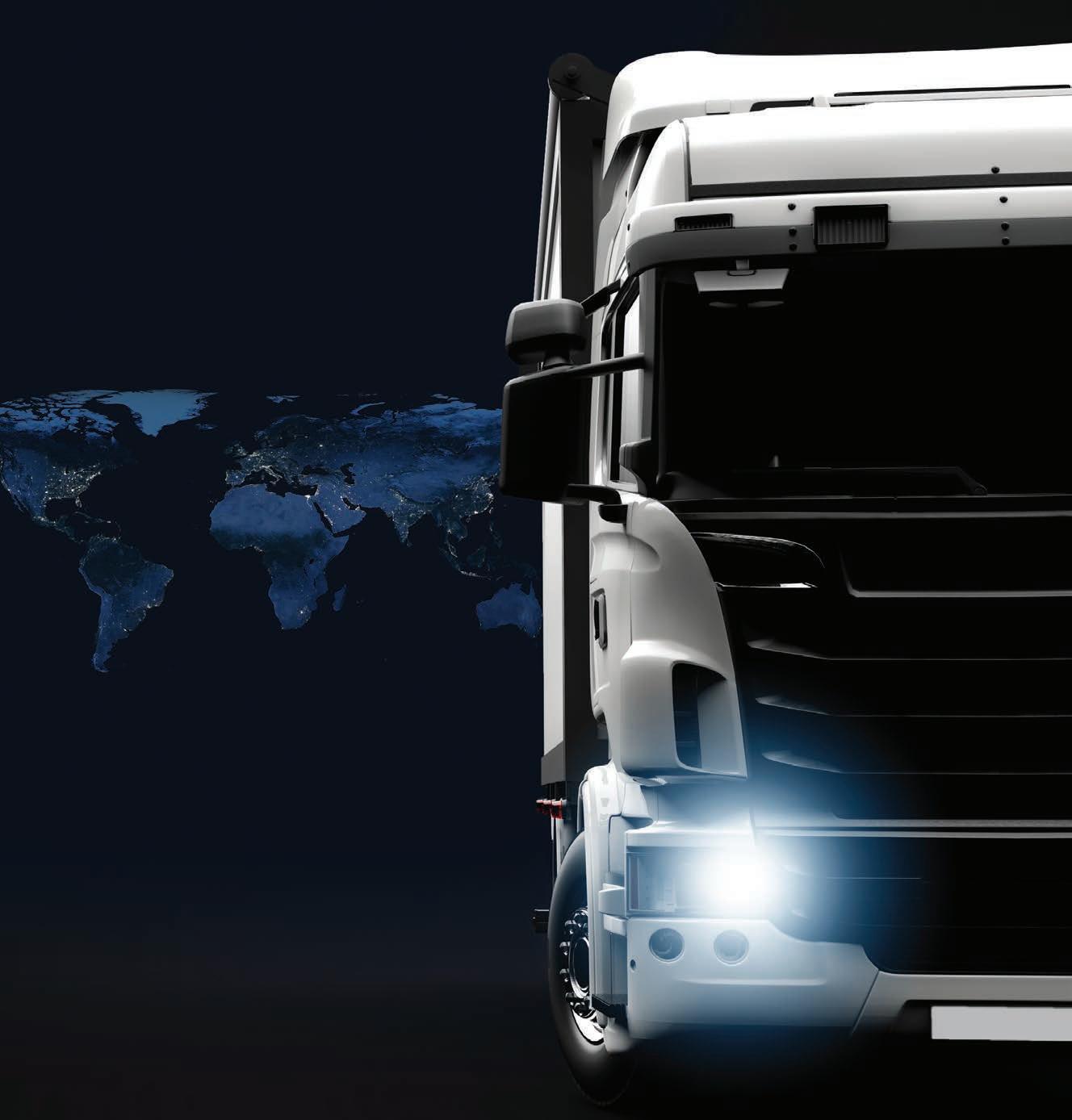
“Yusen Logistics launched its hydrogen energy transportation business in a timely manner to help logistics customers easily achieve the goal of ‘zero carbon emissions’ which is of epoch-
EUROPE
FUWA K-HITCH
p: +61 3 9369 0000
khitch.com.au
“Singapore is the gateway to the greater Southeast Asia region and the most dynamic and exciting hotspot for transport and logistics right now,” said Stefan Rummel, CEO of Messe München, the organiser of the event.
“Many global companies are already active here, and many more want to come to reap the rewards of the attractive conditions.”
The LPI ranking gave Singapore the best scores in the quality of logistics services, competence, and infrastructure categories. With its favourable geographical location on the Strait of Malacca, the city-state is home to one of the world’s most important transhipment hubs.
AUSTRIA
Geis Group has gained a 66 per cent stake in Austrian transport and logistics company, Quehenberger.
The German transport solutions business is taking over the shares retrospectively as of 1 January 2023. The remaining 34 per cent is held by the previous majority owner, Christian Fürstaller, who will continue to run the company as CEO and retain all its workforce. Their combined service offering ranges from road freight transport and contract logistics to air and sea freight.
Geis Group’s managing partners Hans-
VALX International p: +31 (0)88
GROUPED FOR .




NEWS INTERNATIONAL
EUROPE
Wolfgang Geis and Jochen Gris said in a joint statement that they will now focus on organic growth and use synergies to expand the business with plans to create a presence in central and south-eastern Europe.
With a total of more than 10,000 employees at approximately 200 locations in 13 countries the group of companies is hoping to become a leading logistics player in its markets. The company said customers will benefit from this partnership as they will now get access to a much larger network that stretches from Luxembourg to the Black Seas and from the Baltic Sea to the Mediterranean.
Branches in Russia, Belarus, Kazakhstan and Ukraine were excluded from the takeover. These companies were spun off from the Augustin Quehenberger Group into a separate holding company, CF Logistics, in 2022.
AUSTRIA
German transport and logistics company, a. hartrodt, has expanded its European network by opening an office in Austria. Previously, the company had serviced Austrian customers from Germany, the Czech Republic or Slovakia.
“With our own local office, negotiations are easier,” said Christine Mair, who will head up the new office and plans to hire a sales expert and up to three operational employees. This is in line with a. hartrodt’s European sales strategy of investing in locations and regional specialists.
Mair said she wants to develop competitive solutions for the Austrian market which has a population of nine million and a strong base of small and medium-sized enterprises with strong
export industries.
a. hartrodt has more than 100 locations and 2,000 employees around the world.
BRITAIN
New government laws allowing Longer Semi-Trailers (LSTs) on Britain roads has sparked debate as to whether the decision is safe or necessary. There are currently 3,000 of these longer semi-trailers on the road but they are expected to increase with the new legislation, which comes into effect at the end of May.
The Department for Transport (DfT), which has been trialling the trucks since 2011, has stated they are safe and will ultimately help businesses become more productive and drastically reduce carbon dioxide emissions.
LSTs are a type of Heavy Goods Vehicle (HGV) trailer up to 2.05 metres longer than the current standard semi-trailers on UK roads – 15.65 metres instead of 13.6 metres. These are not the road trains permitted in some other countries or the 25.25 metres designs in use in some EU countries.
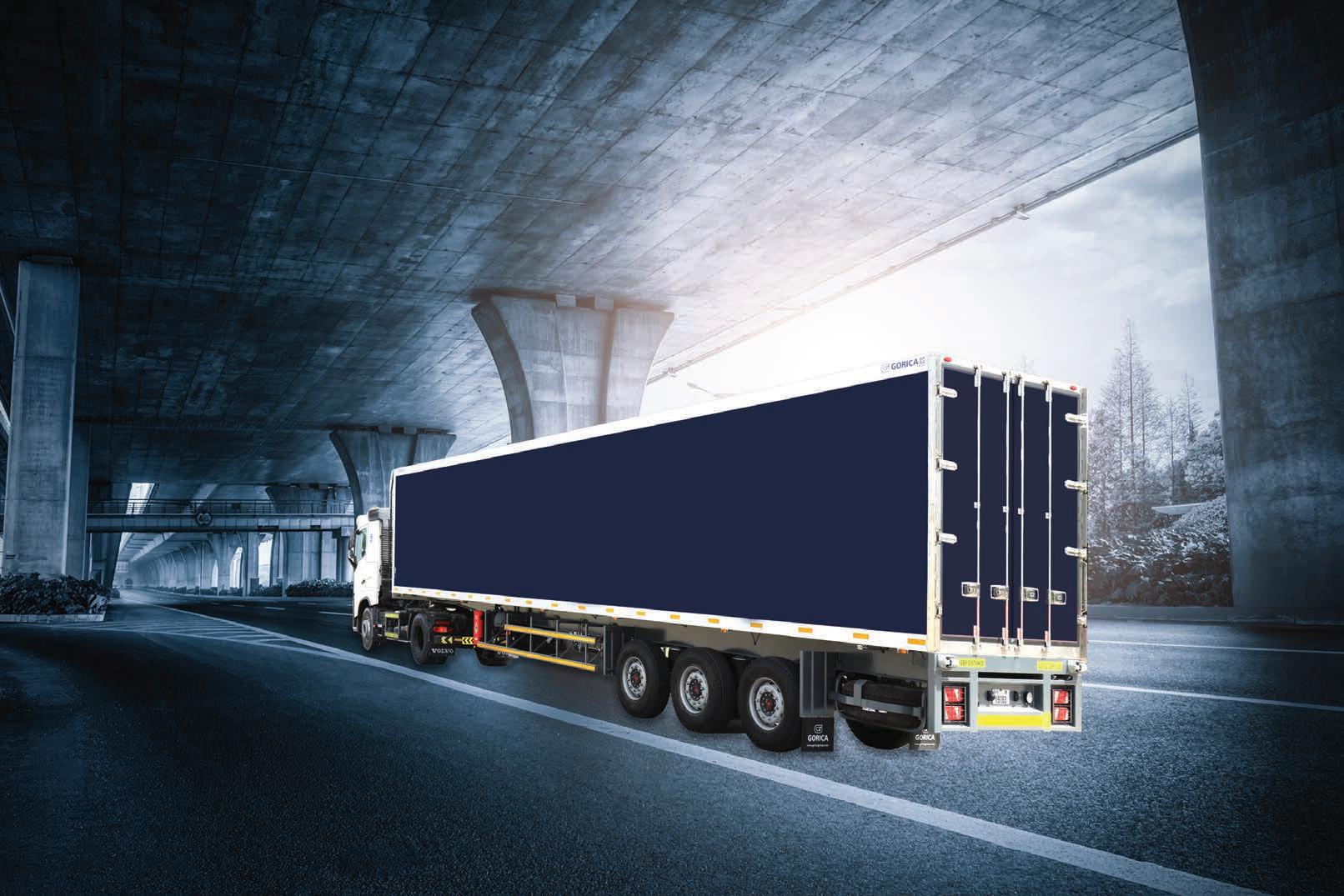
The total weight of the LST, the goods and the prime mover, according to DfT, must still be within the UK domestic weight limit of 44 tonnes. They must pass the turning circle test applied to the existing 13.6 metre trailers, for which the LSTs require a steered rear axle. Fully loaded LSTs can move the same volume of goods using fewer journeys than current trailers, for little change in fuel use per mile, while reducing overall emissions, congestion, and collision risk. LSTs complement other approaches to freight carbon reduction, such as modal shift, increasing engine efficiency, and the use of electric vehicles, but LSTs
can be implemented without the need for further significant technological and infrastructure development.
Road safety advocates, however, have voiced concern that the 18.55m-long trailers could pose a danger to cyclists and pedestrians because of their increased tail swing.
Tail swing is the movement of the rear of a truck as it turns and can increase its area, depending on the length of the trailer and the weight of the load.
According to the DfT, the new trailer rule is set to result in £1.4 billion of economic benefits and take one standard-size trailer off the road for every 12 trips. It estimates the vehicles will save 70,000 tonnes of carbon dioxide from being released into the atmosphere over 11 years.
Furthermore, the trial demonstrated that, with appropriate operational management, LSTs can be operated safely and deliver up to a 13 to 14 per cent reduction in real world emissions, with an average saving of 8.0 to 9.0 per cent across the whole trial. The trial also carried out route modelling and specialist analysis of the impact of LSTs on vulnerable road user groups. Following demonstration of consistent trial safety and emissions performance, DfT has introduced regulations to permit LSTs to be used widely across Britain. The Campaign for Better Transport, however, has argued that the new size will pose a safety risk and possibly damage current infrastructure. It maintains that the government should be focusing its efforts on increasing train transport as opposed to larger trucks.
According to the European Rail Freight Forward coalition, every freight train emits 80 to 100 per cent less CO2, than

NEWS INTERNATIONAL
EUROPE
a freight truck and replaces 50 trucks at a time.
EU
New commercial vehicle registrations are going gangbusters across the European Union (EU).
For Q1 2023, new truck sales reached 86,455 units, up 19.4 per cent compared to Q1 2022.
All member states except Denmark (-8.9 per cent) recorded substantial growth, including the four largest markets: Germany (+20.9 per cent), France (+12.4 per cent), Poland (+19.1 per cent) and Italy (+9.5 per cent).
As for the fuel types of new trucks, 96.1 per cent are diesel, 1.1 per cent are electrically chargeable and 2.7 per cent are ‘other’.
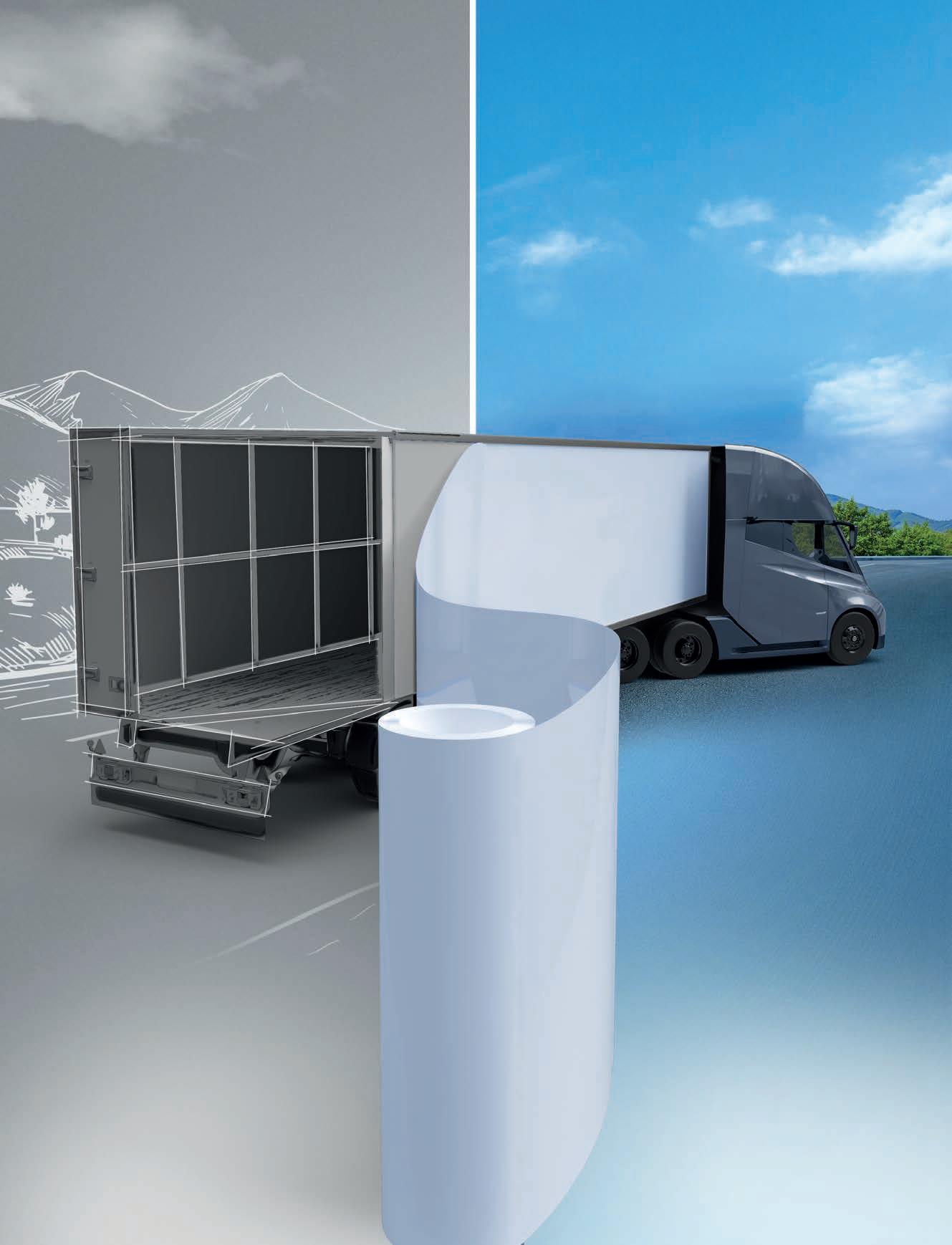
“Diesel trucks remained the top choice for buyers in the EU, representing 96.1 per cent of all new registrations in the first quarter of 2023,” the European Automobile Manufacturer’s Association (ACEA) said in a statement.
“New diesel truck registrations increased by 19.4 per cent, with most member states reporting double- or triple-digit gains. Having recorded a remarkable 408.5 per cent growth, electrically chargeable vehicles now represent 1.1 per cent of all EU trucks, with 939 units.” ACEA is a Brussels-based trade association of the 14 major car, van, truck and bus producers in Europe.
The ACEA commercial vehicle members are DAF Trucks, Daimler Truck, Ford Trucks, IVECO Group, MAN Truck & Bus, Scania, Volkswagen Commercial Vehicle and Volvo Group.
GERMANY
Ulrich Steenken will assume the role of
Chief Financial Officer (CFO) at global logistics service provider, Leschaco, headquartered in Bremen, Germany. In Steenken, the company has chosen an internationally experienced finance manager with proven industry expertise, who thus completes the management board.
After studying business administration at the University of Cologne, Germany, the graduate business economist started his professional career as a commercial controller at Trans-O-Flex, Weinheim, Germany. He then moved to Kuehne & Nagel Inc., New York City, USA, where he assumed responsibility as Regional Controller Latin America. This was followed by key positions in financial management at Rohde & Liesenfeld International GmbH & CO KG, Hamburg, Germany (part of the Geodis Group since 2008) and Paul Günther Logistik AG. Hamburg, Germany. In 2008 he moved to the Geodis Group, an international logistics service provider, where he most recently held the position of CFO at Geodis FF Germany GmbH & Co KG, Hamburg, Germany. Before joining the Leschaco Group, Ulrich Steenken was the managing director of Confion Consulting GbR.
In his role as CFO, Ulrich Steenken will be responsible for the financial management of the Leschaco Group as a member of the Management Board and will work closely with Constantin Conrad, Chief Executive Officer (CEO) of the group to drive the growth plans of the familyowned company and the strategic to achieve goals.
“We welcome Ulrich Steenken as CFO on the Leschaco Management Board and look forward to working together to achieve our future goals,” said Conrad.
“We are convinced that his leadership experience and specialist knowledge will be of great value for the growth and success of our company will be.”
In addition to CEO Conrad, members of the Management Board of the Leschaco Group are Oliver Oestreich (Chief Operating Officer), Nils Fahrenholz (Incoming Chief Operating Officer) and Steffen Küpper (Chief People and Culture Officer).
GERMANY
Schmitz Cargobull subsidiary, Cargobull Parts & Services GmbH, has appointed a new Director for Parts and Sales.
Christian Renfordt has accepted the role and has been working in the automotive aftermarket space since 2002. He will be responsible for sales, product management and pricing of international spare parts.
Renfordt has already put a number of initiatives in place to ensure efficient spare parts logistics, in addition to expanding the product and service portfolio with attractive pricing. “Quality spare parts, easy identification of spare parts and high availability are important for our customers,” he said. “In the event of a repair, the trailer must be back on the road quickly. Because only a running trailer is successful and profitable.”
Cargobull Parts & Services GmbH is a wholly owned subsidiary of Schmitz Cargobull AG. In the aftersales area, it takes care of all the needs of customers and their vehicles throughout Europe.
FINLAND
Speed Oy has taken delivery of 20 Kässbohrer non-extendable light container chassis K.SHG L vehicles
www.flatlaminates.com
We stand right in the middle of every project realization.
Close to you since 1962
HIGH QUALITY GRP FOR COMMERCIAL VEHICLES.

NEWS INTERNATIONAL
EUROPE
specially developed for its Nordic operations.
The container chassis are linked via dolly and are operated as A-double combination.
Founded in 1992, Speed Oy offers unit transports and delivers containers from all container ports in Finland. Together with its offices in Vuosaari Harbour, Helsinki; in Mussalo Harbour, Kotka; in Port of Rauma and in Hollola, Lahti area, Speed Oy supports shipping companies, their agents, Finnish import and export companies and forwarding agencies. With its new Kässbohrer non-extendable K.SHG L container chassis vehicles specially engineered to provide ease of manoeuvrability for longer trailer combinations compliant with Nordic regulations, Speed Oy will increase operational efficiency and allow higher payload and lower fuel consumption.
Tuomo Vallas, General Manager of Speed Oy, Matti Virtanen, Sales Director of Vak Oy and Mehmet Önen, Head of Key Account Management of Kässbohrer, attended the delivery ceremony and detailed their newly established partnership.
Vallas said: “As Speed Oy, we already know Kässbohrer container chassis vehicles. We preferred Kässbohrer vehicles as we trust their quality and robustness.
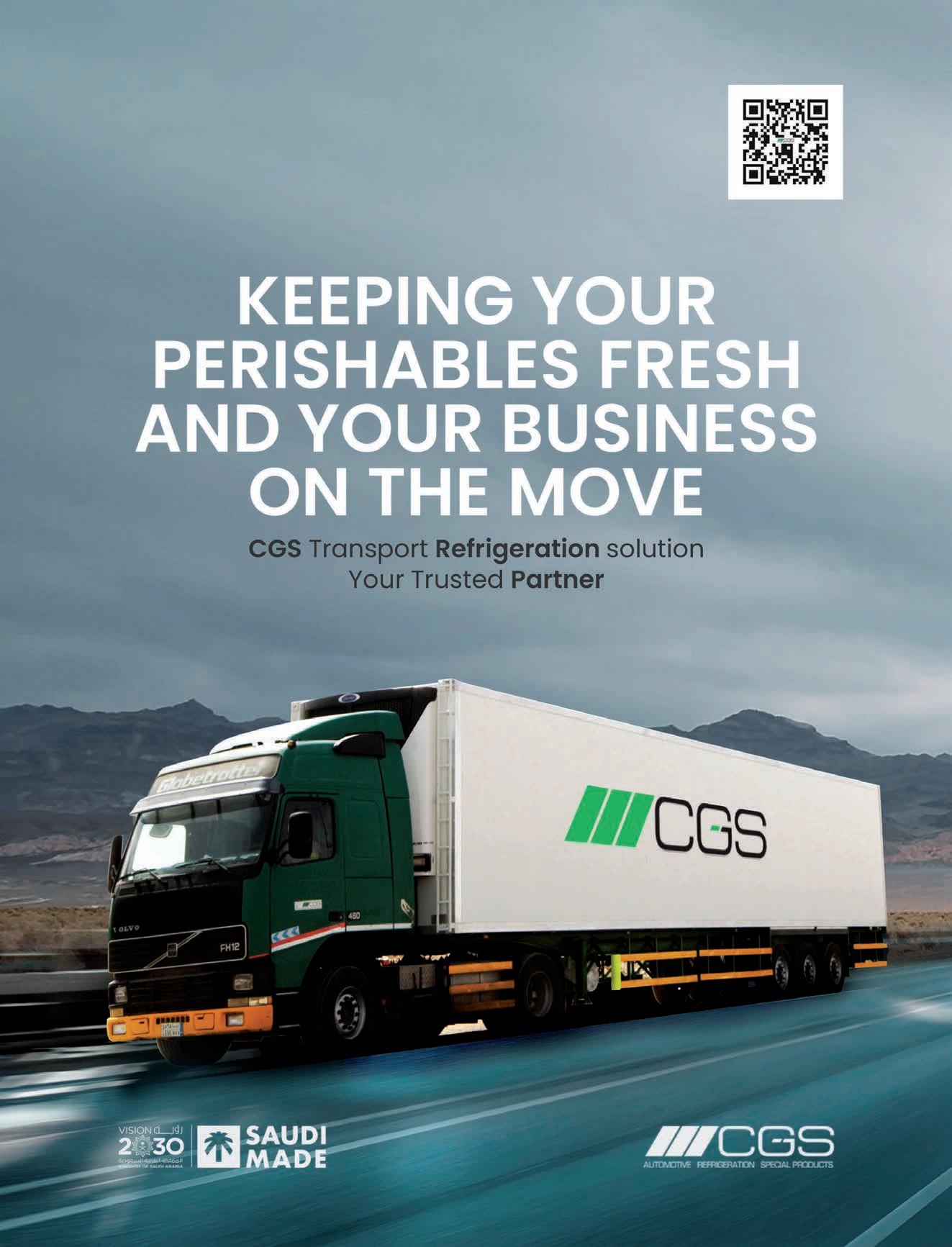
“The Kässbohrer Light Container Chassis offers to carry more weight without sacrificing its strength and durability. The Kässbohrer K. SHG L was redeveloped for meeting the flexibility need of our operations with the option to carry 40′. We operate our container chassis linked via dolly for A-double combination. With our new container chassis, we get one of the lightest combinations,
allowing higher payload and lower fuel consumption.
“The support from sales and after-sales teams makes it easy and efficient to work with Kässbohrer.”
Önen also shared his thoughts about the valuable cooperation.
“As Kässbohrer, our main priority is to make developments to satisfy our customers’ operational needs by presenting the highest number of options to meet their unmet operational needs,” he said.
“Designed specifically for our customer Speed Oy’s Nordic operations, our robust Lightweight Container Chassis K.SHG L with higher payload capacity is very durable, longest, and lightweight, enabling our customers to achieve maximum efficiency in their operations. K.SHG L enables lower fuel consumption with a light chassis design.
“Speed Oy operates by combining two container chassis via dolly reaching A-double combination. We have engineered our chassis to be easily manoeuvred on existing roads, the finest example of design and engineering excellence. Speed Oy safely operates Kässbohrer A-double combinations.
“As Kässbohrer, we meet the operational needs of our partners with our competent sales and after-sales support. We are very glad to build a partnership with Speed Oy. We will continue to develop our partnership with Speed Oy through our high-quality vehicles and the services we offer them.”
GERMANY
Equipment specialist, SAF-Holland SE, has started the financial year better than expected.
It generated sales of €480.4 million
in the first quarter – 29.9 per cent above the previous year’s level, and significantly above market expectation. SAF-Holland said solid organic growth combined with efficiency improvements in production-related areas and cost savings in administrative functions led to an increase in adjusted EBIT of 84.6 per cent.
The preliminary result, before income tax, increased to €28.6 million and was also above market expectations.
The outlook for 2023, according to the company, is an expectation of sales tending around the upper end of the range.
After suffering a recent cyber-attack, the company temporarily lost sales of €40 million, of which approximately €15 million was attributed to the first quarter of 2023 and a greater effect occurring in the second quarter.
It continues to expect to recover the majority of lost revenue over the course of the second and third quarters of 2023, although there was a one-time expense in the low single-digit million-euro range for IT security and consulting services.
UK
Cold chain carrier, P&S Logistics, has taken delivery of a rigid truck fitted with a Schmitz Cargobull M.KO COOL box body.
The bespoke vehicle was designed and built over the course of 15 months – a process that owner-operator Phillip Hudson describes as a labour of love. Hudson embarked on the upgrade of the 26-tonne vehicle with the aim of maximising the flexibility of his Middlesex-based European food distribution operations.
Built by Schmitz Cargobull in Lithuania,

EUROPE
the refrigerated box body M.KO COOL was shipped to the UK and equipped with Carrier Transicold’s Supra 1150 MT (multi-temperature) unit and ECO-DRIVE power module. It was fitted with a tail-lift sourced from Germany, with additional truck specifications including Kelsa light bars, safety cameras and interior equipment. The rigid was finished with a hand-painted livery, in original designs to reflect different aspects of the business.
Hudson also operates a Schmitz Cargobull drawbar reefer, equipped with a Carrier Transicold Supra 1050 unit. The ECO-DRIVE is able to run both the truck fridge and the trailer cooling unit electrically off the truck engine’s power take-off.
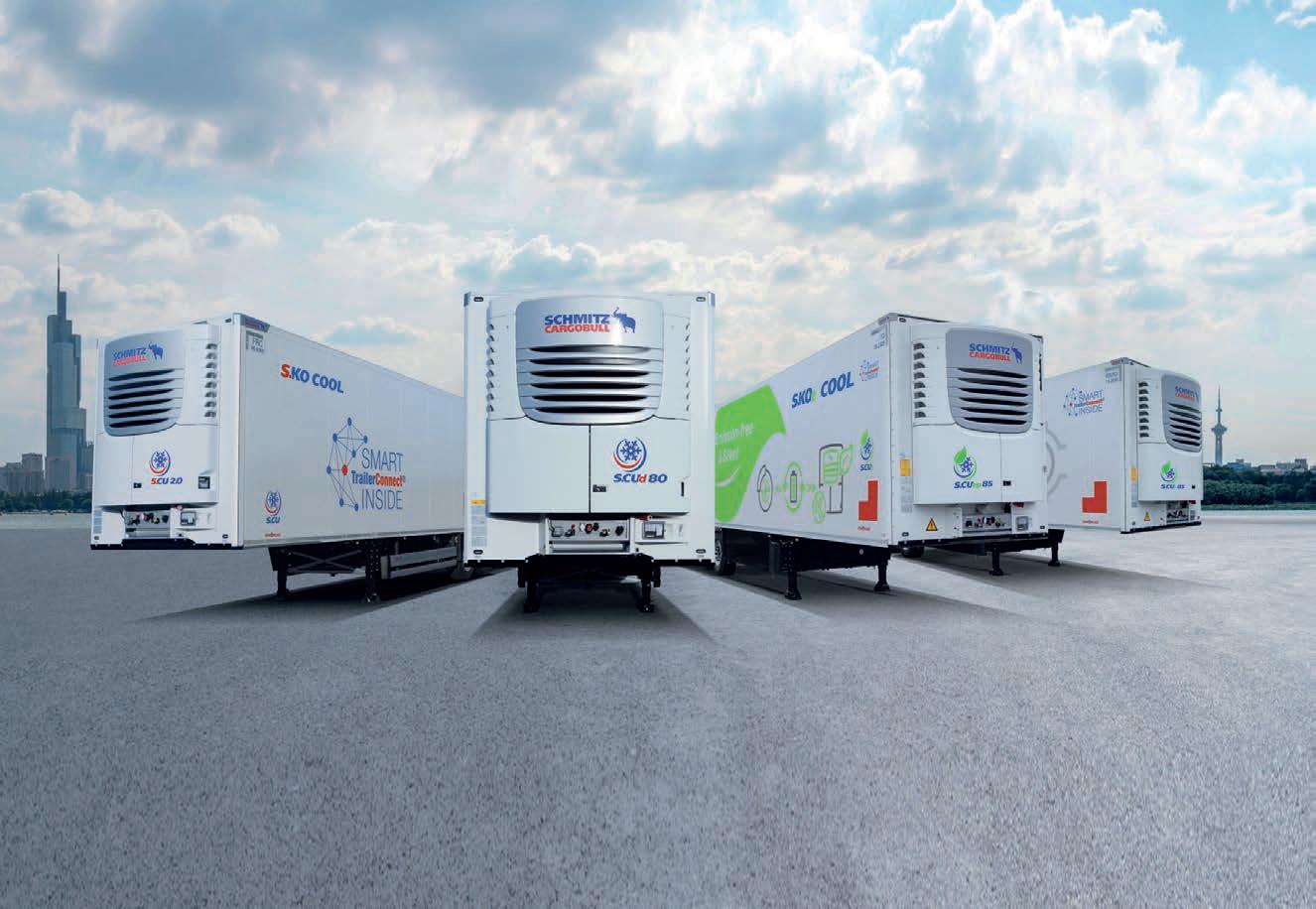
The drawbar was built to the same high specification as the rigid truck, featuring Schmitz Cargobull’s proven Ferroplast side panels, which are stronger yet thinner than Glass-Reinforced Plastic (GRP) bodywork – helping to increase the loading aperture inside the body.
“What I have is very rare,” said Hudson. “I wanted to create something highlyspecced which stands out from the crowd that I can use for the long-term. With the technology fitted, the truck and drawbar meet all the regulations, which has future-proofed my business.”
This box body has three different temperature zones for ambient, chilled and frozen goods.
“If I have work that only requires a 26-tonne truck, or there are weight restrictions, I can just park the drawbar,” said Hudson. “The bespoke, mechanically operated tail-lift also enables easy and quick loading and unloading of pallets by electric pump trucks.”
Used primarily to transport Slovakian food, the rigid has been liveried with
the country’s flag, with the cab painted with images of London where Hudson was born. The rear doors, designed with Hudson’s Polish wife in mind, feature the Wawel Dragon from Polish folklore as well as the country’s flag.
P&S Logistics’ relationship with Schmitz Cargobull dates back more than five years. The company first supplied Hudson with a rigid reefer in 2016 to help him expand his business operations.
LITHUANIA
Parcel delivery company, Venipak, has purchased an e-commerce wholesaler which represents the likes of LEGO, L’Oreal, Disney and Mattel.
The acquisition of Strengholt Entertainment BV, which was more than a year in the making, and is expected to form the basis for the expansion of Venipak’s e-fulfilment arm in Europe and the expansion of its air freight services across Europe, Asia and the Americas. The company’s business model will also change with its logistics now complemented by whole-sale channels for e-commerce.
Nerijus Raudonis, Venipak Group founder, said the company plans to set up 200 e-fulfilment centres in Europe where it will distribute goods. Plans are also underway to include Chinese and American branches in the wholesale trade.
According to the company, while Strengholt had a wide range of products, a developed IT infrastructure and a network of partners, they didn’t have an international model to bring their products closer to customers, to reach them faster.
“We will fill this gap in Europe and connect it to the Asian and US markets,”
said Venipak General Manager, Justas Šablinskas.
“Almost none of the e-commerce businesses operating in the Baltics have the kind of service that we will receive from Amazon, so as intermediaries, we will open up new business development opportunities for our customers.”
Venipak currently operates in the Baltic states, Poland and China. It provides parcel delivery, e-fulfilment and air freight with 251 self-service parcel delivery terminals in Lithuania and 201 in Latvia. In Estonia, the network of self-service parcel delivery terminals is currently being rolled out and two thirds of the planned 151 are already operational.
NORWAY
Danx has made a strategic alliance with Tromsø Budbil Sentral (TBS), the largest courier company in Norway, to ensure it can service hard-to-reach areas in the north of the country.
Danx, a spare part logistics and delivery specialist in the Nordic region and the Baltics, is hoping the investment will offer resource support while benefitting from TBS’s well-established local customer network, which stretches from Narvik to Kirkenes, in northern Norway. “By joining forces, we strengthen our offering to northern Norway, expand our network, and progress the Danx Carousel group’s ambition to become the European leader for time-critical in-night logistics,” said Danx Managing Director, Ole Larsen. “We’re looking forward to working with the TBS team to further develop their network, solution, and sector offering which will bring about more success together in the future.”
The new venture represents a significant
EUROPE
development for Danx, enabling it to provide its customers with a pre7am delivery service of regular and temperature-controlled goods to remote destinations.
Frank Riise, Managing Director of TBS, will continue to head up the courier service’s operations as it joins Danx. This development comes after Danx’s recent joint venture with Polish logistics specialist, ILS, which has boosted Danx’s time-critical and in-night logistics solutions in Eastern Europe.

ROMANIA
Germany-based container carrier,
Hapag-Lloyd, has opened a new office in Romania.
Strategically situated, Romania offers Hapag-Lloyd direct access to Central, Eastern and Northwestern European countries via the Danube-Black Sea Canal.
With the port of Constanta, it will also provide an important hub port for container traffic in the Black Sea region. Located in Bucharest, Senior Managing Director Region South Europe, Juan Pablo Richards, said the new office will allow Hapag-Lloyd to take advantage of the region’s growth opportunities.
Perfectly effective
“Romania is an attractive growth market with an important port and good hinterland connection via road and rail,” he said.
“This new office in the capital Bucharest aligns with our strategy to grow in key markets.
“We are very pleased to open an own office in this strategically significant location, which will allow us to serve our customers even better in the Black Sea area and beyond.”
According to Hapag-Lloyd, Romania has reached one of the highest growth rates of all EU members in recent years and has garnered sizeable investments from
Transport temperatured goods more cost-effectively with the S.KO COOL reefer. The innovative insulation system FERROPLAST® together with the efficient S.CU cooling unit and the smart TrailerConnect® telematics system ensure optimized and reliable transportation. Also available fully electric as S.KOe COOL. More Information:EUROPE
multinational corporations and other EU countries alike.
UKRAINE
ÖBB Rail Car Group has plans underway to link its intermodal network, offering a connection between Kyiv and Vienna with stops in Budapest and Lviv. Working with Ukrainian Railways, the new connection will be the first regular, high-frequency intermodal link between Ukraine and the numerous hubs in Central Europe.
Rail freight has proven its systemic relevance in maintaining supply security during numerous international crises, said ÖBB CEO Andreas Matthä.
“The whole of Europe must grow closer together as far as rail freight transport is concerned. This is an important step in the right direction, for the economy, countries and the environment.”
Austrian ÖBB Rail Car Group has been supporting Ukraine with transport and logistics since March 2022, with more than two million tonnes of agricultural products alone, exported, equating to 100 trains per month.
The partnership, the company says, will bring advantages to customers including:
• Full access to Rail Cargo Group maritime, continental and Eurasian connections.
• Trucking service to any European destination.
• Fixed schedule and attractive transit times
• Weekly departures in both directions. In related news, transporting more goods by rail, according to ÖBB Rail Car Group, will see the EU succeed in meeting its climate targets.
“Achieving a 30 per cent share in the continental transport mix for freight
trains is possible – with the digitalisation and automation of rail transport,” said Dr Sigrid Nikutta, who is the new chair of the Rail Freight Forward initiative, a coalition of European rail freight companies.
Dr Nikutta, DB Board Member for Freight Transport and head of DB Cargo AG, has succeeded Dr Clemens Först, Board Spokesman of the ÖBB subsidiary Rail Cargo Group. Först has chaired the European rail freight initiative for five years, ever since it was founded. “Rail is in Europe’s DNA. With more than 260,000 kilometres of rail lines, Europe has the largest continental environmental network in the world,” said Dr Nikutta.
“Compared to road transport, each freight train emits 80 per cent to 100 per cent less CO2 and replaced more than 50 trucks at a time,” she said. The path to modernising rail freight infrastructure, according to Dr Nikutta, is a Herculean task that cannot be left to transport companies or the rules of the market alone.
“Investment in the rail system is worth it – it pays off for climate protection in Europe and the world,” said Dr Nikutta. “A strong Europe is more important than ever in the face of global challenges. And rail makes Europe strong – no other continent has such a dense network.”
At this year’s Transport Logistic trade show in Munich, the industry stood together.
Dr Nikutta said: “The goal of a 30 per cent modal share for climate-friendly rail freight transport can be achieved in just a few years. It can be done if there is support at European level for the huge task of expanding the network and upgrading to digital
standards in rail freight.
Freight trains generally receive a green signal at borders – 60 per cent of all trains cross at least one national border. Around 50,000 to 60,000 freight trains per week bring provisions to the continent, with its approximately 450 million people and their businesses and industries. Ten European rail freight corridors (RFCs) provide a backbone for the European economy.
POLAND
recently opened a new branch in Poland and this site is expected to take delivery of the new Curtain Master semi-trailers, which are XL certified, in Q2 2023. The XL certification ensures beverages, tyres and similar goods can be transported without additional protection or load restraint gear.
PNO is a Danish family-owned company, founded in 1975, that specialises in shortterm and long-term semi-trailer rental. It is also committed to transitioning its fleet to be more sustainable by providing customers with personalised transportation solutions guided by environmental best practice.
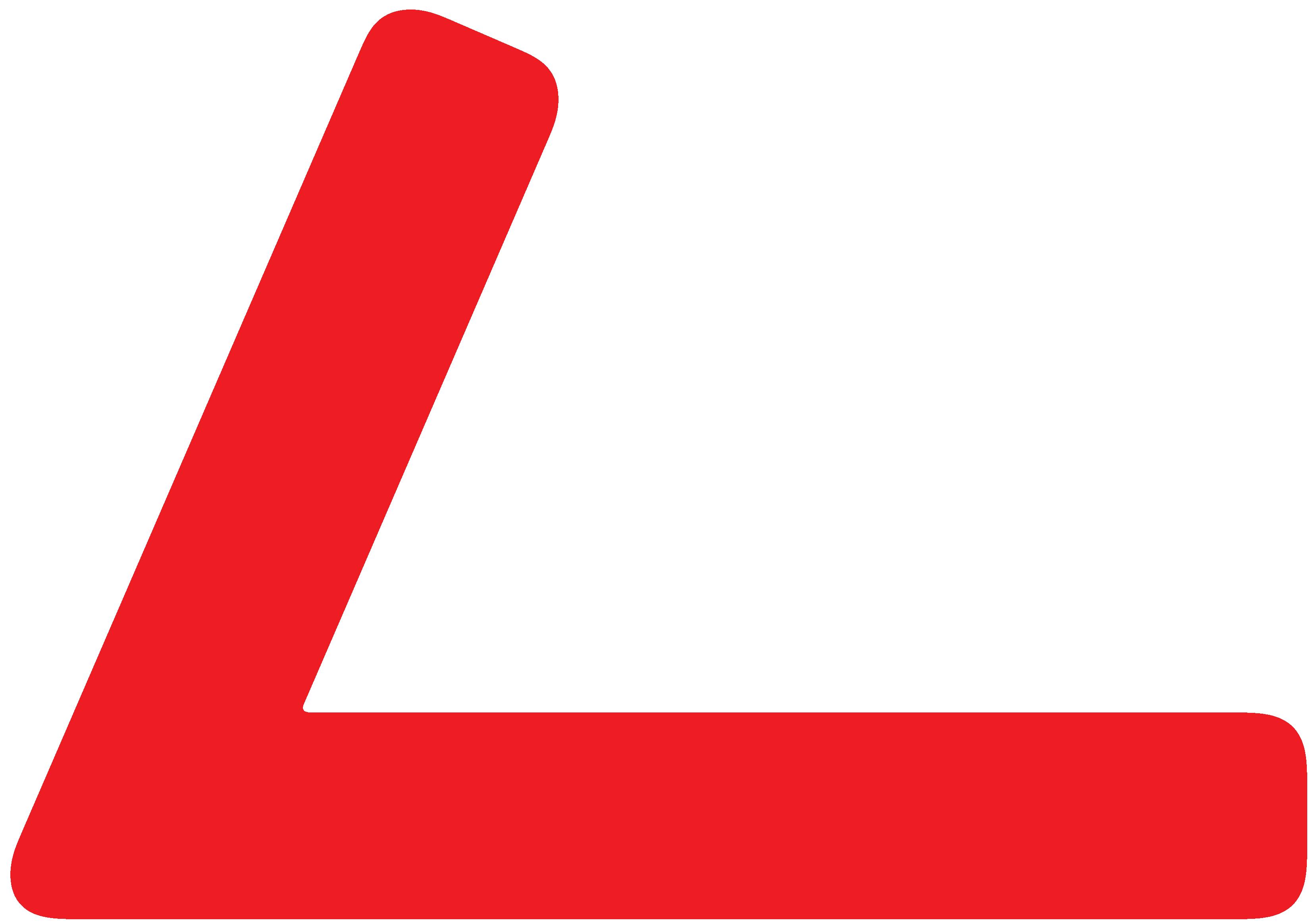
“We are a company that values close cooperation with well-established companies,” said PNO Poland Sales Director, Tomasz Milecki.
“We are pleased that Wielton has become our business partner, because we are committed to providing our customers only with proven products of the highest quality. Together with the Wielton manufacturer, we are guided by the same values. I believe that this is a promising start to a longer cooperation.”
In mid-April this year, representatives of the PNO Group and PNO Poland: Thomas Rimington, Chief Operating
EUROPE
Officer of PNO Group; Peter Hvidt Molin, Group Country Support; and Tomasz Milecki, Sales Director of PNO Poland had the opportunity to visit the production plants and the Quality Control Department located in Wieluń. This gave them an insight into the processes that are an integral part of production (e.g. anti-corrosion protection of the chassis by cataphoresis), and most
out the transaction.
“At Wielton, we are consistently pursuing a strategy based, among other things, on organic growth,” said Wielton Export Director, Jacek Stokowski.
“Our cooperation with PNO, which is one of the key European semi-trailer rental companies, gives us the prospect of entering the Scandinavian market and acquiring new customers.

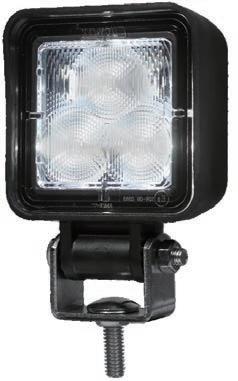

are successfully increasing our market share in European countries and expanding our presence in foreign markets year by year.”
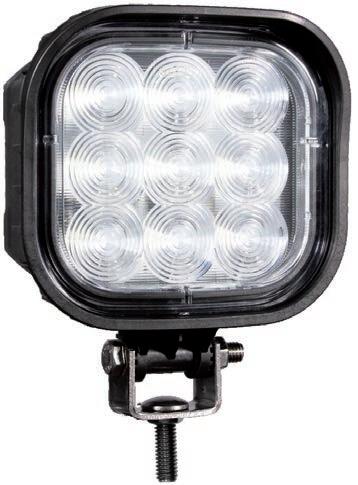
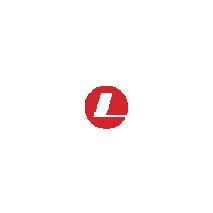
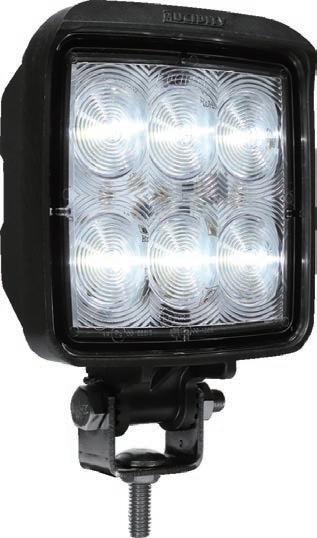
ROMANIA
The first all-electric Schmitz Cargobull S.KOe COOL semi-trailer was recently delivered to a fleet in Romania. Together with other representatives
NEWS INTERNATIONAL
EUROPE & MIDDLE EAST & NORTH AMERICA
Păun, General Manager at the transport company Blue River. During the event at the Schmitz Cargobull site in Ciorogarla, the advantages of the all-electric semitrailer were presented in detail and its functionality was demonstrated in practice.
“Blue River and Schmitz Cargobull have been business partners for many years and we are pleased to be able to provide Blue River with an efficient and sustainable vehicle for temperaturecontrolled transport in the form of the S.KOe all-electric refrigerated box trailer,” said Schacht.
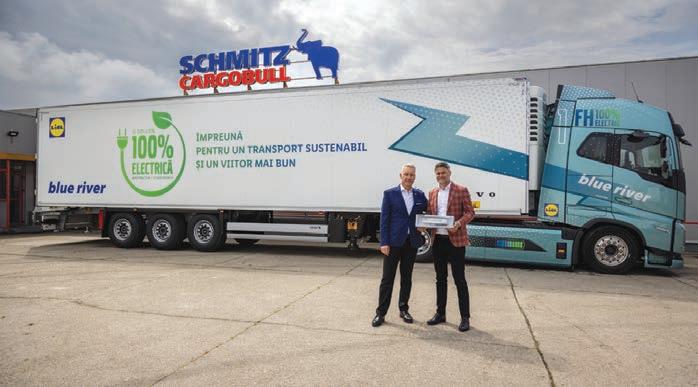
Păun said: “For Blue River, the past year was a year of repositioning and bold decisions. We want to continue to drive forward the electrification of freight transport in Romania and thus act as a benchmark for the entire transport industry. The all-electric refrigerated box is part of this long-term sustainability strategy and we are pleased that Blue River is the first Romanian transporter to add this vehicle to its fleet.”
Schmitz Cargobull has been investing in research and development for sustainable and energy-efficient transport solutions for many years, making it one of the pioneers in innovation in the trailer industry.
“Our new all-electric S.KOe COOL semi-trailer is a clear demonstration of our commitment to sustainability and cutting-edge technology,” said Badea.
The all-electric S.KOe COOL semi-trailer is equipped with an all-electric cooling unit with integrated power electronics, a highvoltage battery and an axle generator, making it emission-free.
The electrified vehicle is also extremely quiet and thus enables delivery in urban areas in the early morning hours as well
as in the late evening. The electrically powered S.CU ep85 cooling unit is designed for emission-free cooling and heating of the load and offers a cooling capacity of up to 15,800 watts and a heating capacity of 10,500 watts. Batteries on the support winch replace the diesel tank and also offer the option of installing an additional pallet box with space for 36 pallets. The electrified Schmitz Cargobull trailer axle recuperates energy during braking, among other things, and thus extends the operating time of the refrigeration machine or reduces the recharging times of the battery via the power grid.
DUBAI
Emirati logistics and transportation company, Aramex, announced it has signed a joint venture agreement with the aim of enhancing the supply chain connectivity along key international trade routes.
Joining forces with AD Ports Group, the exclusive developer and regulator of ports and related infrastructure in Abu Dhabi, the venture will develop and operate a new non-vessel operating common carrier enterprise, in the hopes
of developing shipping connectivity across Middle Eastern, Indian and East and West African markets.
Aramex, who has a 49 per cent stake, will provide tailored solutions to freightforwarding industry players, servicing their ocean-bound container cargo. Its target is 10,000 containers in the shortterm with plans to increase the number of containers in the long term.
CANADA
Following 55 years of experience, strategic acquisitions, and a new website, Manac has strengthened its brand. The OEM in recent years has built a service centre in Moncton, Canada, developed new products and improved its service standards.
This new brand positioning is reported to focus on the human factor, cooperation and partnership as a growth driver with the new slogan ‘Together we go further’. This slogan, the OEM explained, symbolises Manac’s vision to be recognised as the industry’s preferred partner in North America and the company’s commitment to working closely with clients to cater to their everevolving needs.
NORTH AMERICA
“We literally go further thanks to the sturdiness, efficiency and durability of our trailers,” said Manac Vice President Sales and Marketing, Tom Ramsden.
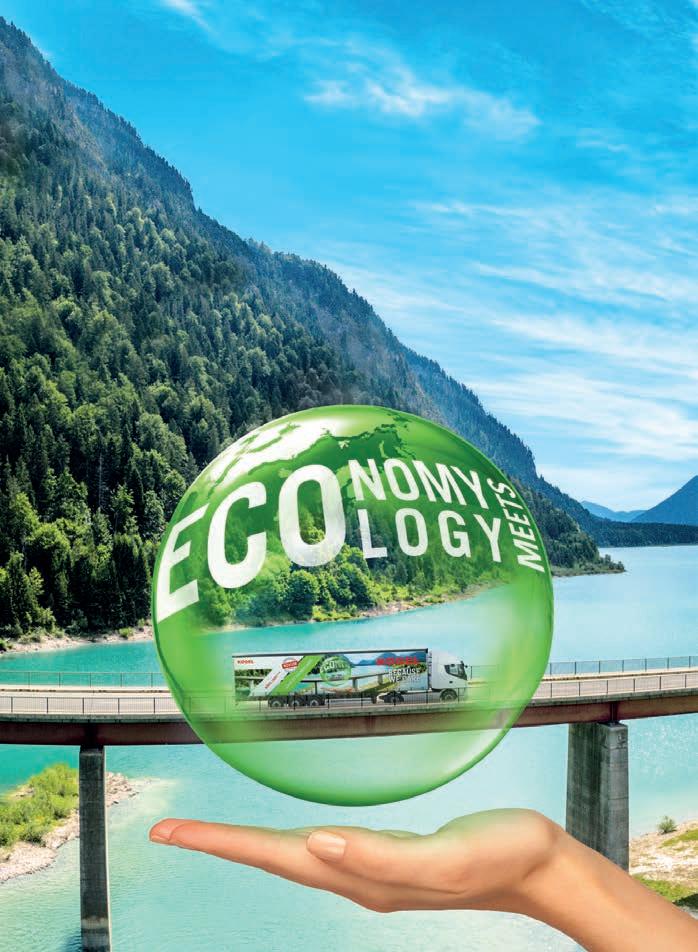
“Concept-wise, we go further in terms of business, as we work together with our team members, clients and suppliers to generate synergies.”
To strengthen the reputation and equity of its numerous brands, Manac also created a consistent, scalable brand architecture that will help to onboard new brands in the context of potential future acquisitions. This architecture comprises a parent brand (Manac), sister brands (ABS and Peerless), as well as two types of sub-brands: the acquired child brands (Alutrec, Liddell, Cobra, and CPS) and the native brands (WING product line such as Darkwing).
This brand repositioning, Manac said, comes with a visual identity that puts the iconic flying moose at the forefront, focusing on the wings that carry us further. In addition, Manac has updated its image with a new, totally revamped website that is better suited for today’s market needs, where clients require increased transparency and concise, quickly accessible information. Clients can expect an improved user experience, thanks, in part, to increased ease of navigation, detailed product sheets, and a dedicated section for services such as repairs and liftgate installation.
US
National Association of Trailer Manufacturers (NATM) has appointed Alex Stowe as Executive Director. He has been acting as interim Executive Director since early November 2022.
Stowe joined NATM in 2021 as Technical Director. He has headed the compliance, technical and technology committees since that time. In these roles, Stowe has worked to further the Association’s mission to continuously advance trailer safety as well as the success of the trailer manufacturing industry.
“We are thrilled to have Alex leading the Association,” said NATM President, Marco Garcia.
“Our time working together in his past roles as Technical Director and Interim Director has proven to me that he is a highly valuable asset to our team and will work tirelessly on the Association’s mission to promote trailer safety for the industry.
“I look forward to continuing to advance NATM’s mission
NEWS INTERNATIONAL
NORTH AMERICA
of promoting trailer safety and overall success of the trailer manufacturing industry,” said Stowe. “Our Association is in an incredible position to continue to help our membership, and I am honoured to be able to serve as Executive Director.”
Stowe received his Juris Doctorate with a concentration in business transactions from the University of Nebraska College of Law. Prior to joining NATM as the Technical Director in the fall of 2021, Stowe was a Compliance Specialist Advisor overseeing HIPAA and privacy matters for an insurance company. He also spent time working in the college athletics realm for Creighton, Purdue, Ohio State, and his alma mater Nebraska. NATM has been dedicated to improving trailer safety and performance for more than 30 years. The Association represents manufacturers that produce light- and medium-duty trailers, supplier and service providers, trailer dealers and tow vehicle OEMs to the industry.
NATM seeks to promote safety awareness and provide a voice for trailer manufacturers and their suppliers when issues of trailer safety and regulation are considered by Congress and relevant government agencies.
Founded in 1987, the Association has grown to represent more than 1,000 companies belonging to the trailer industry.
NATM is dedicated to improving trailer safety. One way this is accomplished is through the mandatory Compliance Verification Program, requiring all trailer manufacturers to verify they have the manufacturing processes in place to build trailers that meet Federal Motor Vehicle Safety Standards (FMVSS) and industry best practices.
US
The Biden administration has announced it has ramped up its national logistics program in an effort to speed up delivery times and reduce consumer costs.
The Freight Logistics Optimization Works (FLOW) program now has 53 companies on board including FedEx Corp, United Parcel Service Inc and Maersk.
The US Transportation Department spent $1.5 million to create the program and is now asking for $5.3 million in the budget to continue the momentum.
The FLOW program was created to address supply chain issues by getting ports, truckers, shippers, retailers, wholesalers and other businesses to share information. These key stakeholders are working together with the Administration to develop a proofof-concept information exchange to ease supply chain congestion.
US Transportation Secretary, Pete Buttigieg, said the department will continue refining the program, seeking feedback from companies to make it more useful.
US
North American transport and logistics company, Hub Group, has reported its latest financial results.
The company reported net income of $62 million USD for Q1 2023 (Q1 2022: $88 million USD)
“Although we are in a softer demand environment the $1.2 billion of revenue we generated in the quarter is the second highest first quarter revenue in the history of our company,” said Hub Group President and CEO, Phil Yeager. “Our yield management, cost containment and operating efficiency initiatives resulted in operating income
margin of 6.8 per cent of revenue. “We continue to execute on our long-term strategy, investing in our core business and technology while diversifying our service offering. We remain focused on managing our costs and capital structure, while supporting our customers with great service and investing for growth to drive success in a variety of market conditions.”
First quarter 2023 results: Consolidated revenue for the first quarter of 2023 decreased to $1.2 billion USD as compared to $1.3 billion USD in first quarter 2022. Purchased transportation and warehousing costs declined as compared to prior year due to lower volumes, reductions in third-party carrier costs per load, and decreased use of third-party carriers for drayage, partially offset by higher equipment and rail costs. Salaries and benefits costs increased $9 million USD relative to prior year due to $28 million USD of incremental expense related to growth of our driver and warehouse employee headcount, partially offset by a $19 million USD reduction in office employee compensation due to lower headcount and lower incentive compensation expense.
General and administrative expense increased as compared to prior year due to higher rent expense and higher outside services expense primarily for IT software related to the acquisition of TAGG Logistics. Depreciation and amortisation expense increased as compared to prior year due to investments in our container and tractor fleets, as well as amortisation of intangible assets related to the acquisition of TAGG. Operating income for the quarter was $78 million USD (6.8 per cent of revenue) as compared to $115
NORTH AMERICA
million USD (8.9 per cent of revenue) in the prior year. EBITDA (non-GAAP) for the quarter was $124 million USD. The first quarter 2023 effective tax rate of 19.4 per cent benefitted primarily from a change in state apportionment methodology.
First quarter ITS Segment revenue was $709 million USD, as compared to $777 million USD in the prior year. Intermodal revenue per load for the quarter increased 3.0 per cent while volume decreased 12 per cent as compared to prior year.
Volume for the quarter was impacted by softer demand conditions as retailers’ inventory levels increased from the lows seen in 2021, which impacted demand for our services. Revenue for our Dedicated business line grew 5.0 per cent in the quarter. ITS operating income decreased to $49 million USD (7.0 per cent of revenue) as compared to $86 million USD (11.0 per cent of revenue) in the prior year due to lower volume, higher equipment costs and lower surcharges. These headwinds were partially offset by lower drayage costs as we increased the portion of drayage handled on our own fleet to 74 per cent in first quarter 2023 as compared to 58 per cent in the prior year, as well as an improvement in profitability at our Dedicated service line.
First quarter Logistics Segment revenue was $469 million USD, as compared to $541 million USD in the prior year. The decline in revenue was driven by lower revenue per load in our brokerage business line and lower managed transportation business line revenue, partially offset by revenue from TAGG.
First quarter operating income was 6.1 per cent of revenue as compared to 5.4
per cent last year. Operating income was unchanged at $29 million, as lower revenue was offset by lower purchased transportation costs and our yield management initiatives.
Capital expenditures for the first quarter of 2023 totalled $27 million USD. As of March 31, 2023, Hub Group had cash and cash equivalents of $343 million USD.
US
Retail corporation, Walmart, is committed to rapid online delivery and pickup. It has opened its first Market Fulfillment Center (MFC) in Arkansas in a bid to expand the use of its stores. Fulfilment through digitisation and connecting the store to supply chain assets end-to-end will, according to Walmart, will transform operations. The MFC utilises a proprietary storage and retrieval system which, according to Store Manager, Ryan Simpson, will enhance the customer experience with more accurate online fulfilment and also provide a runway to continue growing the business.
In related news, Walmart released its Q1 financial results.
Total revenue for the corporation was up 7.6 per cent at $152.3 billion USD, with operating income growing faster at 17.3 per cent at $0.9 billion USD. Walmart US E-commerce growth was 27 per cent which was led by pickup and delivery.
“We had a strong quarter,” said Walmart President and CEO, Doug McMillon. “We leveraged expenses, expanded operating margin, and grew profit ahead of sales. And a big thank you to our associates, who continue to step up and deliver for customers and members whenever and however they want to be served.”
US
Dorsey Trailer has exceeded its 2023 production goals following investments from its new owners.
In 2022, Dorsey set a production goal to produce 2,650 trailers but met demand by producing a total of 3,025 trailers (+14 per cent).
“We are very pleased with our production results,” said Trey Gary, CEO of the Elba, Alabama-based company. “We have been able to meet the increased demand for our durable trailers by expanding our production capacity, offering team incentives, and partnering with our employees for a more efficient workplace. We are confident that we will continue to meet the needs of our customers in the coming quarters.”
According to a TechSci report, the global semi-trailer market is projected to reach $37.05 Billion USD in 2023, growing at a CAGR of over 4.0 per cent during 2018-2023.
Dorsey Trailer is poised to meet that demand, offering a wide variety of truck trailers including steel and composite flatbeds, drop decks, extendable flatbeds and drop decks, open top or closed chip vans, and specialty trailers including beavertail and ramps, multi-axle, and oilfield trailers.
Dorsey Trailer’s success is due in part to its focus on customisation. Texas-based Superior Trailer Sales has worked with Dorsey Trailer for the past 12 years. “You are getting Tier 1 quality products at Tier 2 pricing when you buy from Dorsey,” said Superior Trailer Sales President, Benton Reynolds. “This is a company that is easy to work with and they are willing to customise.”
The company also places a priority on workplace incentives and
NEWS INTERNATIONAL
NORTH AMERICA & SOUTH AMERICA
employee compensation.
“Our employees have bought in on the idea of reaching production goals because they are seeing the benefits in each and every paycheck,” said Dorsey Trailer Assistant Vice President, Joseph Scott.
“Production bonuses and attendance bonuses were huge reasons for the increase in production for 2022.”
Scott added that Dorsey’s owners, Propst Companies, made an investment in new equipment.
He said Propst invested millions of dollars to ensure the workforce had the best equipment available. Improvements to the workplace environment have been cheered by employees. These incentives have paid off with increased morale and production.
Propst Companies purchased a majority ownership stake of Dorsey from Pitts Enterprises in 2019 and acquired the remaining ownership in April 2023. Since purchasing Dorsey Trailer, Propst, a diversified investment company with interests in real estate and a variety of other operating companies, has offered tremendous incentives to the Dorsey employees.
The Dorsey name has been engrained in the trailer manufacturing world since the early 1900s when Pete and Henry Dorsey opened a small machine shop to repair the power saws, boilers, and trucks of the booming timber business. By 1920, the little company was producing 25 to 30 logging units per day. The Dorsey company’s first commercial freight trailer was developed by 1930. By the end of the decade, truckers coast-tocoast were familiar with the Dorsey trade name.
“It’s quite the accomplishment to be
recognised as the fastest growing platform trailer manufacturer in the country, and truly, Dorsey is a treasure for Elba and an industry-driver for the rest of the state,” said Alabama Governor, Kay Ivey.
Dorsey is also a supporter of National Trailer Dealers Association (NTDA) programs and services. Gary served on the organisation’s Board of Directors from 2017–2020.
“The NTDA appreciates the connections created by industry partners like Dorsey Trailer that help to not only create longlasting, mutually beneficial relationships, but that also help to elevate industry standards through their professionalism,” said NTDA President, Gwendolyn Brown.
US
Transport and logistics company, TFI International, is acquiring two LessThan Truckload (LTL) operations. It has completed the acquisition of Hot Line Freight Systems and has agreed to acquire Siemens Transportation Group (STG).
Founded in 1988, Hot Line is a specialised LTL provider based in Wisconsin. The company’s nearly 200 employees operate a network of 14 terminals (eight of which are owned), generating approximately $30 million USD (approx. €27.6 million) in annual revenues. With a strong focus on expedited one- to twoday LTL service across the Midwest as well as a nationwide over-theroad division concentrating on high-value and white glove freight, Hot Line is renowned for its exceptional customer service.
Hot Line’s Paul Burgmeier will continue to manage the business
as part of TFI’s Less-Than-Truckload segment, reporting to Executive VicePresident Rick Hashie.
Founded in 1962, the majority of STG’s operations are LTL, with a smaller portion of its business in truckload and flatbed. Based in Saskatoon, Saskatchewan, STG is a family-owned business providing a total supply chain solution spanning North America through its 15 terminals, including 11 in Canada and 4 in the US, generating annual revenues of approximately $150 million CAD (approx. €101.9 million).
STG’s Doug Siemens will continue to manage the business as part of TFI’s LessThan-Truckload segment, reporting to Executive Vice-President Chris Traikos. The transaction is subject to regulatory approval.
“We are pleased to be expanding our LTL footprint in both Canada and the US with these two LTL acquisitions,” said TFI International Chairman, President and CEO, Alain Bédard.
“STG’s impressive family-run approach has attracted a loyal customer base across diverse industries, and its compelling geographic presence and wellmaintained equipment strategically complement our growing network. Hot Line is another highly attractive acquisition with well-run operations and a strong presence in the midwestern US that will further bolster our LTL presence while allowing us to ramp its cross-border business. We are thrilled to welcome Doug, Paul and their impressive teams to our growing family of companies and look forward to watching both STG and Hot Line succeed under the TFI International umbrella.”
SOUTH AMERICA & OCEANIA
BRAZIL
The newly re-branded, Randoncorp, has reported a successful first quarter with a consolidated net revenue 7.3 per cent up from the same time last year.
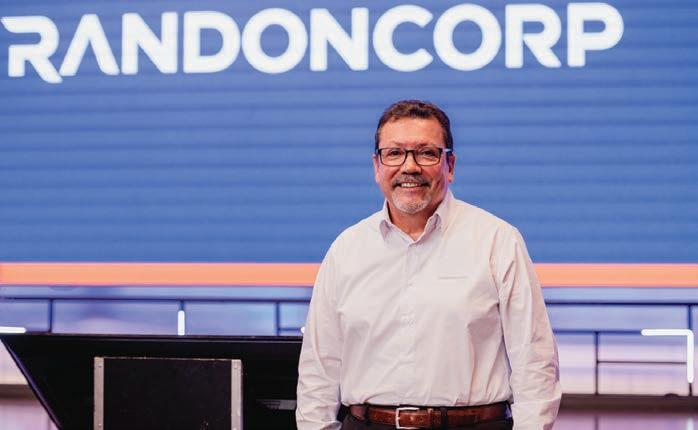
The trailer and equipment manufacturer closed 2023’s first quarter with 2.7 billion BRL in consolidated net revenue, which it attributed to the company’s business diversification and its internationalisation strategy.
Consolidated EBITDA advanced 10.2 per cent when compared to 2022 first three months, reaching 442.2 million BRL.
Among the main factors that boosted these figures, the company said, was the increase in revenue from the foreign market, totalling $111 million USD, an increase of 11.1 per cent when compared to 2022’s first quarter.
“With growing revenues in hard currencies and in the aftermarket, investments in productivity and capturing synergies between our companies, we achieved a quarter with good results and margin expansion, even in a scenario of political and economic uncertainties,” said Randoncorp CEO,
Sérgio L. Carvalho.
In April, the company released its guidance for 2023, projecting consolidated net revenue between 10.5 billion BRL and 12 billion BRL, with an estimated revenue in the foreign market between 520 million USD and 570 million USD.
The company’s accelerated growth is also marked by its new corporate branding aimed to internationalise the company’s presence and provoke a visionary attitude grounded on investment in innovation.
Earlier this year, Randon Companies, announced a name change in what it called a strategic step towards its consolidation as a multinational company.
The new name – Randoncorp – is a tribute to the company’s legacy as it directs investments, strategies and innovation efforts towards a path of sustainable growth, the company announced.
“It is essential to build an identity that reflects this moment and the path we want to take from now on,” said Carvalho.
“The more we evolve, the more we commit ourselves to the environment, society and ethical and responsible governance.”
In addition to six plants located in Brazil, the company maintains a plant in Argentina and works with partners for the assembly of semi-trailers in several strategic global points in Central America and Africa.
BRAZIL
The 23rd Libreparts store has opened in Serra Gaúcha. This new store was inaugurated in the city of Caxias do Sul and is expected to support fleets as well as bolster the local economy.
Libreparts stores, according to Librelato, offer a wide variety of parts for trailers, including suspension, lighting and brake items, all with Librelato warranty. In addition to physical stores throughout Brazil, the brand has a virtual store for quick service, enhancing the user experience of Librelato products. Every detail of the Libreparts network is designed to optimise heavy vehicle uptime.
“By facilitating and streamlining the parts sales process, we increase business productivity and reduce vehicle downtime in case of maintenance,” Librelato said in a statement.
AUSTRALIA
Refrigerated truck rental business, Eurocold, is launching a Western Sydney expansion operation this month with plans to rapidly impact the New South Wales market.
The centrepoint of the operation is a 3,500 square metre site which will allow Eurocold to efficiently provide service to
NEWS INTERNATIONAL
the Sydney market with easy access to the Blue Mountains, Central Coast and Hunter Valley/Newcastle.
Eurocold Managing Director, Avraam Solomon, is planning to have 100 trucks on the road from the new facility by December this year and 150 by 30 June 2024.
Trucks will be available to rent or purchase from the opening day, with immediate delivery available.
Noting the changing face of the refrigerated truck market, Eurocold will apply its processes in providing rented trucks on a long-term basis.
The long-term rented trucks will be assembled in Brisbane and will be delivered as brand new machines. Short-term rentals, also available from day one, will offer customers unlimited kilometres.
Eurocold revealed the Sydney facility will
also perform on-site bodywork repairs on all manufacturers of refrigerated truck bodies including fibreglass, welding, hinges and seal repairs.
The new facility will help Eurocold establish a large footprint in Sydney, and will open the opportunity for further growth over the coming years, according to Solomon.
“We have intentions of growing quickly,” he said.
“We can do that by having trucks in the Sydney facility available for purchase and hire from day one.”
According to Solomon, Eurocold has also recruited local experts with deep industry experience, supported by the company’s national team.
“The team there are vastly experienced in their roles; they are local – so we’re committed to supporting Western Sydney – on top of that, the Sydney team
has the full support of our national team,” he said.
Solomon will be overseeing much of the operation first hand through personally being on-site during the launch phase. In March, Eurocold launched Revora – a sister brand that will assemble electric refrigerated trucks in Australia to “take customers on a journey towards zero emissions”.
Eurocold’s Sydney operation will take delivery of the Revora trucks as well as service that growing area of transport operations.
“The industry-leading processes that we’ve put in place over our years of operation allows us to hit the ground running and scale quickly, then with Revora coming online with the electric refrigerated trucks – we really have a broad offering for Sydney and New South Wales,” Solomon said.
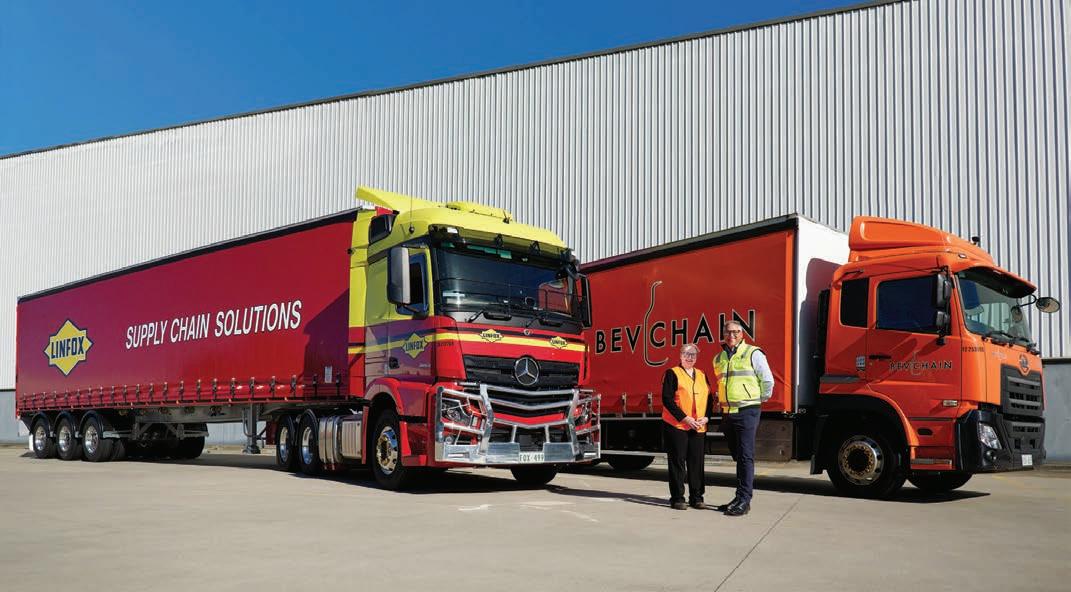
OCEANIA
“We cannot wait to see the Eurocold brand being more prevalent in the Sydney market and helping operators move towards zero emissions with Revora.”
AUSTRALIA
Linfox has joined Transport Women Australia Limited (TWAL) as a Gold Partner to support its commitment to provide an inclusive, safe and diverse workplace.
Linfox will partner with TWAL to provide mentoring, host networking events and contribute to Government relations and advocacy activities.
Linfox Australia and New Zealand CEO, Mark Mazurek, said the company is serious about improving its female participation rate through increased opportunities and training.
“We are proud of the progress we have made, but recognise that we still have a long way to go before we achieve the diverse and inclusive workplace we aspire to,” he said.
“We continue to roll out unconscious bias and diversity and inclusion modules in our leadership training programs.
“We have also established reference groups and mentoring programs dedicated to influencing positive change.”
TWAL Chair, Jacquelene Brotherton, said TWAL was delighted for Linfox to join as a Gold Partner.
“We welcome the opportunity to strengthen the bond between our organisations and the benefits it will bring to both,” she said.
“Linfox has long supported increasing female participation in the transport industry.
“We look forward to the opportunity
to strengthen our leadership support and the additional benefits this partnership will bring to our advocacy for industry diversity and inclusion.”
NEW ZEALAND
TMC Trailers has been building trailers since 1948.
“We are incredibly proud to have reached this milestone and grateful for all of our loyal customers who have supported us along the way,” TMC Trailers said in a statement.
“We have come a long way since our humble beginnings, but our commitment to quality and customer satisfaction remains the same. Our team of skilled professionals work tirelessly to design, manufacture and deliver the best trailers in the business.
“We would like to take this opportunity to thank all of our staff, customers, and partners for their support over the years. We look forward to continuing to provide innovative and reliable trailers for many more years to come.”
TMC Trailers manufactures heavy transport equipment for operators in New Zealand and Australia. It specialises in curtainsiders, flat decks, skels, transporters, tippers and other custom designs.
The head office and manufacturing facility is based in Hornby, Christchurch. All production processes including computer assisted design, fabrication, abrasive blasting, painting and assembly are also performed in-house.
NEW ZEALAND
DHL Supply Chain has opened a new transport hub in Hamilton, New Zealand. This hub will further bolster final-mile delivery capabilities in under serviced areas outside of Auckland.
Fitted with state-of-the-art technology and equipment, the new facility will serve as a key logistics hub nationwide to better meet the needs and expectations of regional customers.
DHL Supply Chain New Zealand Managing Director, Matt Casbolt, was excited to announce the opening of the new transport hub in Hamilton.
“This is the latest addition to our twoyear transport network development strategy, following on from the establishment of our Whangarei, Tauranga, and Hawkes Bay transport hubs,” he said.
“With the addition of our new Hamilton hub and existing network, we are proud to now provide last mile and line haul services to customers in regions and key markets that represent over 50 per cent of the country’s GDP.
“Our goal is to continue delivering an exceptional transport service to our customers, enabled by great people, a strong network presence, and partnering with the best transport service providers.”
The new hub will service customers across all sectors that require a high service standard in deliveries, including consumer goods, life sciences, healthcare, engineering and IT sectors. DHL’s investment in regional areas is aiming to enhance the resilience of supply chains in New Zealand. As part of this investment, DHL plans to open further hubs later this year and into 2024.
CHANGER GAME
CIMC VEHICLES PROVES TO BE A POWERFUL WORLD LEADER IN THE INTERNATIONAL TRAILER MANUFACTURING SCENE WITH ITS COMMITMENT TO STATE-OF-THE-ART TECHNOLOGY, DRIVEN IN PART BY AN ENTREPRENEURIAL SPIRIT THAT IS CAPITALISING ON NEW OPPORTUNITIES, PARTICULARLY IN ELECTRIFICATION AND THE FINAL MILE.
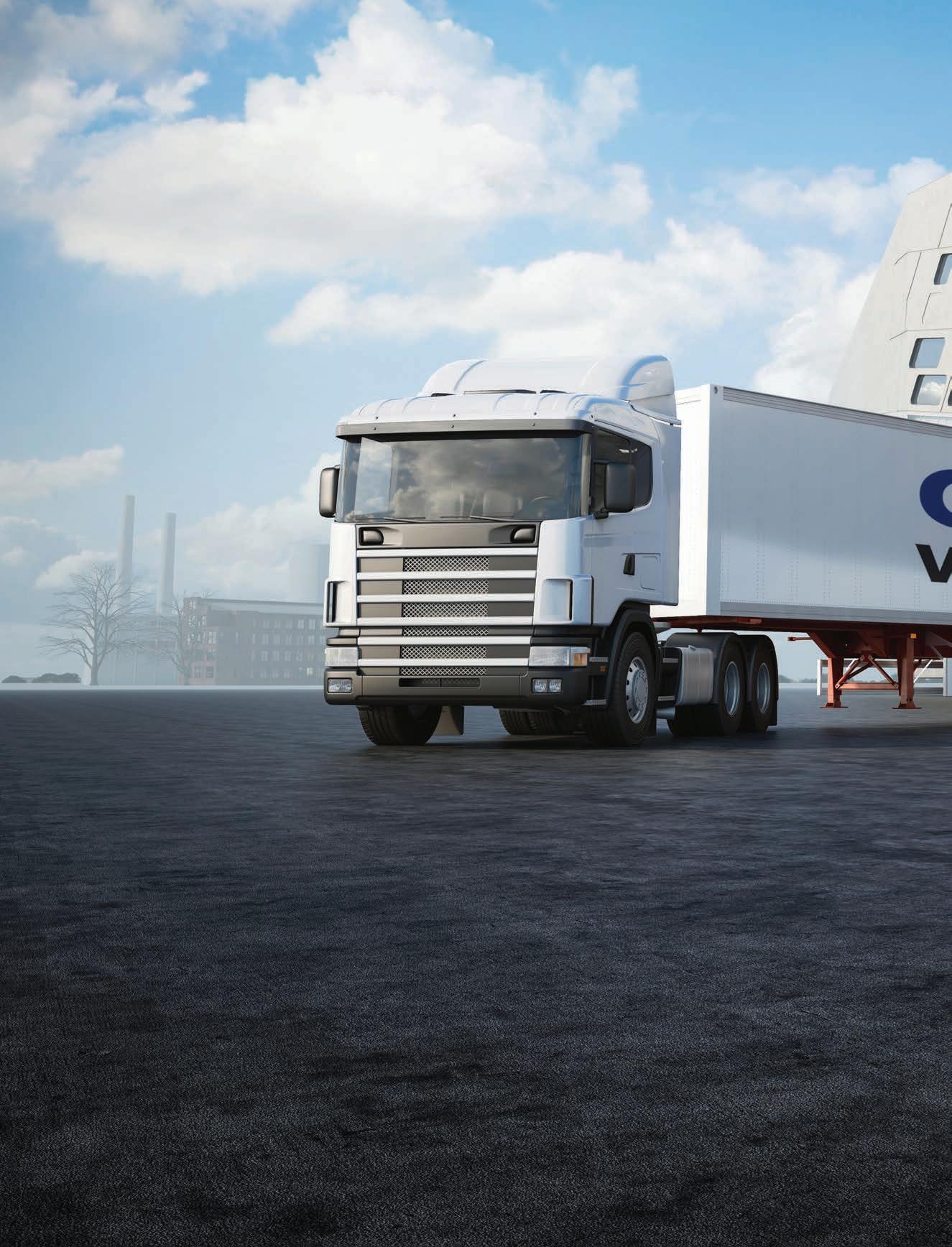
The Chinese economy is transitioning from high-speed growth to high-quality development. CIMC Vehicles, as a result, is seizing this opportunity to launch a third venture. By adopting a new development philosophy, it continues to build its Light Tower manufacturing network and drive intensive growth through innovation and expanding its business scope. The OEM is also accelerating its exploration of new energy sources and removing barriers in the supply chain to achieve high-quality development.
David Li, CIMC Vehicles CEO and President, said that starting the third venture, in a sense, is a structure driven by dual wheels.
“On the one hand, it focuses on our existing businesses, firmly adhering to the theme of ‘structural reform of production organisations’,” he said. “We aim to make them stronger, better, more efficient and more globally extended. On the other hand, it explores prospects in the field of new energy.”
Specifically, CIMC Vehicles’ strategic initiatives are as follows:
First is the ‘Star-chained Manufacturing Network’. Simply put, it is an upgraded version of the
Light Tower plants, which connects all Light Tower production lines or Light Tower plants digitally. This constitutes the ‘Star-chained Manufacturing Network’, supporting the business philosophy of ‘Intercontinental Operation, Local Manufacturing’. The OEM is expediting the structural reform of its semi-trailer production organisation, focusing on building business groups, and striving to achieve the vision of high-quality industry integration, innovative distribution models and continuous improvements in market share and value.
Second, regarding the launch of the ‘North America Compass’ plan, the OEM aims to reshape the production organisation of North American
chassis trailers and refrigerated semi-trailers, promote sales of intermodal transportation product portfolios and actively establish a new development pattern of sharing sales networks and channels in North America. This should result in steady market share growth and enable new growth opportunities in the European market.
Third, CIMC Vehicles is accelerating the growth of its Champion Tanker Business Group. Seizing the recovery opportunity in the heavy-duty truck market, the OEM has improved its order delivery. By enhancing the division of labour and collaboration among its LTP production centres, the business can improve production efficiency and establish additional business growth.
Fourth, the OEM is promoting the ‘Light Tower Manufacturing Network’ to support the plan to start a business for the third time. CIMC Vehicles has already built and invested in 24 Light Tower production lines
worldwide, covering a full range of semi-trailers, various types of tankers, and truck bodies for specialty vehicles. Yet, the utilisation rate of these product lines has not been fully maximised according to Li. It limited their capabilities to support overseas and cross-regional operations flexibly. Since 2022, CIMC Vehicles has been preparing an upgraded version of the Light Tower plants, namely the ‘Light Tower Manufacturing Network’. In 2023, leveraging a national unified market, CIMC Vehicle will network and digitalise the Light Tower production lines of Champion Tanker Business Group, TB Business Group and the business group of semitrailer in China.
Fifth, CIMC Vehicles is constructing a new management infrastructure for digitalisation to support the plan to start a business for the third time. The OEM will further optimise the ‘Accounting 2022’ process, focusing on improving the quality of overseas enterprise reports. It will iterate the ‘Money 2021’ process to build the CIMC Vehicles Group’s treasury system and explore the launch of an electronic settlement platform for related transactions. Also, the OEM will initiate the digital upgrade of the ‘Budget 2020’ process to establish a digital ‘data middle platform’. Moreover, CIMC Vehicles has iterated the ‘Performance 2020’ process to optimise the KPI management system further.
Sixth, the OEM is advancing ‘Organisational Development 2023’. By promoting the iteration and upgrade of its executive team, CIMC Vehicles aims to build an operational Leadership Triangle for intercontinental operation to start a business for the third time. This, in turn, will

gradually upgrade the governance structure of the listed company and implement long-term incentive mechanisms.
“Regarding new energy, as the commercial vehicle industry accelerates its transition towards new energy and intelligence trends, CIMC Vehicles, in line with the trend of electrification and intelligence in the automotive industry, expedites innovation and exploration in the field of new energy,” said Li. “We focus on the R&D of new energy products, enhancing our leading advantages in lightweight, intelligence and adaptability. We define a new integrated product for integrated tractor-trailers and promote the standardisation and serialisation of various technological modules. Through strong cooperation with prime mover manufacturers, we accelerate the market penetration of new energy products.”
CIMC Vehicles will actively respond to market trends and will show great courage to tackle any challenge head-on, make the best efforts and demonstrate the entrepreneurial spirit of the third venture.
“On the premise of stabilising the basic market of ‘Intercontinental Operation’, the company will concentrate resources to strengthen the various businesses of the ‘national unified commercial vehicle and specialty vehicle market’ and wait for opportunities to enter the field of new energy commercial vehicles with innovative technology and business models, thereby contributing to the improvement of the efficiency of the road transportation industry,” said Li. “In advanced developed economies, CIMC Vehicles helps to achieve high quality and sustainable development, create value for shareholders and provide employees with good employment opportunities and a better life.”
In terms of new trailer designs and manufacturing processes, Li explained that ‘Innovation without limits’ has always been a core value of CIMC Vehicles and the philosophy for the company’s development.
“Over the past 20 years, we have consistently pursued innovation, increasing our investment in global, advanced technologies and introducing and incubating advanced research and development methods and manufacturing technologies,” said Li. “These have enhanced our independent innovation capability and core competitiveness, making us the world’s leader in the sophisticated manufacturing of semi-trailers and specialty vehicles, a pioneer in the highquality development of road transport equipment in China, and an explorer and innovator in new energy specialty vehicles in China.
“In the past year, CIMC Vehicles has achieved significant results in product development, manufacturing technology and essential technological innovation. For example, in product development, we have created over 10 lightweight alloy-steel liquid tank trailers, V-shaped dry bulk tank trailers, new energy mixers, electric intelligent dump trucks, hydrogen-powered refrigerated truck bodies and more. Regarding manufacturing technology innovation, we have conducted research and development in real-time X-ray imaging testing methods (DR testing),
refrigerated truck beam bonding technology and the development of the first domestic 16.5-metre open foam press machine. Regarding basic technological research and development, we have developed the K2 new environmentally friendly foam technology and lightweight polyurethane foam materials.”
Li said the K2 new environmentally friendly foam technology from TB is a prime example of independent innovation.
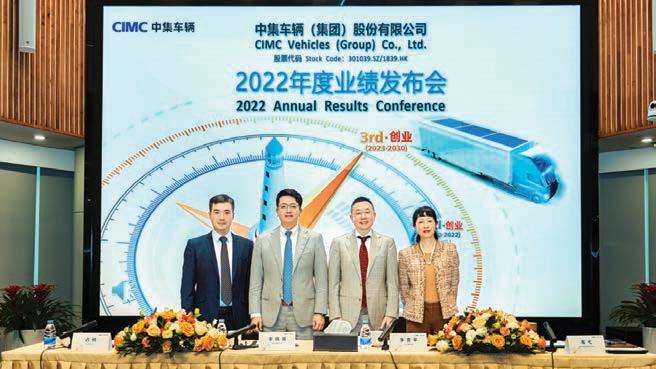
“It combines CIMC Vehicles’ years of experience in refrigerated truck research and manufacturing, benchmarks advanced technologies from Europe and the United States and develops a new generation of K2 dual-mode foam technology,” he said. “The K2 new generation refrigerated compartment products have high strength, lightweight, uniform and dense foam, and are environmentally friendly and safe. They provide clients with a brand-new experience in refrigerated transportation. Our K2 dual-mode foam technology also received the 2022 Third Prize of CIMC Science and Technology Progress Award.”
As of the end of 2022, CIMC Vehicles had more than 1,400 registered patents, and participated in the formulation and revision of 30 national and industry standards for semi-trailers and truck bodies for specialty vehicles in China.
In 2022, CIMC Vehicles as a group sold 151,870 units of various vehicle types. Li said the company is mainly engaged in the global production and sale of semi-trailers, truck bodies and specialty vehicles and van bodies.
“We are also the world leader in the sophisticated manufacturing of semi-trailers and specialty vehicles, a pioneer in the high-quality development of road transport equipment in China, and an explorer and innovator in new energy specialty vehicles in China,” he said. “The company has held the top position as the world’s leading semi-trailer manufacturer for 10 consecutive years. In 2022, the company occupied a market share of 14.45 per cent in China’s semitrailer market, maintaining the first position for four consecutive years. The company currently has six major businesses or groups, namely ‘Light Tower Pioneer Business’, ‘North American Business’ and ‘European Business’ engaged in the global semi-trailer market, ‘Champion Tanker Business Group’ with a focus on sophisticated manufacturing of truck bodies for specialty vehicles and van truck bodies, ‘TB Business Group – Dump Truck Business’ and ‘TB Business Group – Urban Distribution Van Truck Bodies Business’, covering four major markets in the
world, more than 40 countries and regions, and had 24 Light Tower Plants at home and abroad.”
In 2022, CIMC Vehicles produced a total of 159,699 units/sets and sold a total of 151,870 units/sets. The business had to expand its capacity to produce a total of 297,750 units/sets in 2022.
On 28 March 2023, CIMC Vehicles held its 2022 Annual Results Presentation at its headquarters in Shenzhen, attracting investment institutions and authoritative media. The development of CIMC Vehicles has received great attention.
In 2022, CIMC Vehicles successfully moved forward amid the headwinds, with overseas businesses making significant progress and domestic business maintaining a solid foundation, outperforming the overall market.
Financial highlight: In 2022, CIMC Vehicles recorded a revenue of 23,621 million RMB. The net profit attributable to shareholders of the company was 1,118 million RMB, representing a year-on-year significant increase of 24.11 per cent. Total assets and net assets reached 22.217 billion RMB and 13.36 billion RMB, respectively. Total assets amounted to 22,217 million RMB and the net assets reached 13,360 million RMB. CIMC Vehicles sold a total of 151,870 units of various types of vehicles worldwide.
Operational highlights: The company made a breakthrough in operation, with the coordinated development of the six major businesses or groups. CIMC Vehicles’ Light Tower Pioneer Business promoted the structural reform of semi-trailer production organisations and increased the gross profit margin. North American Business made a breakthrough, with an increase in the sales and price of main products, and profit hitting a record high. European Business was successfully transformed, and put into operation several LoM manufacturing plants, thus achieving quality growth in revenue. Champion Tanker Business Group accelerated the integration of products and production capacity and promoted the development of a unified national market of tankers. TB Business Group – Dump Truck Business actively deepened the strategy of joint development with tractor manufacturers, grasped the trend of the new energy transition; TB Business Group – Urban Distribution Van Truck Bodies Business improved its production capacity arrangements, put into operation Jiangmen LTP Production Center and vigorously developed products in new energy.
During the annual results presentation, CIMC Vehicles officially announced that it started a business for the third time to promote high-quality development. In the future, the company will intensify its exploration and innovation in new energy, creating a new performance growth driver. Following a boost in revenue for international business thanks to the Light Tower Manufacturing Network strategy, CIMC Vehicles has a plan to move forward and bank on its success.
“Since 2014, the company has been constructing a ‘Sophisticated Manufacturing System’ and establishing ‘Light Tower’ plants,” said Li. “Currently, we have built 24 Light Tower plants at home and abroad. Compared to traditional plants, these Light Tower plants have revolutionised the industry by replacing conventional processes with laser cutting, robotic welding, electrophoresis and powder coating. This substitution addresses the industry pain points of high pollution and high energy consumption associated with traditional plants. It reduces pollutant emissions and energy consumption during the production process while
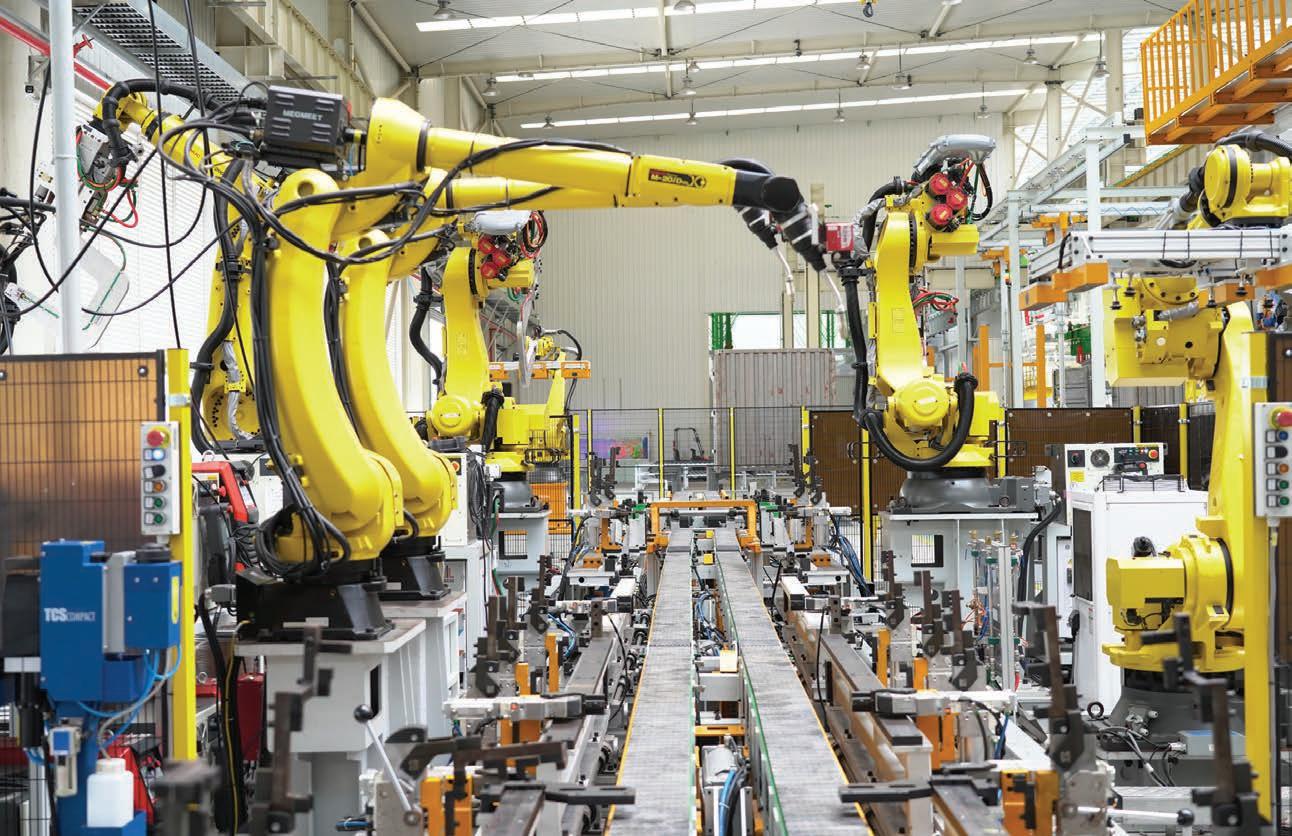
enhancing raw material and capacity utilisation.”
Moving forward, CIMC Vehicles will deepen the construction of the ‘Light Tower Manufacturing Network’; actively made arrangements for the LTP production centre and the LoM manufacturing plant; promoted the digital upgrade of the LTL ‘Light Tower’ logistics, LTS ‘Light Tower’ sourcing centre and LoP local procurement; utilised high-end manufacturing production lines and capacity; achieved mutual complementation of superior resources and efficient synergy; enabled industrial upgrading through digitalisation; reduced the production costs; realised comprehensive production automation, implementing intelligent and digital processes; increased orders and improved the fulfilment; effectively combined the six major businesses or groups in the long run, so as to guarantee high-quality development.
Looking at the North American market, this business segment demonstrated impressive performance throughout 2022 and Q1 2023.
“In 2022, the revenue from North American Business gained a significant increase compared to the previous year,” said Li. “In the first quarter of 2023, North American Business grew with increased revenue and gross profit margin. As the impact of the pandemic in North America gradually diminishes and the shortages of raw materials and labor alleviate, the transportation market will be supported by the growing consumer demand and delivery volume. This will maintain a strong demand for semi-trailer equipment, with the emergence of the trend towards new energy.”
On 24 April 2023, as a core supplier, Vanguard, CIMC Vehicles’s North American subsidiary, provided Sysco with a comprehensive solution for new energy refrigerated semi-trailers. In this project, Vanguard delivered the first batch of multi-temperature refrigerated semi-trailer prototypes to Sysco at its Moreno Valley, California factory. In the future, CIMC Vehicles will actively expand its presence in the North American new energy logistics equipment market and provide more environmentally friendly and efficient logistics solutions through technological innovation.
“Looking ahead, North American Business will solidify its operational performance by implementing organised changes and adjustments in the production organisation,” said Li. “We will establish efficient collaborative mechanisms and processes, leveraging core
resources in the LTL ‘Light Tower’ distribution network and LoM manufacturing plants. We will optimise the LoM manufacturing plants to enhance production efficiency and reduce manufacturing costs. Additionally, North American Business will actively promote business expansion in the local market, maintaining the trend of breakthroughs and achieving steady growth in market share. This will help us build a new development landscape that includes sharing sales networks and channels.
As for the challenges of the energy and supply chain crises in Europe, CIMC Vehicles has been working hard on that front.
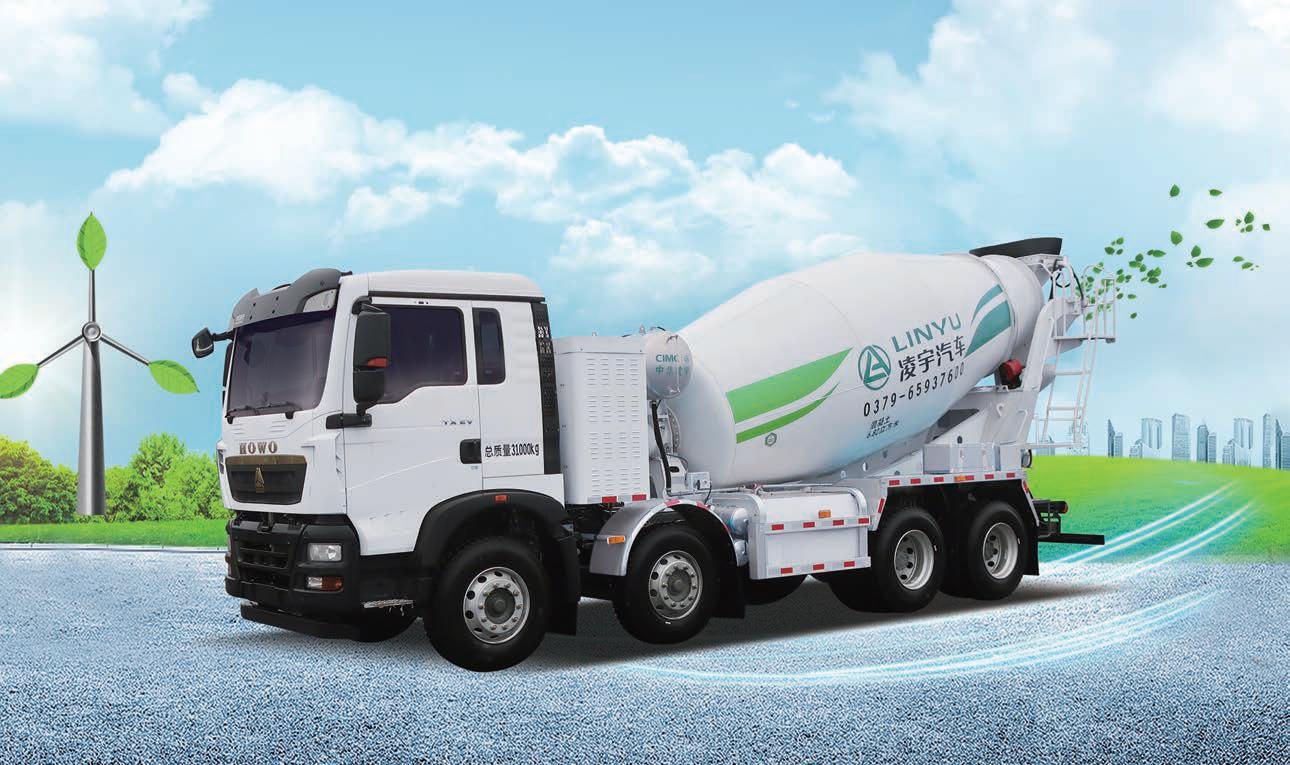
“In 2023, geopolitical conflicts and energy crises continue to impact the economic recovery in Europe,” said Li. “Energy shortages persist, restraining the European market’s production capacity and posing declining consumption risks. The supply chain situation remains tense, and the challenges in the European semi-trailer market persist. However, semi-trailer manufacturing companies with a stable supply chain guarantee system will gain a competitive advantage.
“We are actively tackling these challenges in European Business. We have completed the construction of LoM manufacturing plants in Southampton and Mansfield in the UK, and Pijnacker in the Netherlands, which helped fully release the production capacity. SDC optimised the
manufacturing process and value stream, established the LTS production centre for Light Tower parts, and carried out re-planning and re-arrangements for products and production lines, thus greatly improving production efficiency. “Meanwhile, the company promoted the improvement in corporate governance of SDC and successfully transformed SDC, with profits hitting a five-year high. LAG actively explored new energy products and controlled the risk of supply chain shortage. European Business will actively explore new products and business opportunities in the future, embracing a new development landscape that offers growth opportunities.”
Another key focus for CIMC Vehicles is its partnership with TB Business Group to produce final mile vehicles and support China’s cold chain network.
“CIMC Vehicles has continuously focused on the cold chain logistics landscape, from the ‘first mile’ from the origin to the ‘last mile’ in the city,” said Li. “In 2021, CIMC Vehicles made a significant move by launching the ‘Terabyte’ brand, dedicated to manufacturing and selling refrigerated and dry van bodies. It has introduced mobile refrigeration equipment with five significant advantages: mobility, scalability, high quality, aesthetic design, and rapid deployment.”
The Terabyte products, according to Li, are mainly used for urban fresh food distribution and urban logistics delivery.
“They are a vital initiative for CIMC Vehicles to adapt to the latest national regulations and changes in the industry and to promote the transformation and upgrade of urban logistics delivery through a Sophisticated Manufacturing System,” said Li. “By introducing North American technology of refrigerated van truck bodies and European technology of dry van truck bodies, TB Business Group has continuously absorbed and innovated, establishing Light Tower production lines of internationally advanced refrigerated van truck bodies and highly automated dry van truck bodies.
“Among them, CIMC Vehicles’ refrigerated van truck bodies, shared refrigerated vehicles, and mobile refrigeration equipment will focus on the ‘6+1’ key categories, namely main fresh food including meat, fruits, vegetables, seafood, dairy products, and frozen foods, as well as pharmaceutical product which is vaccines. They will address the storage and logistics transportation of refrigerated and frozen goods from the source origin to the hub transit locations, filling the gaps in cold chain warehousing and logistics
hardware equipment in the first mile from the origin and the last mile in the city, thereby closely aligning with the overall requirements of China’s ‘14th Five-Year Plan’ for the cold chain logistics development.
CIMC Vehicles adheres to the business philosophy of ‘Intercontinental Operation, Local Manufacturing’ and has a business presence covering four major markets in the world, more than 40 countries and regions.
“It is worth mentioning that the company actively focuses on market opportunities in Southeast Asia, Africa, and the Middle East,” said Li. “It promotes the construction of LoM manufacturing plants to build a sustainable competitive operation system in overseas emerging markets. In 2023, economic activities in emerging markets gradually return to normal, and domestic and overseas demands will continue to recover, which will contribute to sustained economic growth. With the continuous promotion of the “Belt and Road Initiative”, emerging markets were the most urgent demands in global development and there are incremental opportunities to be tapped in emerging markets.
“The company actively built branches of LoM manufacturing plants in overseas emerging markets, and successively built LoM manufacturing plants in key market areas such as Southeast Asia, to improve product assembly efficiency and product quality, thus realising the long-distance delivery from LTP production centres.”
CIMC Vehicles is also invested in electrification and hydrogen trends.
“The company aligns with the significant trends of electrification and intelligence in the automotive industry, promoting the high-quality development of the road transportation equipment industry towards low emissions,” said Li. “Regarding the innovation of new energy products, the company advances in-depth joint research and development with tractor manufacturers, and has a leading edge in terms of lightweight road transport, intelligent design and adaptability.
“With respect to semi-trailers, the company has initiated a forward-looking plan to start a business for the third time and is making substantial progress in the research and development of new energy semi-trailers. The exploration of new energy for refrigerated trucks in North America is in a key stage. The built-in axle generator and battery pack are used to supply power to the refrigerator, so as to reduce the vehicle weight and achieve long endurance mileage. CIMC Vehicles has started the development and testing of the second-generation prototypes.
“In terms of specialty vehicles, the company launched pure electric mining trucks with long endurance mileage and developed various new energy concrete mixer truck products with battery charging and swapping, to greatly reduce the self-weights of the vehicles and improve the economy of use by clients. In terms of urban distribution trailers and refrigerated vans, CIMC Vehicles actively cooperates with tractor manufacturers to develop new energy refrigerated truck products, with the TB KG hydrogen-energy refrigerated trucks winning the honour of the ‘No.1 Hydrogen-energy Refrigerated Truck in 2022’.”
As for asset tracking, CIMC Vehicles has established a platform for monitoring new energy and China VI-compliant enterprises. It can monitor the vehicle status in a real-time manner, form a closed loop of data and provide a basis for fault diagnosis and aftersales.
“The company has also developed a set of intelligent monitoring systems, which allow the monitoring of the temperature, humidity and cargo status in the van body through personal computers or mobile phones, thus comprehensively meeting the needs of users in various scenarios,” said Li. “For industrial synergy, the company participates in the investment in and integration of the upstream and downstream industrial chains of new energy heavy trucks, and actively improves the synergy in production, design, mass production and delivery of new energy products, so as to promote the innovation and transformation of the next-generation new energy heavy trucks.”
www.cimcvehiclesgroup.com
TAPESTRY A FINE
FROM ITS ANCIENT ROOTS, TRANSPORT HAS BEEN A DEFINING ASPECT TO SAUDI ARABIA’S ECONOMIC AND CULTURAL FABRIC. TODAY, ITS ROAD NETWORK IS STILL FUNDAMENTAL TO KEEPING THE KINGDOM MOVING, BUT DIVERSIFICATION IS HELPING BOOST ITS INTEGRATION INTO THE GLOBAL ECONOMY AND IT’S WELCOMING THE WORLD WITH OPEN ARMS.

Saudi Arabia’s rich history has been born out of trade. For centuries, camel caravans travelled the Arabian Peninsula carrying with them resins like frankincense and myrrh, exotic spices, precious stones and silks. The routes they carved out brought not just goods, but prosperity. Today, the Kingdom’s mode of transport and their offerings may have changed but the importance of large-scale movement of people and
products hasn’t – making it a fundamental sector of the country’s economy.
Occupying four fifths of the Arabia Peninsula, Saudi Arabia is bound by the Red Sea in the west and the Persian Gulf in the east. It consists of an
area of two million square kilometres and has a population of approximately 35 million people, making it the largest country in the Middle East.
Since King Abdulaziz Al Saud established the modern Kingdom of Saudi Arabia in 1932, its transformation has been steady, turning itself from a desert nation to a sophisticated state, and now a major international player.
It has one of the largest economies in the Middle East with the oil industry accounting
for most of the country’s GDP and exports, which means the government is heavily invested in infrastructure, ensuring cities grow and transport routes keep up.
Vision 2030
Saudi Arabia hasn’t always been considered an easy place to do business, but since the launch of a strategic plan to diversify the kingdom’s economy away from a reliance on oil, the government has introduced a number of inclusive legal and regulatory amendments, such as allowing 100 per cent foreign ownership of companies.
In 2016, Crown Prince Mohammed bin Salman announced Vision 2030 as a way to create a society more in line with modern global trends. The strategy relied on three main
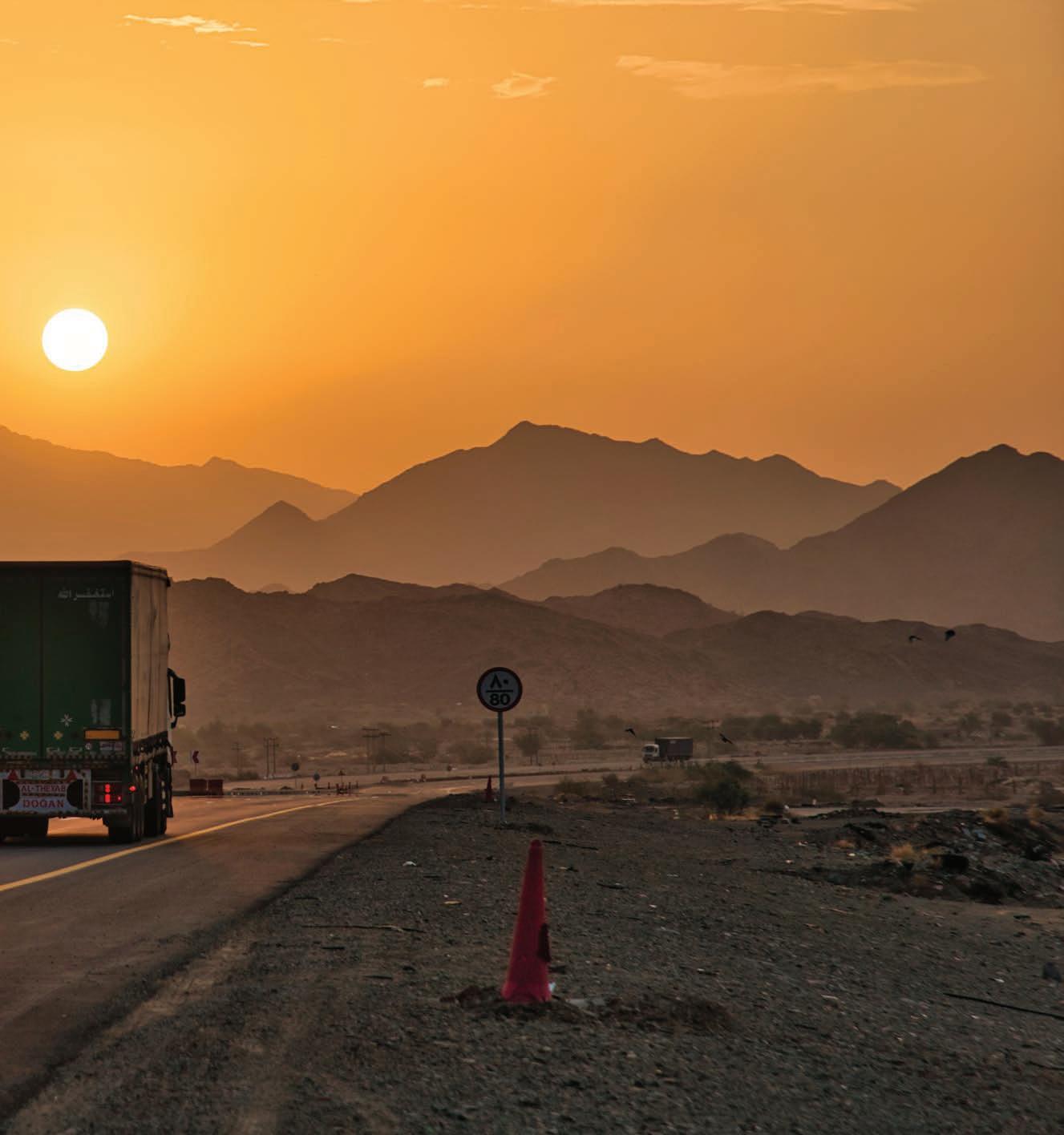
pillars – a vibrant society, a thriving economy and an ambitious nation. The thriving economy goal aims to diversify the economy by increasing private sector participation, attract foreign investment and develop non-oil industries such as technology and renewable energy. Meanwhile, under the umbrella of an ambitious nation, leaders are hoping to see citizens promote a culture of innovation and entrepreneurship.
Vision 2030 includes a wide range of initiatives including the creation of a sovereign wealth fund, the establishment of new economic cities, the development of the tourism sector and the expansion of education and training opportunities.
It has especially revitalised the transportation construction industry with strong initiatives to invest in major construction plans driving the sector. Projects such as the Red Sea International Airport and Railway Tunnel have been instrumental in growing the economy, creating a huge demand for transportation construction companies.
Under the plan, the government is also keen on issuing licenses for full-fledged foreign transportation infrastructure construction businesses. The Saudi market is fiercely competitive and fragmented, with many international and domestic companies.
International companies are now partnering with local players to form joint ventures, providing an opportunity for local businesses to exploit the global network of international companies.
At the time, the plan was considered bold and ambitious, but experts say the overall success of Vision 2030 will depend on the ability of the Saudi government to continue to implement the necessary reforms and navigate the social and economic challenges.
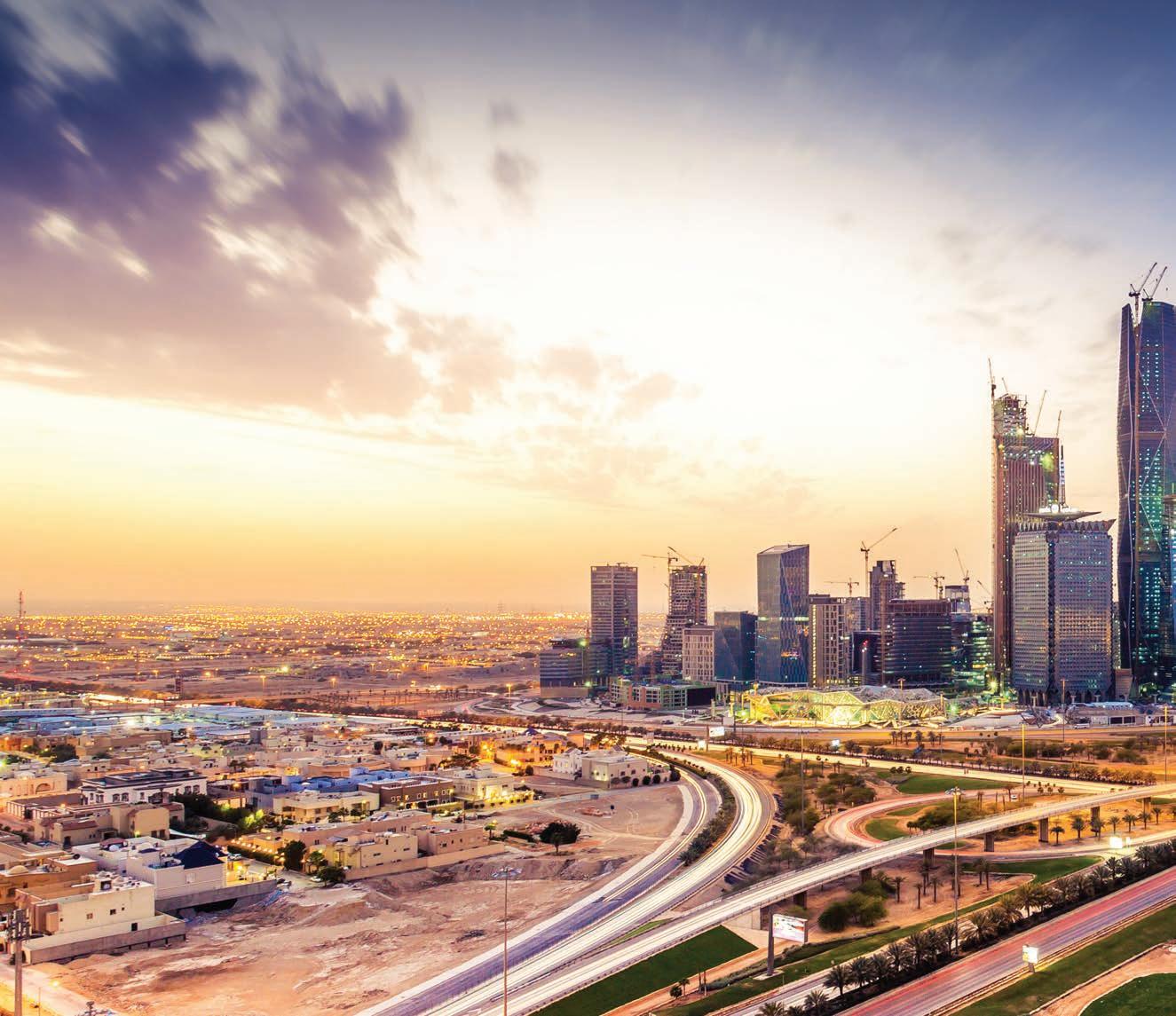
Current financial position
In its latest Global Economic Prospects report, the World Bank affirmed its expectations for Saudi Arabia’s real Gross Domestic Product (GDP)
growth at 3.7 per cent for 2023 and expects the economy to grow by 2.3 per cent in 2024. This is despite the fact that growth rates are slowing amid high inflation and interest rates the turmoil arising from the Russian invasion of Ukraine.
Saudi Arabia has also jumped 17 ranks in the World Bank’s Logistics Performance Index for 2023. The LPI measures the logistical suitability of 155 countries. The Minister of Transport and Logistic Services, Saleh Al-Jasser, announced the LPI success in April to much fanfare. He said success was achieved less than two years from the launch of the national strategy for transportation and logistics services, which aimed to consolidate the kingdom’s position as a global logistic hub.
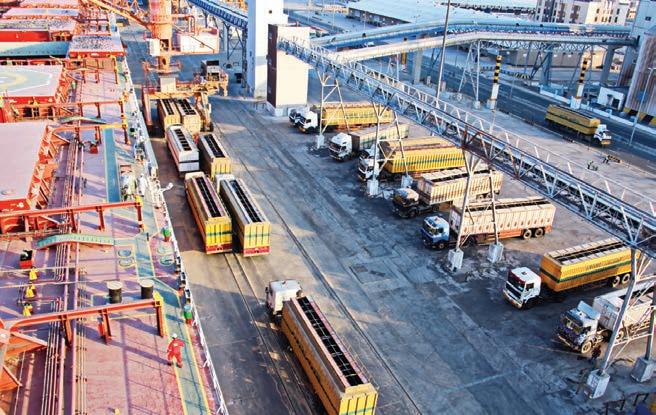
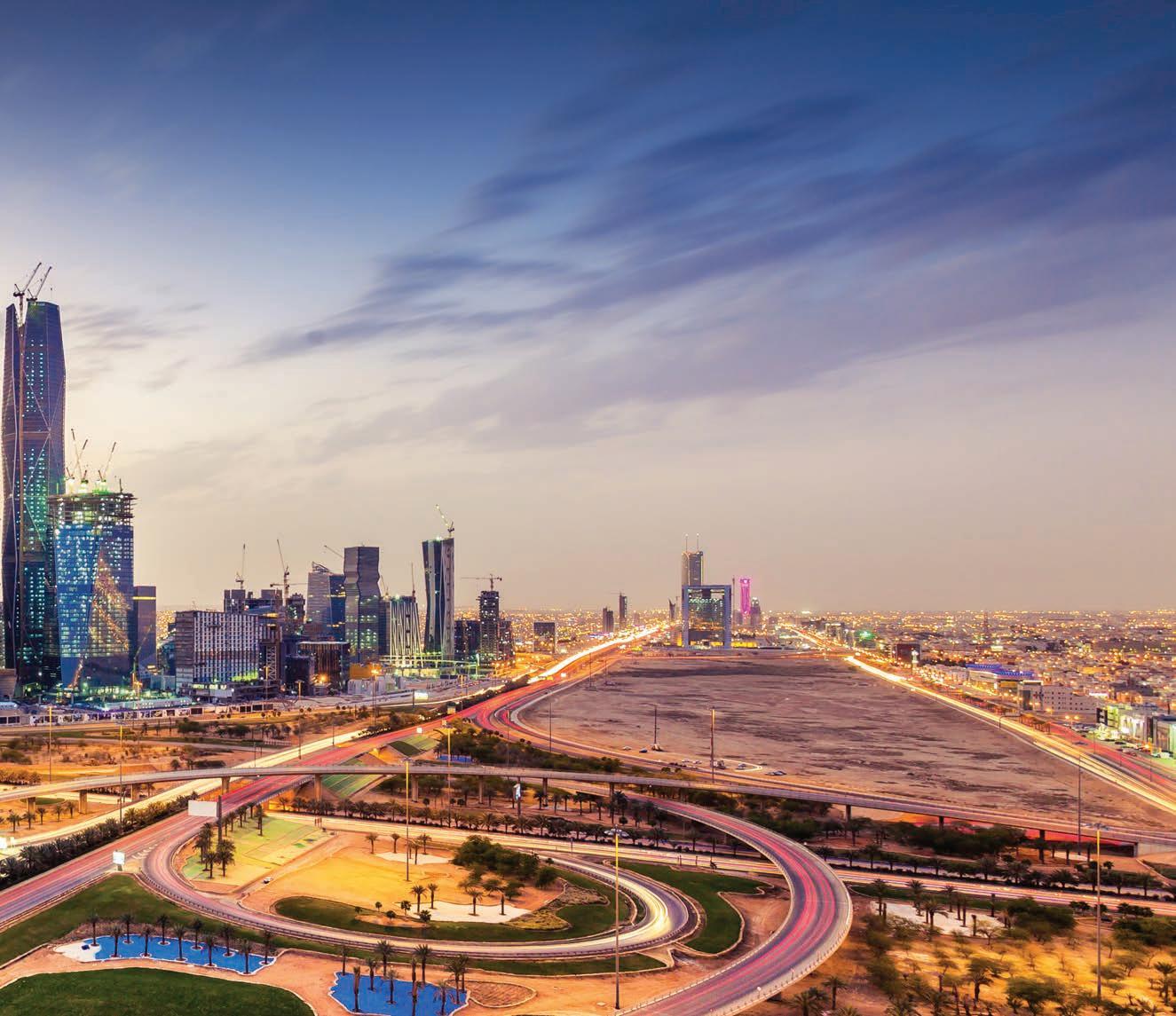
New market research, looking at the Kingdom’s freight and logistics market, shows it is expected to progress at a compound annual growth rate of 6.53 per cent. The next five years look promising, according to experts, with economic diversification, tax regimes and foreign direct investment policies shifting in favour of an open economy.
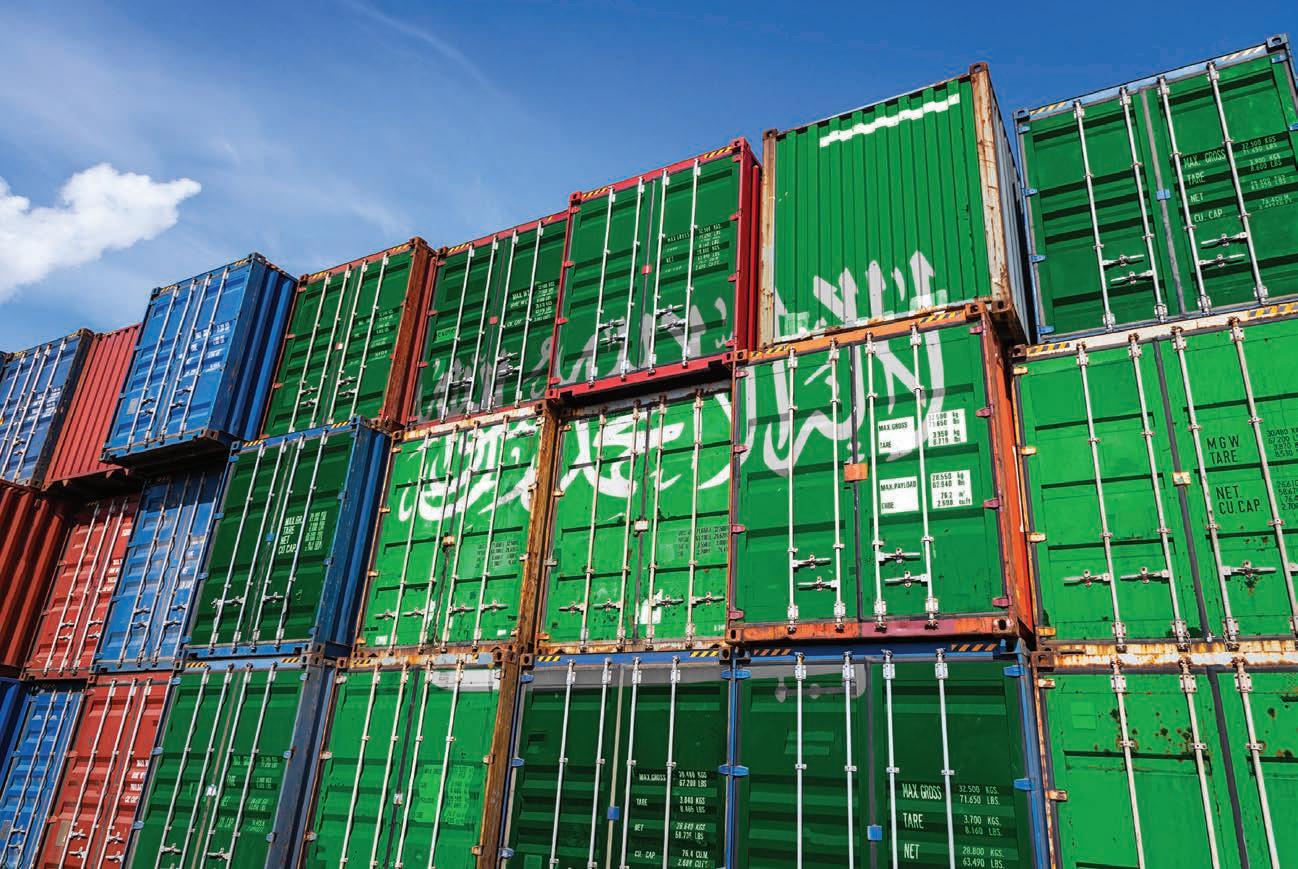
Transport System
Saudi Arabian roads, overtime, have become the defining feature of the kingdom’s transport system. This is in part due to the scattered locations of its population centres and because of its unique geography – deserts, valleys and mountains proving to be challenging obstacles. It is also the largest country in the world without a river, an oftenuseful transportation mode. As Saudi Arabia grew and prospered over the last century, a reliable network of roads became essential.
According to a geography paper by the kingdom’s Qassim University, the development of a road network can be divided into two major phases. The first between 1938 and 1970 when it was slowly developing as a result of its 1932 royal decree, unifying the regions into a kingdom. The second, after 1970, was considered to be post national planning, when the kingdom became the largest oil producer in the world and high investment was necessary. The oil crisis in 1973 brought in even more money, with one estimate suggesting that the economy grew from $15 billion USD in 1973 to US $184 billion by 1981.
Today Saudi Arabia has a road network covering more than 200,000 kilometres, including 66,000 kilometres of roadways connecting major cities, and providing access to railways, ports and airports. There are several international airports including in Jeddah and Medina, while the ports of Jeddah, Dammam and Jubail are important hubs for the transportation of goods both domestically and internationally to transit points between
Asia, Europe and Africa.
Substantial investment in the development and upkeep of infrastructure, especially heavily used roads and bridges, is a priority. Plans are currently underway to build more than 3,500 kilometres of new roads, including 284 highways as a way to link the country’s main urban centres. There are also ambitious plans to create an eight-lane bridge over the Obhur Creek outside of Jeddah. A recent capacity assessment of the road network predicts freight transportation is forecast to rise due to increasing industrial activity and the expansion of e-commerce throughout the region.
Global transport cooperation
In 2018, Saudi Arabia became part of TIR (Transports Internationaux Routiers, International Road Transport), an important step in spreading its global wings.
The TIR is a multilateral treaty that allows for the movement of good across international borders without the need for extensive customs checks at each border crossing. It provides a number of benefits to shippers, including reduced transit times, lower costs and it reduces
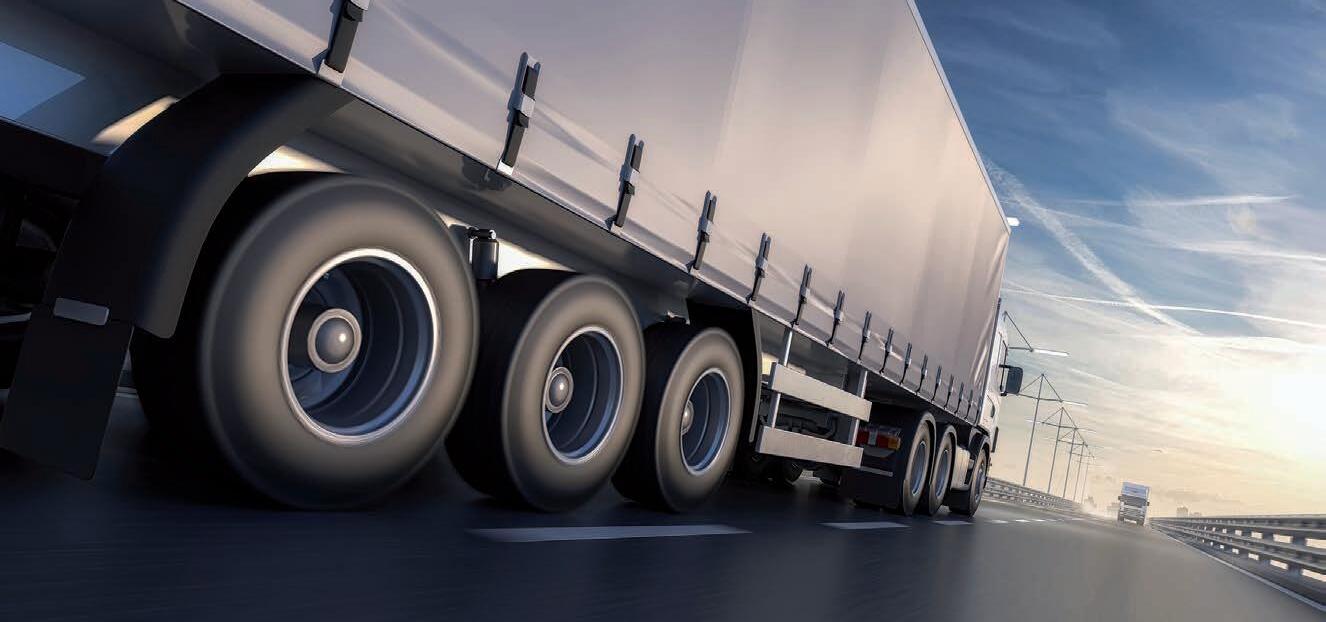
administrative burdens. For Saudi Arabia, it helps facilitate international trade and promote economic growth.
Infrastructural investment
The rapid growth of continuing urbanisation is another major driver of transportation infrastructure investment. The kingdom’s urban population accounts for 84 per cent of the total number of people, with that percentage expected to reach 92 per cent by 2035. As the share of the urban population grow, the growth of transport infrastructure is required to connect them.
Case in point is the Saudi Land Bridge Project, aimed at creating rail links between the Red Sea Port of Jeddah and the Persian Gulf Port of Dammam. The plan is to create a direct rail link between Europe and Asia, bypassing the need for ships to pass through the Strait of Hormuz. The project is expected to improve the efficiency of freight transportation in Saudi Arabia, as well as reduce transportation costs and congestion on its roads.
Led by a Chinese company in collaboration with a number of other private sector investors, the Saudi Land Bridge is expected to cost $7 billion.
Reporting on the project’s planning progress in January, Transport and Logistics Minister, Saleh Al-Jasser, said the transport and logistics services sector was ready for privatisation, and Saudi Arabia was making great strides, citing Prince Muhammad International Airport in Madinah as the best example. The airport was established entirely by the private sector and was a “qualitative
leap for the city in terms of services, capacity and quality,” the Minister said.
Logistics
Another sector that is flourishing, due in part to outside investors, is logistics, with the government unveiling only last year a sweeping plan to transform the kingdom into a global logistics centre.

So far, it has kept its promise offering up land near Jeddah for a modern warehousing complex as part of a concession agreement. Kuwaiti supply chain services company, Agility, will, as a result, invest €166.9 million into building a vast new logistics park for storage and distribution. Under terms of its agreement, Agility will have the right to operate the park for 25 years.
The hope is that this state-of-art warehouse, which is anticipated to be finished by 2025, will offer a competitive advantage, accelerate Saudi economic growth and make it easier for companies to expand in the kingdom. The Governor of the State Properties General Administration, Ihsan Bafakih, said initiatives like this one offer an opportunity to enhance the contribution of the country’s real estate assets, while increasing the value of the government-held property.
Technology
Saudi Arabia has recently launched several initiatives aimed at making the country one of the most technologically advanced in the world. It’s starting by regenerating the country’s digital infrastructure and has committed to an annual investment of 2.5 per cent of GDP into the research, development and innovation sector by 2040.
Some of the projects the government are working on include the Saudi Vision Cable, a high-capacity submarine cable in the Red Sea, spanning more than 1,000 kilometres, which will provide the latest communication technologies and meet the needs of markets across Asia, Europe and Africa. It is also working on the Alibaba Cloud in Riyadh which will help deliver high-capacity cloud services.
Other areas that are garnering new investment are artificial intelligence and datadriven economics. Keen to partner with leading global companies in the field of AI, the government recently signed a series of partnership agreements with international tech companies.
www.globaltrailermag.com
FIRE AND ICE
WITH NEW TECHNOLOGY AND A MARKET PRIMED FOR THE PICKING, UNITED ARAB EMIRATES-BASED INDUSTRY-LEADING DEVELOPER AND TRAILER MANUFACTURER, GORICA, IS SET TO FURTHER EXPAND ITS REFRIGERATED TRANSPORT RANGE TO THE KINGDOM NEXT DOOR WHERE IT ALREADY HOLDS A MARKET-LEADING SHARE.

The last 20 years has seen huge advancements within the Middle Eastern refrigerated transport industry, and it has moved leaps and bounds from the era of perishable goods being covered with ice in the back of trucks.
A combination of scorching temperatures and a growing awareness of the importance of safety and hygiene in the cold chain has created an opening in the market that Gorica didn’t ignore, and it has Saudi Arabia firmly in its grip by offering industry leading bodies and trailers for transportation of perishable goods.
The company
Founded in 1990 and based in Dubai, Gorica is owned and chaired by Ivan Fonazaric. It has grown to become a leading developer and manufacture of truck bodies, trailers, semi-trailers and cement mixers in the Middle East and North Africa. The Gorica Frigo division was founded in 2010
GLASS FIBRE REINFORCED POLYMER
Gorica’s preference for using glass fibre reinforced polymer (GFRP) skin panels, as opposed to metal, in its refrigerated trailer builds is well documented. These are some of the reasons, it says, this material is a must –especially in the Middle East.
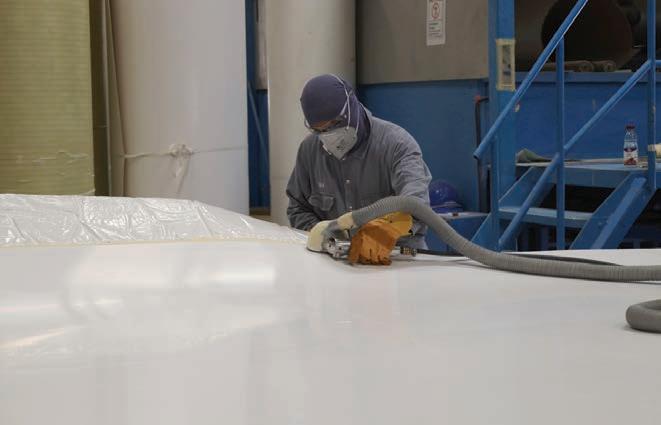
• Completely sealed, a resin-rich gel coat colour moulded on to it, means it never needs painting.
• Able to withstand any type of corrosive environment including chemicals, saltwater, humidity and acids, removing the need for maintenance.
• Doesn’t absorb heat, so wall temperatures stay constant.
• Strength can be customised to meet the requirements of any application.
• Can be moulded into various shapes and textures at a low cost.
• Is an environmentally friendly option because of its longevity.
and went through vast expansion in 2013 after setting up a factory in Dubai Industrial City specifically for manufacturing refrigerated truck mounted bodies and semi-trailers. A pivotal goal was setting up a modern, forward looking and technology-supported manufacturing facility (Factory #4). This factory specialised in the manufacturing of refrigerated semitrailers, dry box semi-trailers, refrigerated bodies and dry cargo bodies.
For a company that is self-described as being passionate about trailers, refrigeration was a necessary move. Fonazaric has regularly said he has great faith in his team and both the technical and design branches of the businesses, which are always rigorously looking for ways to advance their offerings.
“Gorica’s long-term commitment is to always innovate and bring the most advanced products to the market to deliver greatest competitive advantage to our partners and clients,” he said.
The manufacturing Long-established in the Middle East as top trailer and semi-trailer builders, Gorica’s foray into refrigeration more than 20 years ago wasn’t a moment too soon.
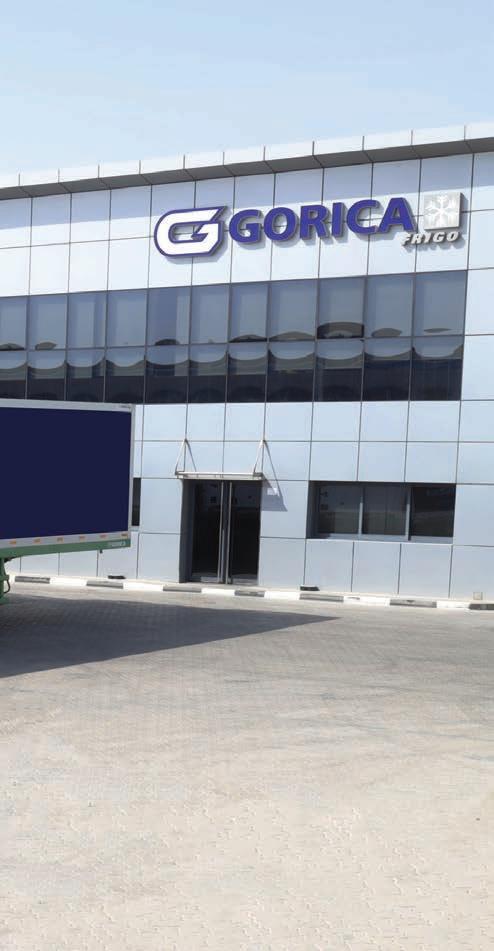
“There are extremely hot conditions in this region,” said Gorica Group General Manager of Sales and Marketing, Domen Bocker. “Temperatures can reach over 50°C and many transporters have to travel long distance routes.”
Gorica’s Frigo factory in Dubai, is a state-of-the-art facility and it is unique to the Middle East as it is one of the few trailer and body factories that specialise in the manufacturing of products made of glass fibre reinforced polymer (GFRP) alongside typical polyester coated galvanised steel (PPGI).
GFRP is a composite material made of glass fibres embedded in a polymer matrix. Its advantage is that it is lighter, stronger and more corrosion resistant than steel, as well as being easily recycled. It also offers quick reparability of one to two hours, keeping maintenance costs to a minimum.
The market
Gorica sees the Kingdom of Saudi Arabia as the motor of the Gulf Cooperation Council (GCC) countries, with exciting potential and investment opportunities. There are a number of reasons for this, including its Vision 2030 initiative. An economic and social reform blueprint, developed by Crown Prince Mohammed bin Salman in 2016, Vision 2030 ‘s purpose was to create a society more in line with modern global trends.
The outcome has been economic growth and outside investment, but also a new focus on a secondary economy beyond oil and gas that is service based and very lucrative – with
service-based economies comes the need for transport, specifically refrigeration.
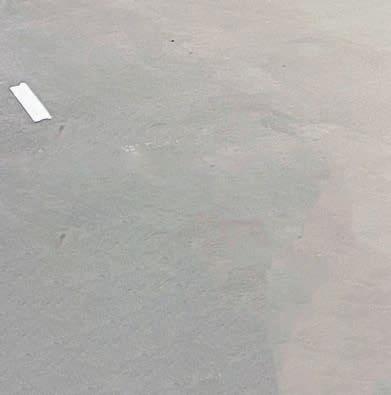
“This new service sector and service sub sector is demanding safe, quality products as knowledge on the importance of health and hygiene broadens,” said Bocker. “Cold chain players are placing a lot more importance on this now, as many companies are still using old, cheap European vehicles, due to lack of regulations.”
Gorica also couldn’t ignore the fact that Saudi Arabia links three different continents and is home to the largest seaport in the Red Sea. A well inter-connected transport system makes it primed to be a leading global logistics hub. The Kingdom also has a gross domestic product equal to the total of all other GCC economies combined, and almost no foreign debt.
Finally, and simply put, there are a lot of people there – 34 million and growing rapidly.
“There has been an influx of a young, educated expat working population which subsequently generates increased demand in perishable goods,” said Bocker.
The offering
When it comes to refrigeration, Gorica’s most popular offering is the 15-metre trailer, which like the other available sizes, is made of one long, seamless GRP panel. By eliminating joints, it has negated thermal bridges, so there is no risk of unforeseen temperature changes. Benefits to using GRP include the fact that it is easily repairable with no need for a complete replacement in the event of damage. It’s also lightweight which results in fuel savings and a reduction in maintenance costs and equipped with industry leading 5 LIP gasket for all the door applications. This positively impacts the temperature recuperation after opening and closing the door and is a unique feature in Gorica’s refrigerated transport solutions. This range of semi-trailers are relatively flexible with Gorica able to cater for various applications.
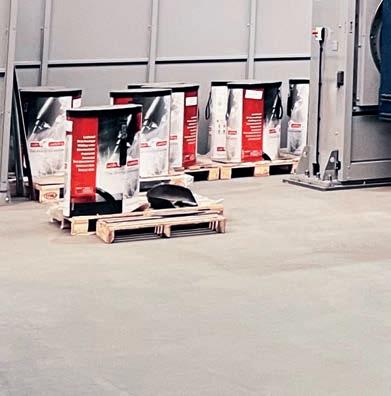
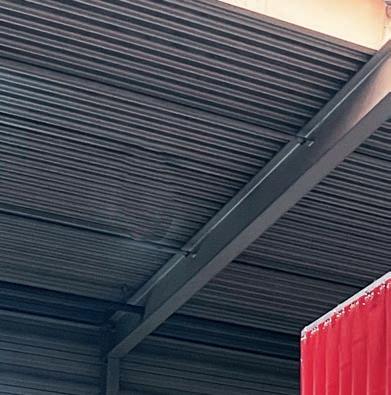
“We can provide for the needs of pharmaceutical or vaccination transportation requirements, or offer something completely different,” said Bocker. “Fresh and frozen meat transportation, for example, might require a roof hanging system and that is something we
can accommodate.”
Customisation is a common theme with Gorica’s design and manufacturing capabilities, simply because, although they follow European design style and features, it is fully aware that the Middle East and Africa possess very different conditions and needs.
Gorica has expressed its confident in its understanding of the opportunity in this growing market and knowledge of product solutions. Its refrigeration offering, in tandem with its stainlesssteel trailers, will target and partner with companies that include perishable food producers and processors, mills and chain markets among others. While Gorica can’t talk in detail about its specific investments in Saudi Arabia, it does confirm that it is investing in manufacturing and aftersales service infrastructure.
Its goal is to have a substantial number of key clients and partners by demonstrating that it has the product solutions to suit the market’s needs.
As for targets in Saudi Arabia, Gorica has an aim of 50 per cent market share in three years and 70 per cent in five years, a goal the company calls challenging, but realistic.
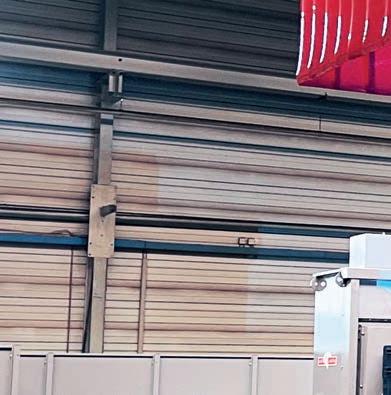
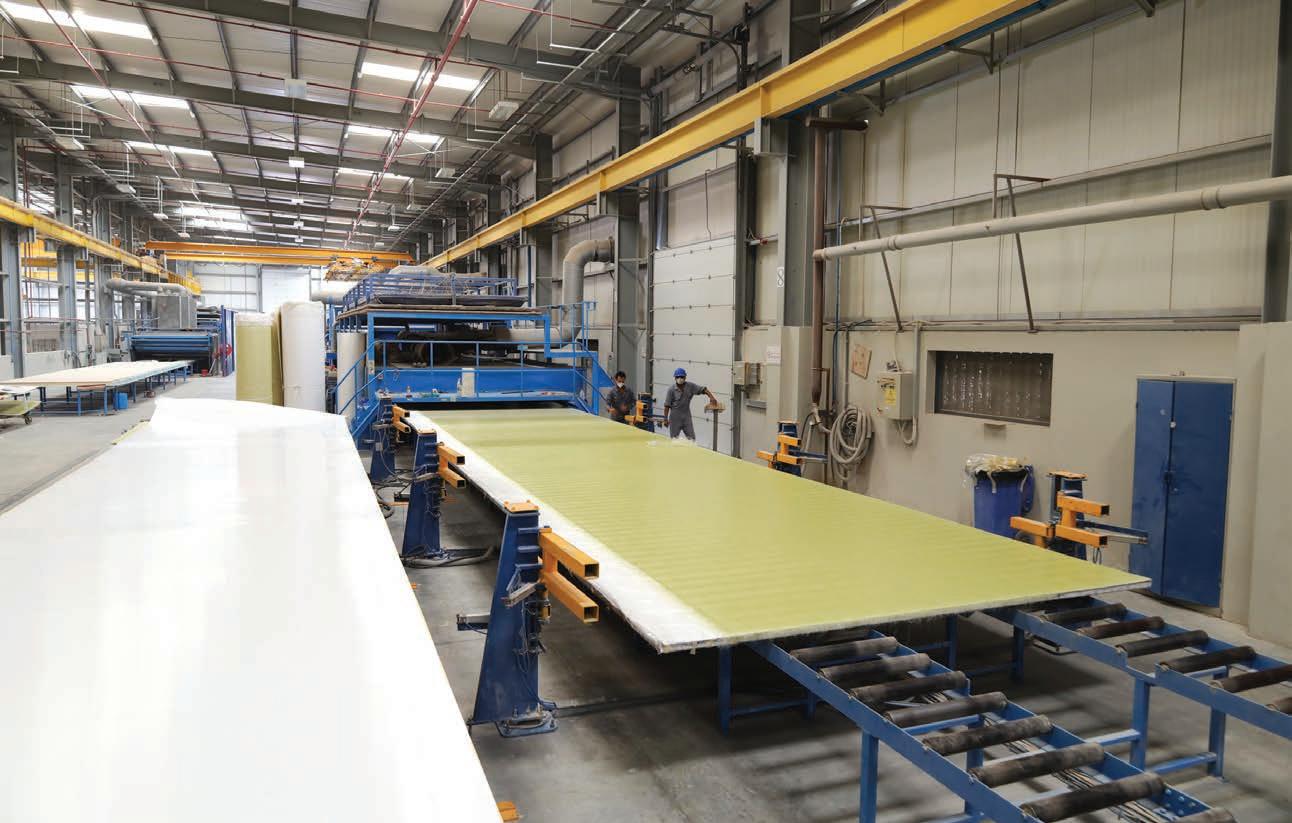
www.goricagroup.com

Valk Welding Group
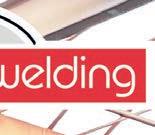
Tel. +31 78 69 170 11




info@valkwelding.com
www.valkwelding.com

Automate your welding production with Valk Welding
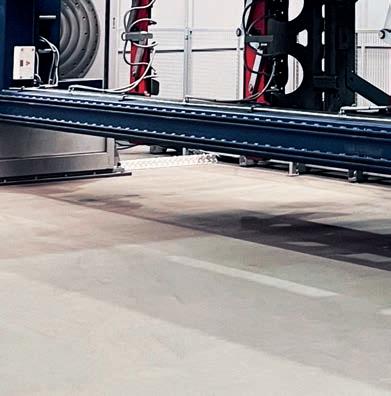

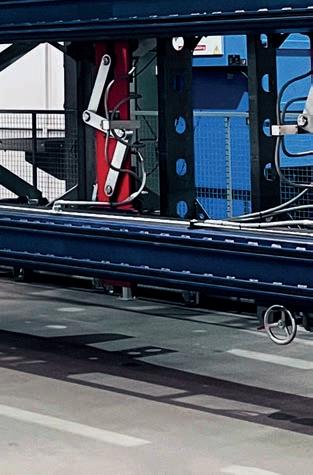
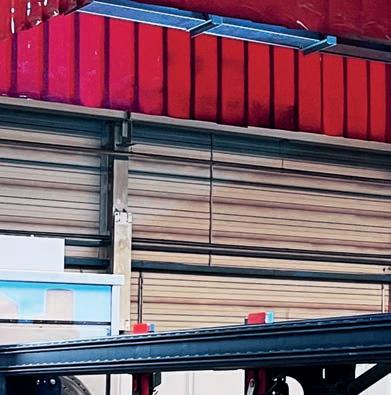

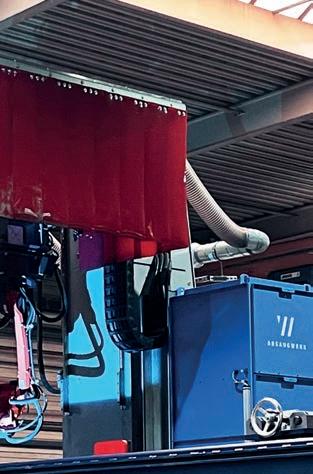
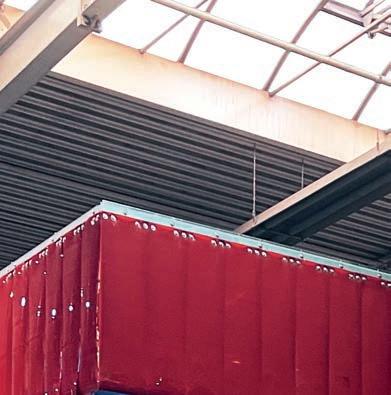

Valk Welding offers the automa�on solu�on that ensures your welding work is of the highest quality every day and your produc�vity is guaranteed all year round. The flexible welding robot systems of Valk Welding are designed for welding small parts to large construc�ons made of different materials, think of steel, thin-walled stainless steel and aluminum. Due to far-reaching technological developments, the welding robot systems are suitable for both large series and single piece produc�on. Thanks to the systems of Valk Welding, this is also within your reach. We supply a total package including so�ware, wear parts, welding wires, training and start-up support. One clear point of contact that will take care of everything for you: Valk Welding.
Please contact us or take a look at the various possibili�es on our website (www.valkwelding.com).
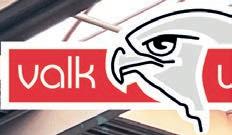



The strong connection
Watch our videos
MEETING DEMAND IN A
FLOURISHING MARKET
Nowadays, the refrigerated transportation industry is expanding at a very fast rate, due to the escalation of globalisation, that has led to the growth of trades across the globe. In fact, according to research findings, the demand of perishable goods, which require steady temperatures, has risen and, above all, one fourth of the total global production of goods and services are exported worldwide. It is for this reason, that temperature-controlled vehicles are becoming indispensable for preventing the deterioration – and the consequent loss of value – of products that need to be exported every day.
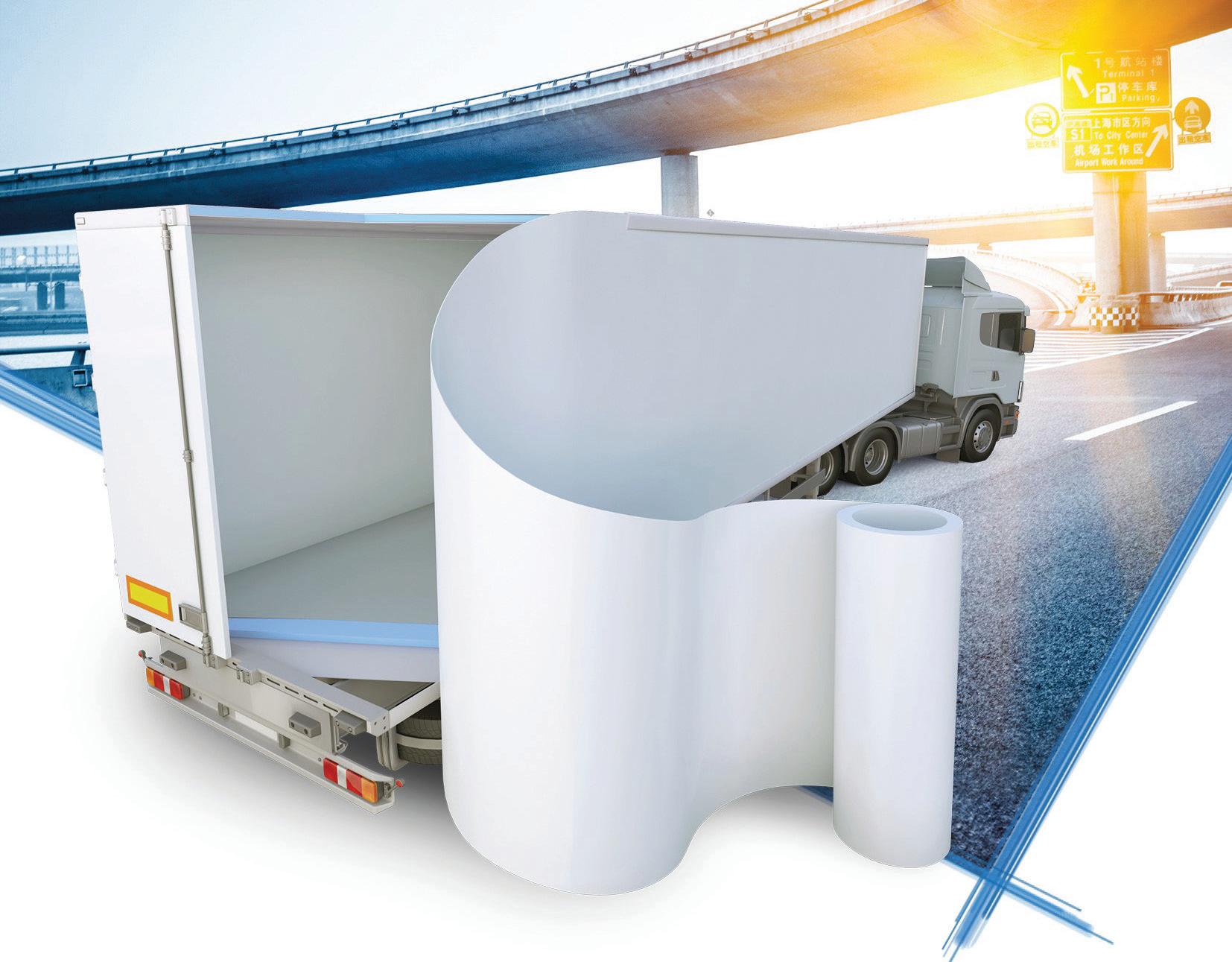
In this specific field, Brianza Plastica, an Italian company with more than 60 years
ELYPLAN & ELYCOLD: BRIANZA PLASTICA’S LIGHT GRP LAMINATES, THE PERFECT CHOICE FOR TEMPERATURE-CONTROLLED VEHICLES.
of experience in the fibreglass laminates’ sector, is highly competitive and can satisfy the various requests of this flourishing market. In particular, its Elyplan and Elycold Extra-Glass and Elycold Lite grp laminates are ideal for the realisation of interior and exterior walls, panels, and doors of temperature-controlled vehicles.
The grp laminates, which belong to the Elyplan
family, come in rolls and sheets and their thickness varies from 0.8 to 3 mm, while length is on clients’ requests. The peculiarity of these grp laminates is that they are manufactured by continuous hot lamination process. In this way, the highest possible polymerisation of the composite material is achieved, and the result is a high-quality and perfectly flat product at a competitive price. The quality of Elyplan’s laminates is ensured by the use of the finest raw materials, moreover they can be covered by a layer of gelcoat made of isophthalic resins, that makes the product very resistant to yellowing and impermeable to water vapor and condensation.
But why is Elyplan Extra-Glass one of the most suitable and preferred grp laminate for industrial and commercial vehicles? For sure, because it has special and sought-after characteristics such as lightness and high mechanical strength. Thanks to these peculiarities, Elyplan Extra-Glass is widely used for all those vehicles that require high impact resistance and weight savings. In the last few years, lightness of vehicles is a matter that has becoming crucial from the economic and environmental point of view: in fact, lighter the vehicle, fewer the consumption of petrol, the expenses and, consequently, the emissions of CO₂ in the atmosphere.
Elyplan Extra-Glass is light, meets high aesthetics’ criteria and it is available in the NO BAC version too. The NO BAC technology can be applied on all the Elyplan and Elycold grp laminates with gelcoat protection and it allows to almost eliminate all the traces of bacteria on the laminate and to prevent their colonization; something that can be very useful in fields of applications with high hygiene requirements such as schools, kindergartens, health facilities, kitchens, bathrooms, spas, gyms, and

shopping centres.
The other Brianza Plastica’s range of grp flat laminates is named Elycold. Unlike the Elyplan products, the Elycold ones are produced by a discontinuous cold lamination process and the main advantage is that, thanks to the polymerisation of the material, the fiberglass in the final product is nearly invisible.

All the Elycold flat laminates are a combination of polyester resin and glass fibre, a composite material that has replaced aluminium over the years, above all in the production of refrigeration panels for commercial vehicles, caravans, and motorhomes. In addition, thanks to the use of the finest raw materials, Brianza Plastica is able to provide manufacturers with perfectly flat grp laminates that show excellent long-term properties, such as total impermeability to water and condensation, resistance to UV rays and extreme durability. In addition, all the grp laminates from the Elycold family can be produced with or without a layer of gelcoat, useful for protection and available in the glossy or satin surface.
From the Elycold range, Elycold Lite is the perfect solution for those applications such as ultralight vans or commercial vehicles that requires lightness and good rigidity. In particular, these laminates are produced using resins and specific microspheres which allow increased thickness, without adding extra weight. For this reason, these panels present lower density, but greater rigidity, maintaining unaltered the usual performances of Brianza Plastica’s grp laminates: it is indeed available with gelcoat protection resistant to UV rays and to chemical agents and it has good mechanical performance, suitable for different uses. Another laminate from the Elycold family that is worth to be mentioned and it is for sure suitable for the commercial vehicles’ sector is the new Elycold Extra-Glass. It comes in rolls and sheets with gelcoat, and it has increased mechanical performances. Elycold Extra-Glass is characterised by lightness, given by low specific weight and high mechanical strength, coming from the high percentage of glass content. In this way, all the vehicles which require high impact resistance, weight saving and high aesthetic features can satisfy all these needs using Elycold Extra-Glass.

In conclusion, Brianza Plastica is one of the company leaders in Europe in the production of grp laminates and, with its Elycold and Elyplan range, it offers high quality, light and perfectly flat panels, which are suitable for various applications, including commercial and industrial vehicles that require controlled climates for the transportation of goods and items that cannot be exposed to sharply changes in the temperatures.
For more information, contact: sales-flatlaminates@brianzaplastica.it and follow the official Brianza Plastica LinkedIn channel (Brianza Plastica Fibreglass Laminates Division: Panoramica | LinkedIn).
www.flatlaminates.com
TECH EFFECT
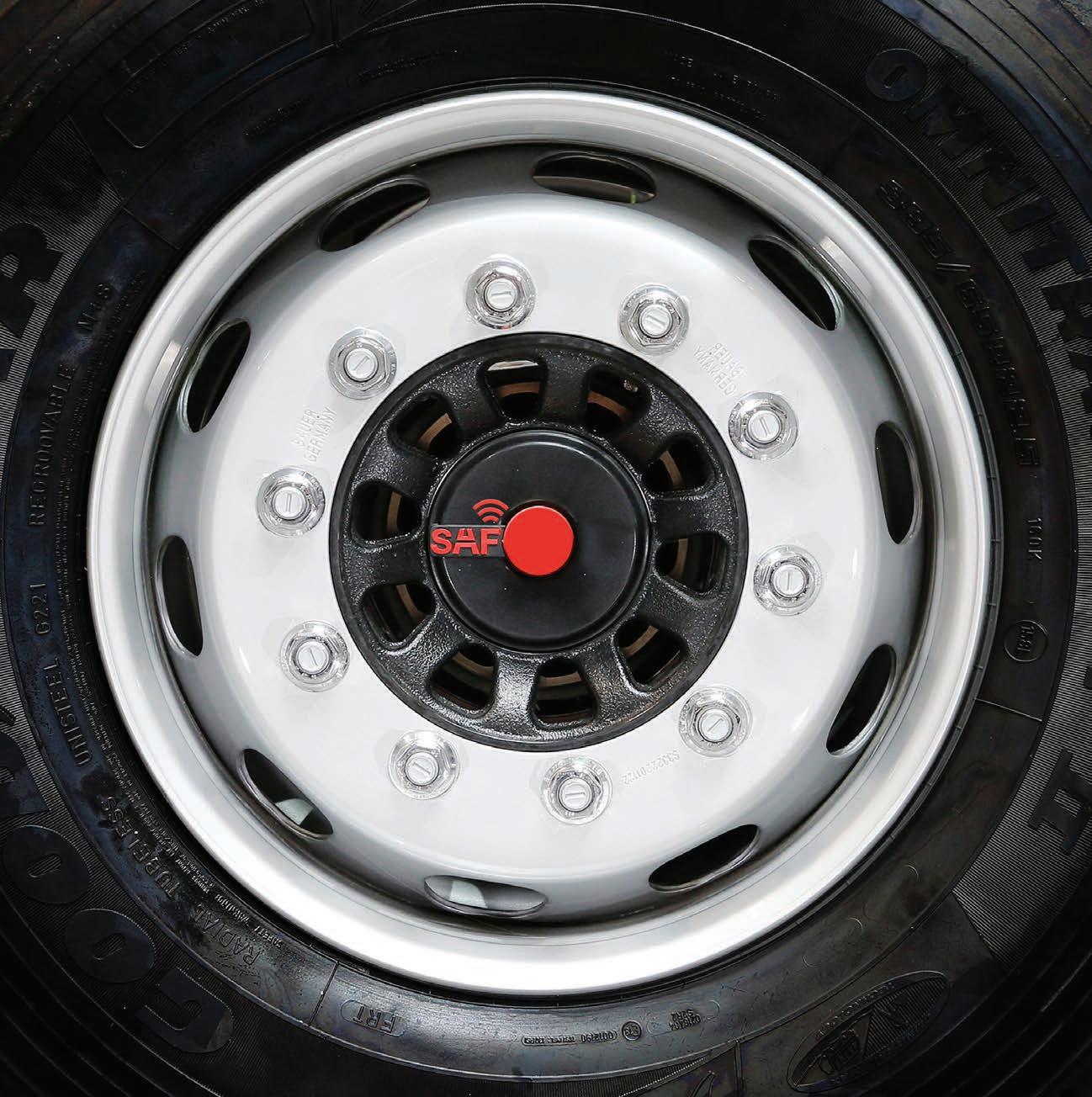
THE RELIABLE IDENTIFICATION
Axle, smartphone app and NFC chip – that is all that will be needed to identify parts on the fly. For fast and reliable repairs, SAF-Holland will be using the Near Field Communication (NFC) technology in its SH CONNECT app in the future, turning smartphones into workshop assistants.
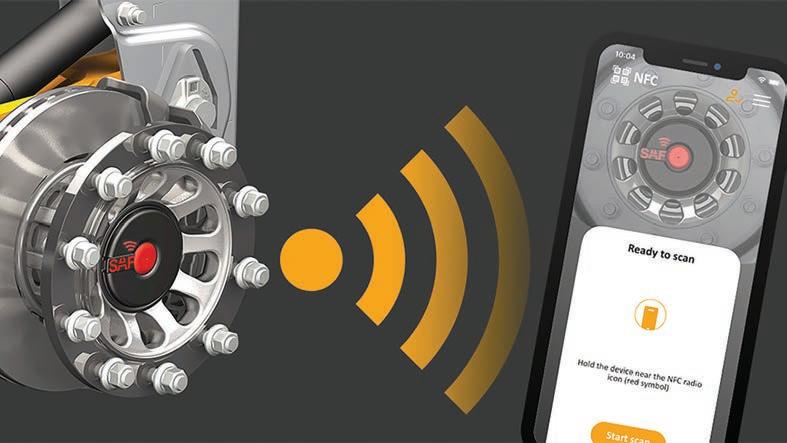
When a trailer is brought into a workshop, the mechanics often have to perform detective work: It is often not directly obvious which of the installed parts on the axle come from which manufacturer. And if the semi-trailer comes in directly from active use, the dirty underbody can make it even more difficult to identify the installed products.
For all cases where the previously standard QR
Code on the suspension cannot be scanned or no inspection pit is available, SAF-Holland already uses the widely accepted NFC technology. The NFC chips are installed in both hub caps of the axles, reliably protected against external influences. The chips are read out with the SH Connect app. If the application is open and the NFC function is activated, the smartphone will detect the NFC chips at a distance of a few centimetres. The app provides users with all available product information, such as installation, operation and repair instructions as well as certificates and brochures, documentation and videos for correct installation and removal of the identified product.
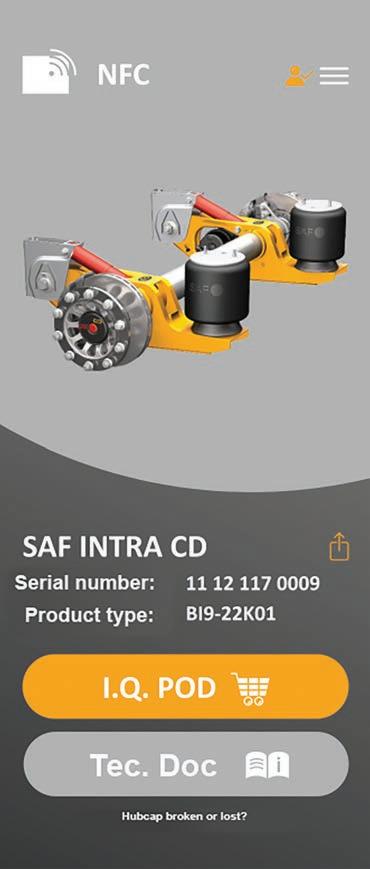
The unambiguous identification of spare parts is key to be able to carry out a repair correctly and quickly. Near Field Communication prevents parts from being mixed up during ordering and the ensuing delays when parts ordered in error have to be returned or exchanged.
Workshop employees no longer have to browse through catalogues or update spare parts lists – the SH Connect app always provides the most up-to-date information. That saves time, costs and manpower, increases safety and ensures that trailers can return to the road quickly.
Workshops and haulage companies do not have to purchase any hardware or software. In addition, information from within the app can be shared with third parties via email or chat, which can prevent input errors. The only prerequisites for accessing the digital world of axles are a smartphone and Internet access.
The new SH I.Q. Portal is another digital product from the SAF-HOLLAND Group. It stands for ‘Intelligent Quality’ and bundles all available information relating to SAF-Holland products to offer more service quality. This includes, for example, the electronic Parts on Demand spare parts catalogue (I.Q. POD) and the I.Q. Service Report as an online form. In the I.Q. Training section, customers can find e-learning sessions to supplement or prepare for in-person training. The I.Q. Knowledge Center database is a central point of contact where users can use the smart search function to quickly obtain the desired information and technical documentation for the SAF, Holland, V.Orlandi and York brands.
www.safholland.com
BETTER BRIGHTER AND
LUCIDITY GROUP, A GLOBAL LIGHTING & WIRE HARNESS DESIGN AND MANUFACTURING GROUP, PROVIDES A TOTAL SOLUTION FOR COMMERCIAL VEHICLES.
Since strategically acquiring Optronics International in 2012, the thirdlargest commercial vehicle lighting brand in the US, Lucidity Group has established bases in North America, Europe, and Australia. With excellent local service, outstanding research and development technologies, and management capabilities, Lucidity Group has been in business for 43 years and is about to open a new automated warehouse and production base at its headquarters this year. The total factory area will reach 109,033 square metres, creating a more significant space to offer better services for customers.
Local production, global delivery
In addition to providing total lighting and wiring solutions, Lucidity Group also established a subsidiary in Australia in 2012, providing professional wiring design and production services, becoming a leading brand in the region. In 2016, Lucidity Group established a subsidiary in Czechia, providing JIT services to European customers. Lucidity s.r.o.
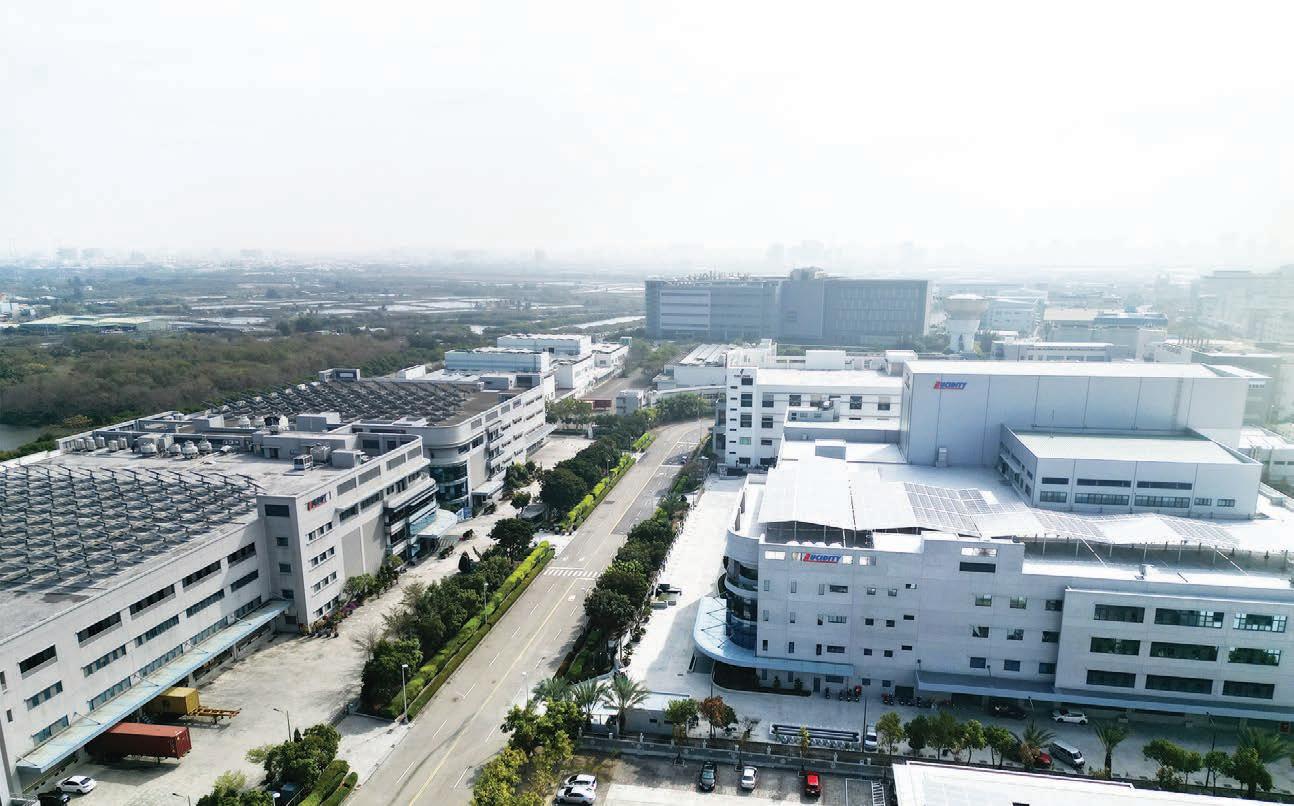
can provide a one-stop solution for time-saving. By focusing on a specific area, you start building awareness of your products and services in the market closest to you. In 2020, it acquired USA Harness, a professional wiring brand in North America, with the goal of providing the most integral and agile solutions for customers worldwide.
Lucidity’s main services and advantages
Lucidity Group is committed to meeting customer needs and creating a better future for the transportation industry. The company invests 5.0 per cent of its annual revenue in innovative research and development capabilities every year and provides onestop customised services from design to production for both lighting and wiring.
“Lucidity values every customer’s vision,” said Jerry Huang, VP of Sales and Marketing at Lucidity Group. “We have an in-house research and development team and environmental testing laboratory that can provide design support and verification capabilities that other brands cannot provide, helping customers quickly develop products for the market.”
Lucidity Group has not only passed IATF16949 certification but also has various laboratory tests for waterproofing, dustproofing, thermal shock, vibration friction, EMI, etc. The company can overcome various verifications in the development stage, ensuring product quality.
Better, brighter and faster
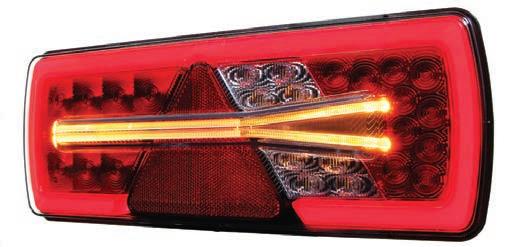
Lucidity Group’s mission is to help customers achieve their goals and grow together with them. Founder Wayne Huang saw the advantages of LED light sources’ energy-saving and high-brightness lighting in the commercial vehicle lighting market in 2001, actively developing LED lighting products, bringing unprecedented success to customers in the market. In 2009, the company began to introduce SMT production lines, automated robot dispensing production lines in 2012, and fully automated production lines with robotic arms in 2016. This year, the company is introducing an automated storage and retrieval system, making production more efficient, achieving the goal of providing customers with better, brighter, and faster solutions.
“Small things make a big difference,” said Lucidity Group Chairman, Wayne Huang.
Only by doing every detail well can we achieve outstanding achievements. Introducing various automation equipment not only reduces heavy workloads and human errors but also improves
employees’ sense of happiness. Handing repetitive and laborious work to robotic arms can alleviate the burden of overwork on personnel and enable them to handle more important work duties that require human management.
So far, the proportion of automation working hours in annual production capacity has reached 40 per cent. In 2023, Lucidity Group introduced Human-Robot Collaboration (HRC) and activated an automated storage and retrieval system. The automated warehouse system has up to 4,352 storage spaces, which can accommodate approximately five World Cup football fields. This system will reduce order throughput times and improve delivery capacity.
Corporate social resposibility
Undoubtedly, ‘net-zero carbon emissions’ is a trending keyword worldwide, thus, the ongoing construction of Lucidity’s third phase building also includes plans to invest in solar power installations, actively promoting the development of renewable energy. Renewable energy accounts for an average of 30 per cent of the company’s total electricity consumption over the past five years.
Lucidity Group considers its employees as the most important core asset. In order to provide a safe and harmonious high-quality work environment for employees, it obtained ISO 45001 certification in 2020. Through internal and external audits conducted annually, it regularly conducted risk identification operations, reviewed hazards in operations and established a sequence of risk controls. This lead to policy updates, improved personnel awareness, enhanced prevention management and substantial improvements in implementation. Lucidity also actively promotes communication between labor and management, enabling employees to form a consensus on workplace safety, health, and wellbeing, shaping a sustainable work environment that is comfortable, safe and healthy.
Upcoming future
The opening of the automated warehouse and production base at its headquarters in September 2023 is undoubtedly a significant milestone for the Lucidity Group.
“We can’t wait to present the new image of Lucidity Group to our customers,” said Morris Liu, Director of Sales and Marketing at Lucidity Group.
Since its establishment in 1981 as a small factory with only 10 employees, Lucidity Group has grown into an international group with six major global locations. The unchanged initial intention is to work hard to light up the world. On the road ahead, Lucidity Group will continue to invest in enhancing our internal capabilities, improving the competitiveness of the group, and integrating external resources to amplify the speed of our one-stop global service.
The company is committed to assisting customers and partners in accessing more marketing resources to create even greater success in their business endeavors. Lucidity Group’s professional global partners are your reliable support, dedicating to offer services with clarity and highefficiency, they are always willing to provide problem-solving solutions and work with you to build a bright and innovative future.
www.lucidity-group.com
JOST
GOES TO SHOW
JOST’S NEW KKS AUTOMATIC COUPLING SYSTEM WAS REVEALED TO AUSTRALIA AT BRISBANE TRUCK SHOW 2023. WHILE ATTENDING THE EVENT, JOST CEO, JOACHIM DÜRR, REFLECTED ON JOST’S DOMINANT GLOBAL MARKET POSITION WHICH LED THE KKS’ ARRIVAL DOWN UNDER.
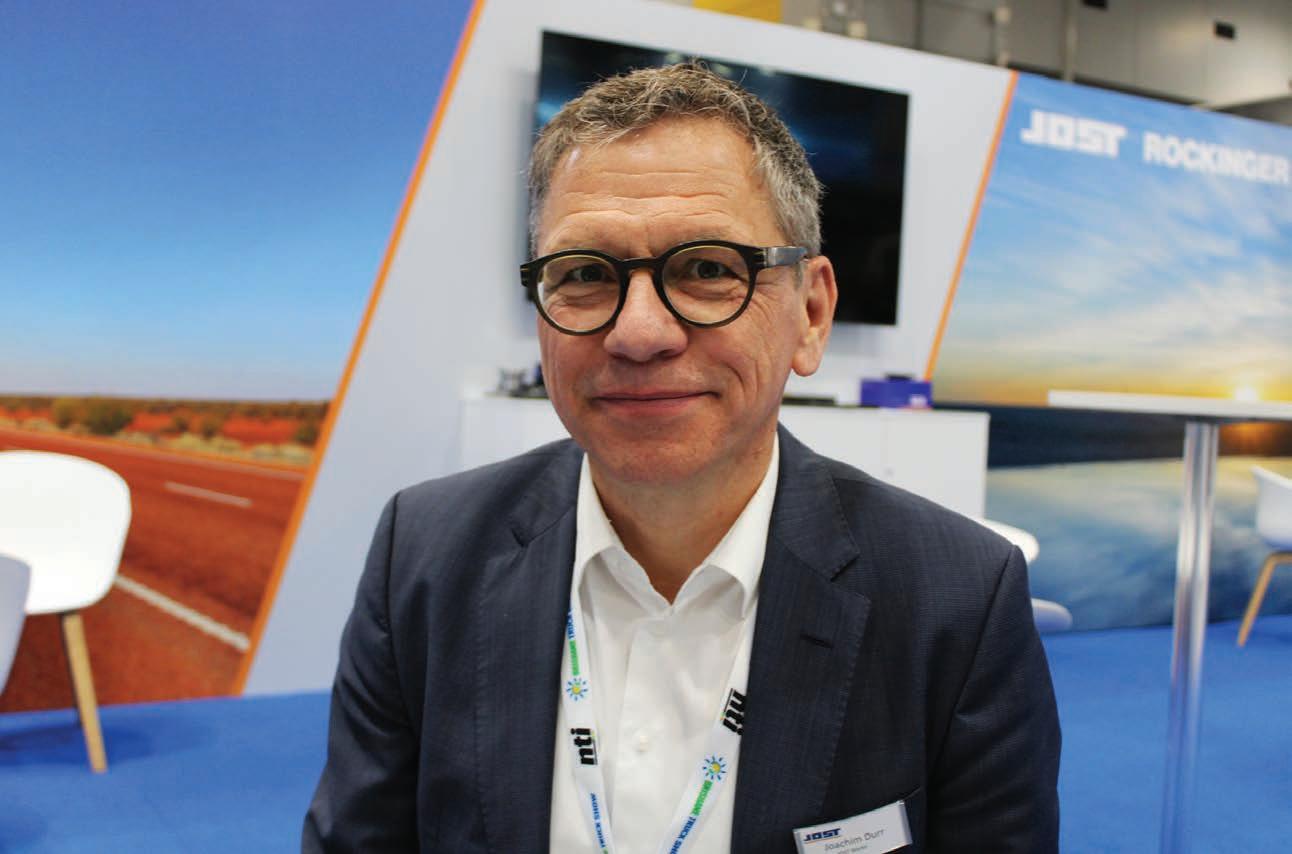
Following its success in Europe, JOST’s KKS automatic coupling system is now available for the Australian transport industry.
“We are showing the JOST KKS system here for the first time,” said JOST CEO, Joachim Dürr, at Brisbane Truck Show 2023. “There’s a lot of interest from Australian customers as safety in operations plays a big role in Australia. So, we’ve invested in it and we’ve brought it to the Australian market now.”
The KKS system automates the entire coupling and uncoupling process with the push of a button. In addition to being a big efficiency gain, it also eliminates the potential for error on a large scale.
“All of the operations where you could hurt yourself or you are exposed to risk or injury are reduced,” said Dürr. “In this industry drivers are scarce as they’re hard to find. If you lose a driver from an injury for a few months that’s easily a few $10,000 Australian dollars. Therefore, fleets really appreciate our technology as it makes their operation safer and more efficient.”
Based on first-hand experience, it also makes the job of a truck driver much more attractive.
“We have a few customers in Germany and one told me the other day that when he couples and uncouples his trailers, he only goes six kilometres and then he has to couple and uncouple them again,” said Dürr. “There are competitors of his that are exchanging trailers, and there
are drivers knocking on his door and asking if they can start with him because they look at the KKS and say, ‘I want that. Can I come and work for you?’ So, all of a sudden, he said it has helped him attract or keep good drivers because they just like to operate efficiently and safely.”
JOST also has camera systems available that can support the coupling process with its ROCKINGER couplings and fifth wheels. These tie into its solutions which were presented at the show in three categories – Assistance, which included sensor solutions and the KKS automatic coupling system; Sustainability, with weight-optimised products and biodegradable high-performance lubricant; and Digitalisation, which includes online identification systems, catalogues, spare parts, and the JOST Truck Stop.
In addition, a consistent global supply chain is
ultimately what has made JOST so successful. Its reputation for reliable products and its ability to withstand recent market conditions therefore saw opportunities for further growth follow.
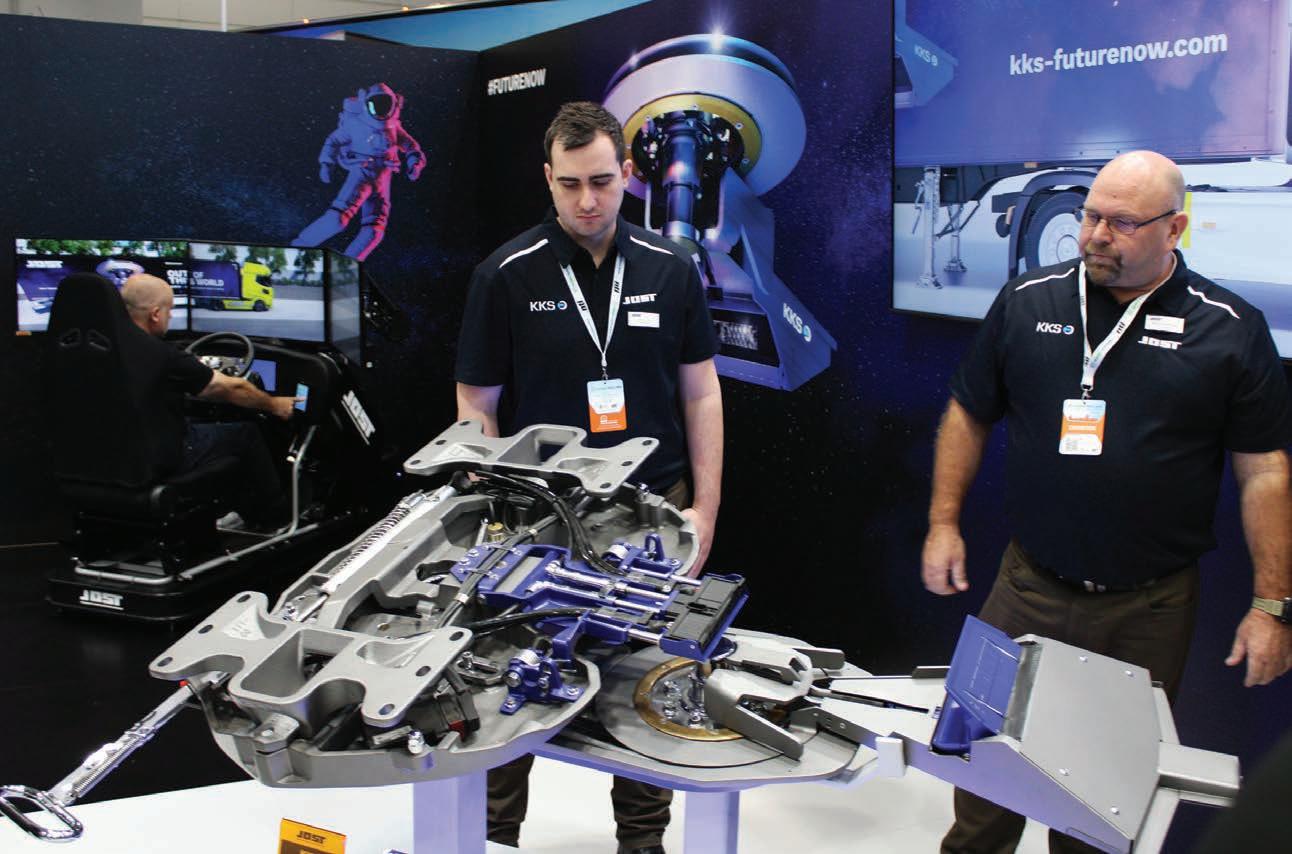
“The key is what I call local for local operations,” said Dürr. “We like the competence close to the customers and close to the market, and that helps us. We don’t have a very central organisation, and when we have these fluctuations or moments when supply chains break like they did with Covid, we’re not as exposed as some companies would be that have a more central approach.
“We have our own engineering workforce in Australia, and we produce our own fifth wheels here to make sure that we have the right application, for the right product, for the right administration. And I think the customers really benefit from that and I think they really value that.”
Dürr said everybody should be able to do their daily business without the help of their central office. In JOST’s case, it doesn’t need its Neu-Isenburg headquarters to run its operations in Australia, Brazil or Asia.
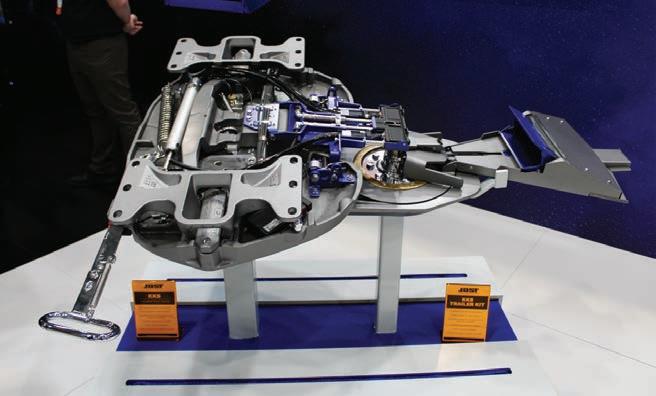
“We are not affected as somebody would be who has a more centralised operation, because we tend to have the competencies on the ground,” said Dürr. “It
is also very customer orientated. If a sales guy goes to a customer and makes a commitment, he knows that he has the ability to fulfil that commitment. He’s not going to go there and say, ‘I’ve got to ask the headquarters if I can do that’. He can just commit to something, and he knows if he will be able to commit to it or not because he has the ability to fulfil.”
The next step for JOST, according to Dürr, is to continue doing what it does best.
“We’re always developing,” he said. “Our engineers are very creative when it comes to new technology, so there’s a lot of things that we are working on that I can’t speak about. However, what we are launching for the KKS is a new integration system into the trailer that will make it easier for existing fleets to convert to KKS.”
www.jost-world.com
ROBOT REVOLUTION
The welding automation solutions offered by Valk Welding have not gone unnoticed, even in Australia. Recently, Valk Welding delivered the first of four welding robot installations to Australian trailer builder MaxiTRANS. With the deployment of welding robots, among others, MaxiTRANS aims to double its market share on the Australian continent. “Valk can be one of the few to help us successfully automate the welding production of complex parts in small numbers,” General Manager Advanced Manufacturing Brad Givvens and System Development Manager Brendan Broughton tell us.
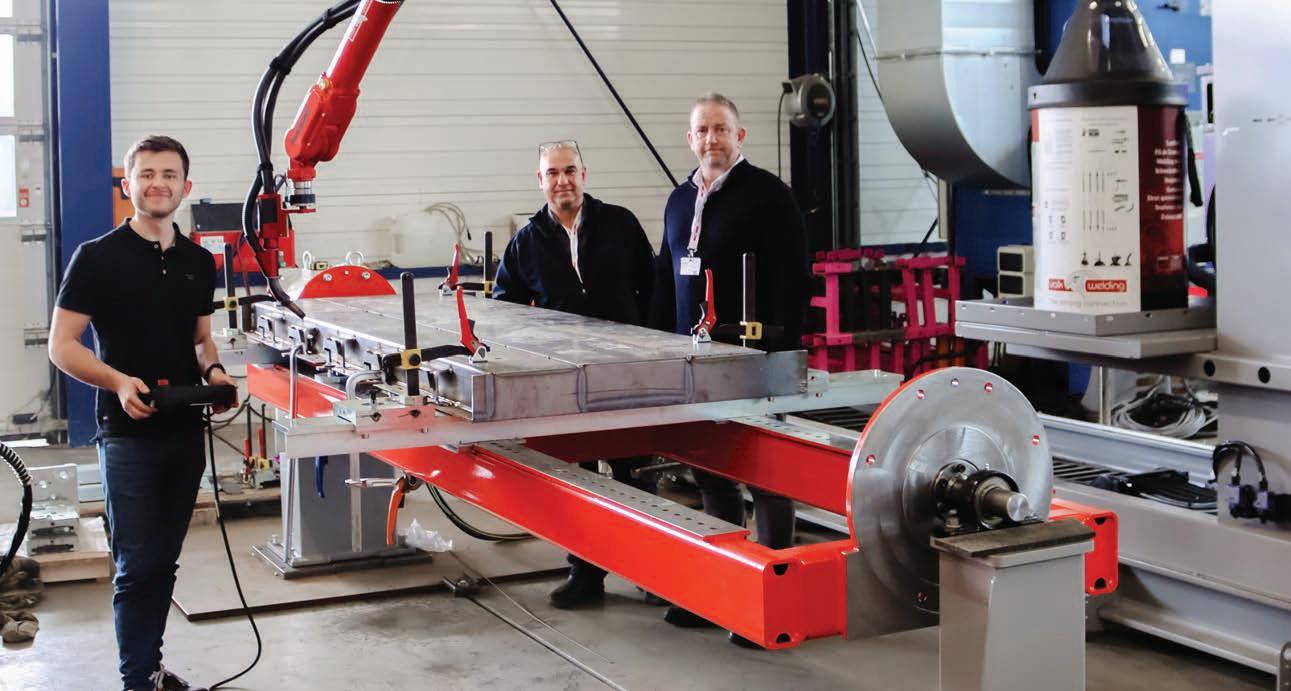
MaxiTRANS is among the largest manufacturers of trailer combinations in Australia. The
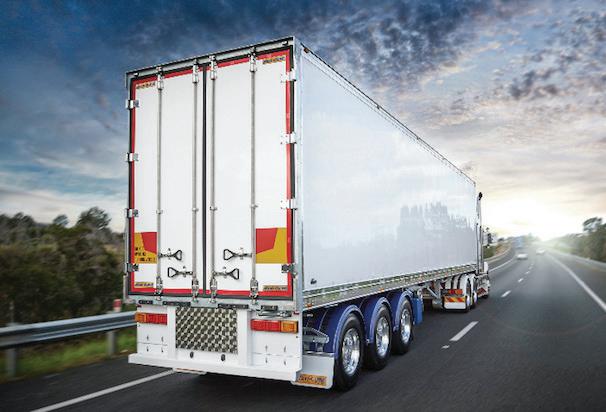
acquisition by Australian Trailer Solutions Group (ATSG), a private equity firm in which Germany’s Schmitz Cargobull is also a shareholder, offers opportunities to increase scale and expand market share. This will require investments in production technology, with a particular focus on welding production because there too, a shortage of skilled workers is a growth driver.
In contact with Valk Welding
“Because most trailers are custom built, the first step was to find the right partner. The opportunities to find a robot integrator who can successfully realise welding robotisation in a high-mix, low-volume production are virtually impossible to find in Australia,” explains Brendan Broughton. “Through the many videos Valk Welding publishes of its projects online, we became convinced that Valk Welding could provide good solutions for complex low-volume workpieces. A tour at European trailer builders confirmed our impression. In previous attempts at using welding robotisation, we got stuck with a lack of expertise in welding and programming knowledge. Instead, we need a partner who can help us further in that rather than just selling a system.”
Starting small
“Our first goal is to increase trailer production from eight to 10 per day. To this end, we submitted products we want to weld with a robot to Remco H. Valk. His advice was to start small by welding only sub-assemblies and grow from there. That way of thinking appeals to us. For us, it is not just about the technology and support, but also about the attitude and relationship,” Brad
Givvensstresses.
Training
“With the deployment of the Valk Welding welding robot systems, we are also making the switch to offline programming using 3D CAD files. In the past, we did that online, which was too time intensive. Valk Welding is also first in automatic programming using their ARP solutions. In this, we will soon be working according to the latest developments. A number of our employees will be trained for two weeks in the Valk Welding Training Centre in the Netherlands. We intend to install a separate robot for internal training, which we can also use as back-up. When necessary Valk Welding will also help us to build special robot torches, for the time being we use their standard equipment, which is also calibrated for perfect results when using off-line programming”.
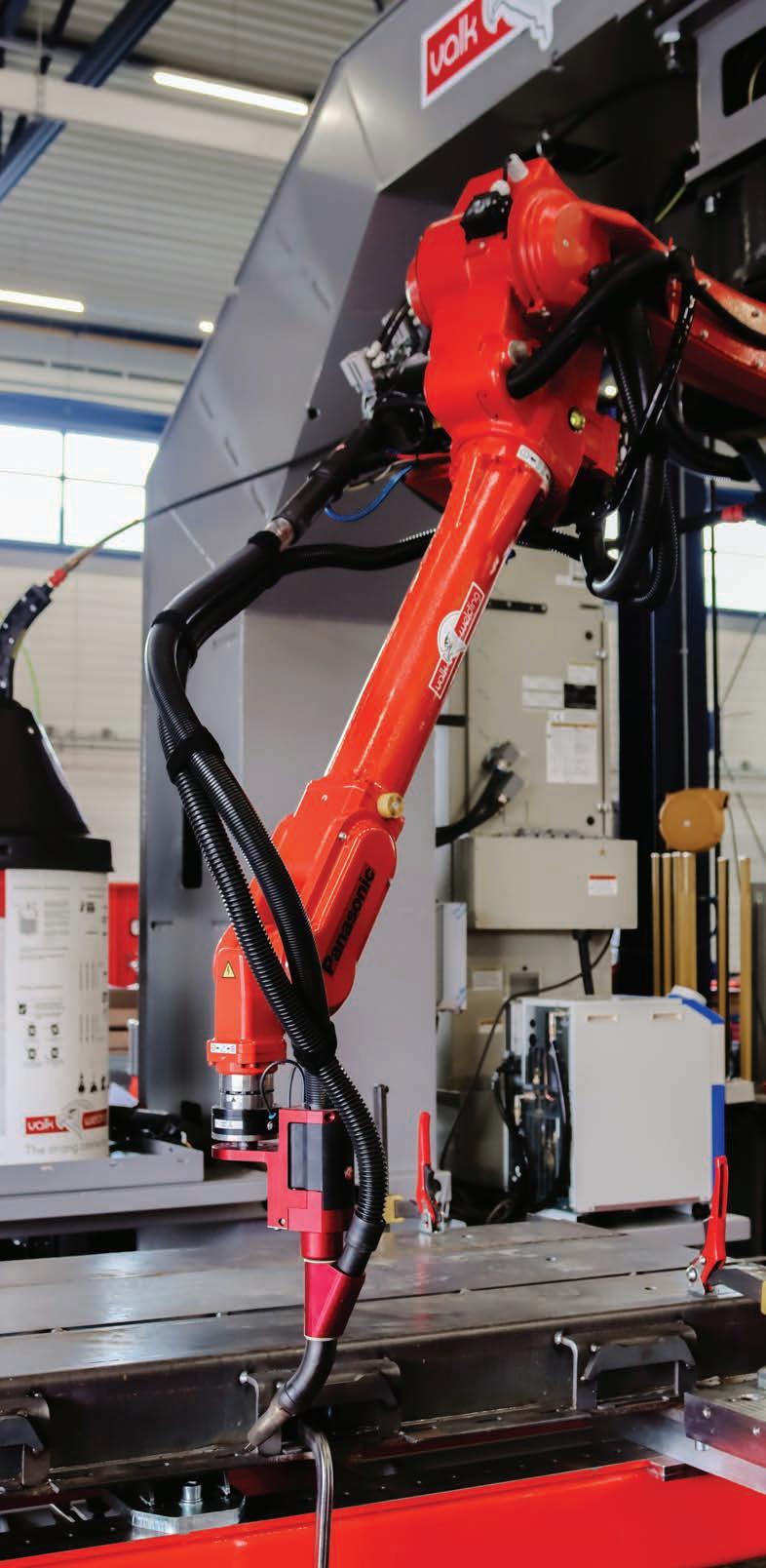
Support
For local support, Valk Welding can fall back on Orion Automation, the Panasonic dealer for Australia, which Valk has been working with for some time. Remco H. Valk: “Despite the fact that we do not expect to have to travel to Australia for an intervention, support from Orion was a prerequisite for us to start supplying projects to the Australian market and have in-the-field support.”
What is next?
“Next systems planned are for welding aluminium parts, shafts, components for tippers and a robot installation that can be used for both aluminium and steel parts,” Brad Givvens explains. “We are also investing in state-of-the art sheet metal working machines to ensure well-fitting products for the welding robots. Overall, the investments should yield an increase in quality, a reduction in production time and savings in production costs,” is Brad Givvens’ expectation.
www.maxitrans.com
www.valkwelding.com
GUIDING LIGHT
HITTING A CAREER HEIGHT AT SAF-HOLLAND MEANT A MOVE TO THE MIDDLE EAST FOR JEAN KHOURY WHO HAS TAKEN THE INDUSTRY HIGHS AND LOWS IN HIS STRIDE, BUILDING A TEAM THAT IS FORGING AHEAD WITH PRODUCTS THAT PROVE, TIME AND TIME AGAIN, TO BE IN HOT DEMAND.
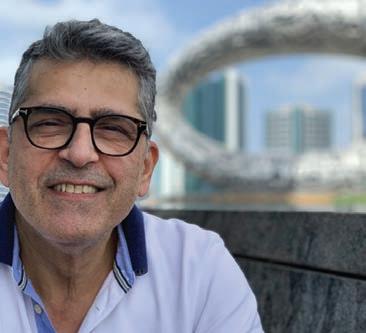
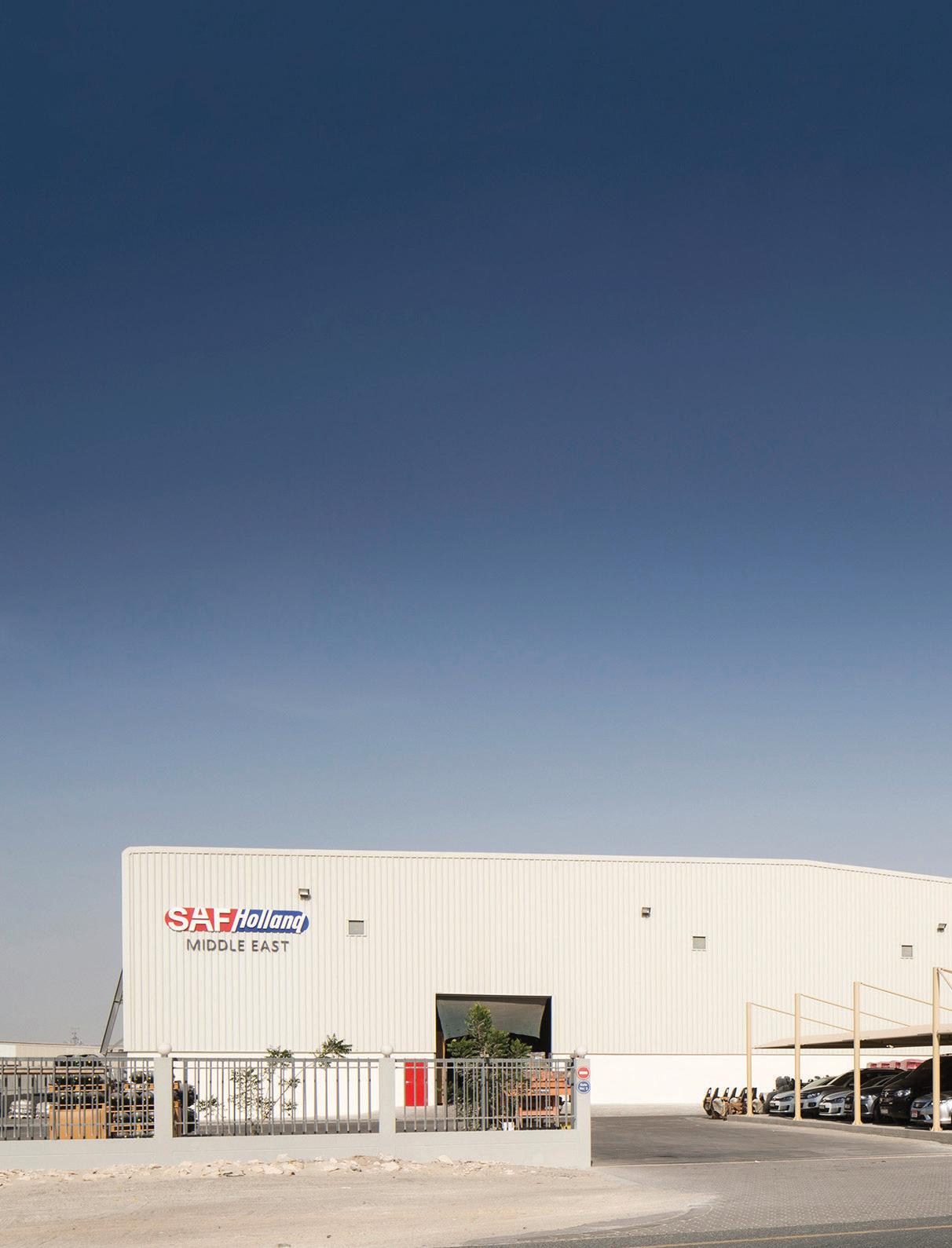
Assigned the task of overseeing a company branch in a foreign country with distinctive governing policies and procedures is not an easy feat. Arriving in the United Arab Emirates in 2017 as the newly appointed managing director of the Middle East arm of SAF-Holland, Jean Khoury had myriad challenges to face, but he also recognised just how much potential there was for SAF-Holland in his new home.
“It was an exciting journey, especially knowing that this move would be the last in my career at SAF-Holland,” he said.
Born in Lebanon, Khoury studied mechanical engineering in Germany and became a German citizen in 1990. He joined SAF-Holland, global truck and trailer equipment manufacturers, as a project engineer. After some time in the automotive industry, he returned to the company, first as the head of the application department for the Europe, Middle East and Africa area, and then as the head of its service department.
SAF INTEGRAL TECHNOLOGY
This technology involved in this two-piece brake disc is unique worldwide, protecting the material and extending the service life of the axle. The special two-stage casting process prevents cracks, and it is ideal for standard transports such as curtainsiders, coolers and containers. The special design principle extends the service life of the pads and the disc and at the same time achieves:
• More distance and less wear.
• More planning reliability.
• More efficiency.
• More economy.
Finally, in 2017, he made the permanent move to Dubai as Managing Director, serving customers in the Middle East and Africa, and guiding the branch from sales, to include service and technical support. The staff, now made up of 11 members, was offering axle and suspension systems, fifth wheels, landing gears and spare parts.
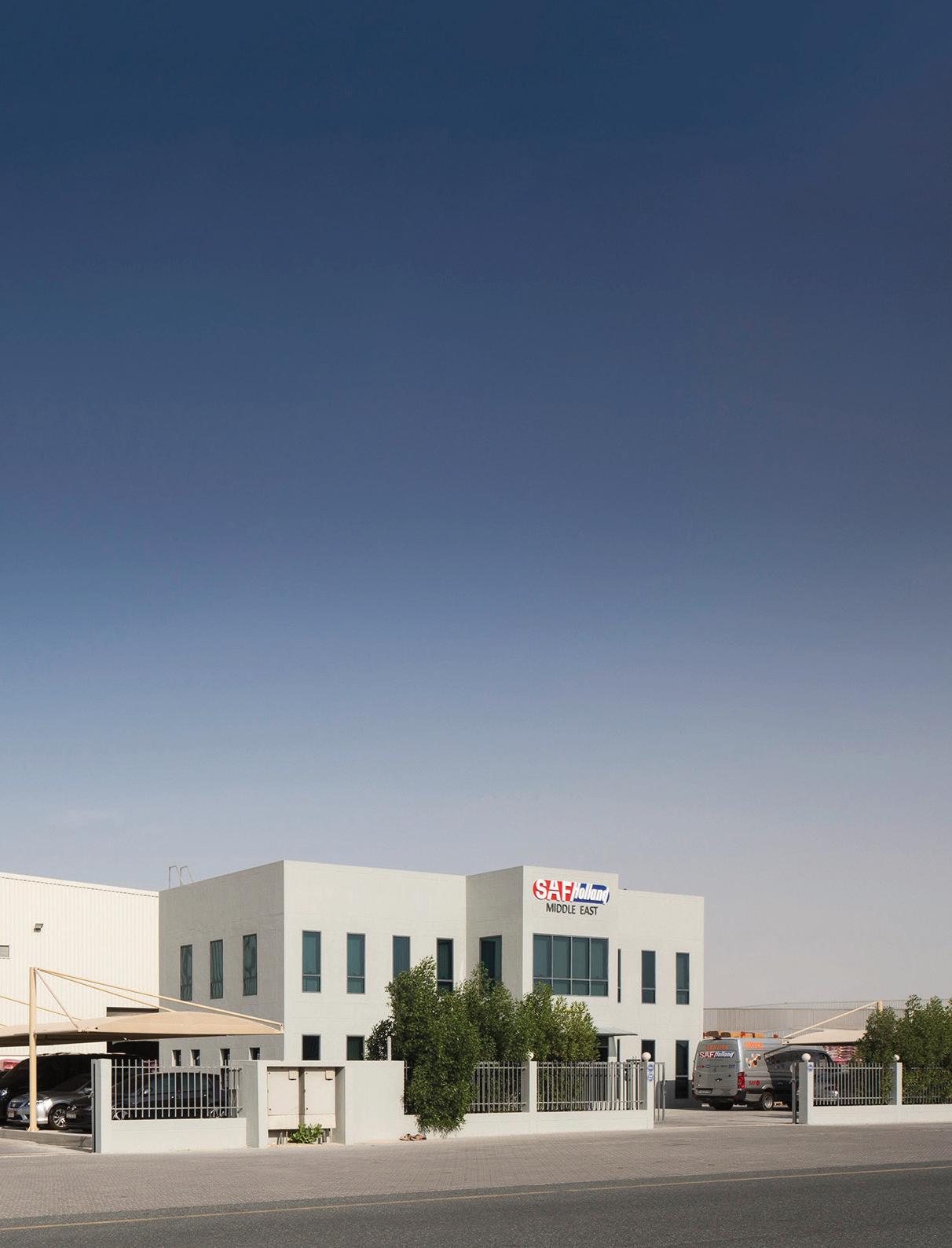
The upside for SAF-Holland was having a team on the ground who could quickly and efficiently service local customers whether it was a product, technical consultations or aftermarket services. The downside was the region’s licensing conditions and regulations, something that is still plaguing the local industry.
“Due to the lax road regulations existing in Dubai, new technologies in brake, axles, and suspensions to enhance the road safety are not going to be mandatory anytime soon,” he said, adding that second-hand trailers still out-number registered trailers.
Khoury explained that the current tipper market in the country is relatively stagnant, but the heavy equipment transport market is showing some growth in demand within the oil and gas industries.
Despite the challenges, it is clear Khoury is passionate about the industry he’s been part of for so long. That passion is never more evident than when he is talking about the products themselves and is particularly excited about what he calls the “crème de la crème product for the popular axle rate of 9,000 kg.”
The SAF Intradisc Integral is a two-part brake disc. It’s made by composite casting various specially matched materials, which offers significant economic efficiency when used on trailers.
“This really is the success story of modern air suspension and axle technology,” he said. “Intradisc unites the lightweight running gear of a trailer with the highest brake performance and is supporting the trailer industry in achieving a lean trailer production.”
Meanwhile SAF-Holland’s York axles and mechanical suspensions are the branch’s most popular products because of their reliability and quick turnaround to customers.
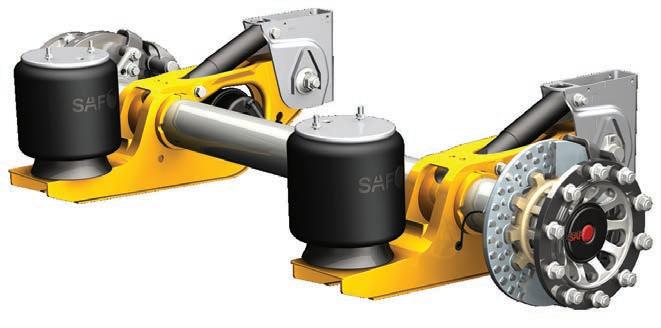
“We are keeping a reasonable stock in at our warehouse in Jebel Ali to support the fleets, reducing the uptime of the trailer,” he said.
Despite some governing and policy concerns, Khoury is optimistic that the Middle East, and specifically Dubai, is moving forward and that embracing change will one day become its biggest strength.
“Even during the last six years, I can see many changes in the traffic, infrastructure and new cities,” he said. “Change defines Dubai. No change, no Dubai.”
www.safholland.com
TRANSPORT THE BIG HIT: LOGISTICS
MORE THAN 75,000 VISITORS FROM MORE THAN 120 COUNTRIES ATTENDED THIS YEAR’S TRANSPORT LOGISTIC EVENT IN MUNICH TO SEE INNOVATION IN TRANSPORT ACROSS ALL MODES.
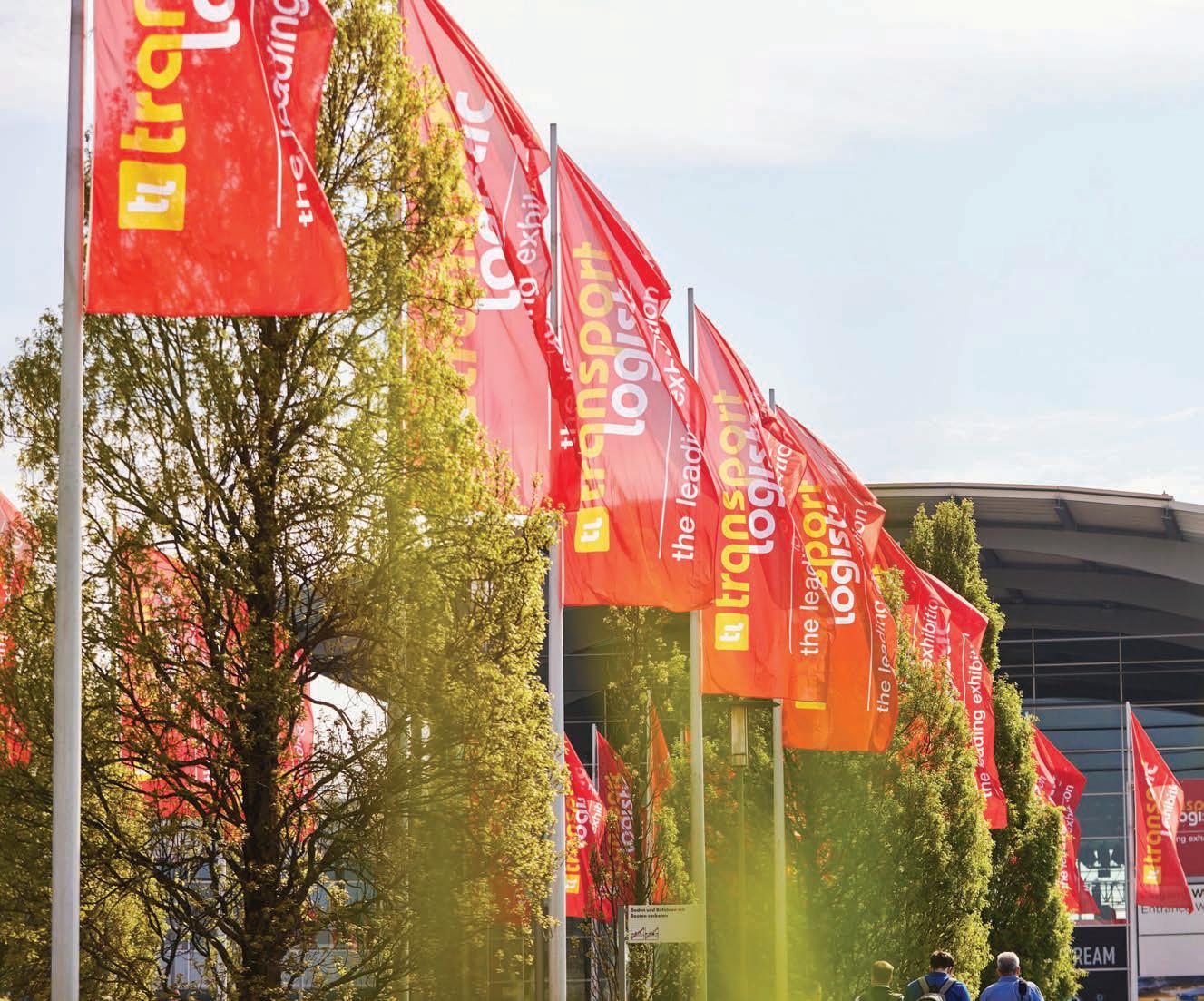
Transport Logistic is an international trade fair dedicated to logistics, mobility, IT and supply chain management. From 9-12 May, 2,320 exhibitors from 67 countries presented their concepts and solutions at the exhibition centre in Munich, Germany. The share of international visitors, according to the event organisers, rose to more than 50 per cent – a new milestone achievement.
For Messe München co-CEOs Stefan Rummel and Dr Reinhard Pfeiffer, Transport
Logistic illustrated quite clearly that the industry provides great inspiration in these challenging times.
“People want to get things moving, pushing forward, tackling the current issues together,” they said. “What we saw and experienced here in terms of ideas and technologies over the last four days
FAST FACT
With total exhibition space of 127,000 square metres (2019: 125,000 square metres), the 10 halls and the track system in the outdoor area were completely booked out. Of the 2,320 exhibitors, 1,390 came from abroad — a record share of 60 per cent. The top 10 exhibitor countries after Germany were the Netherlands, Italy, Belgium, France, Austria, China, Turkey, Spain, Poland and Great Britain.
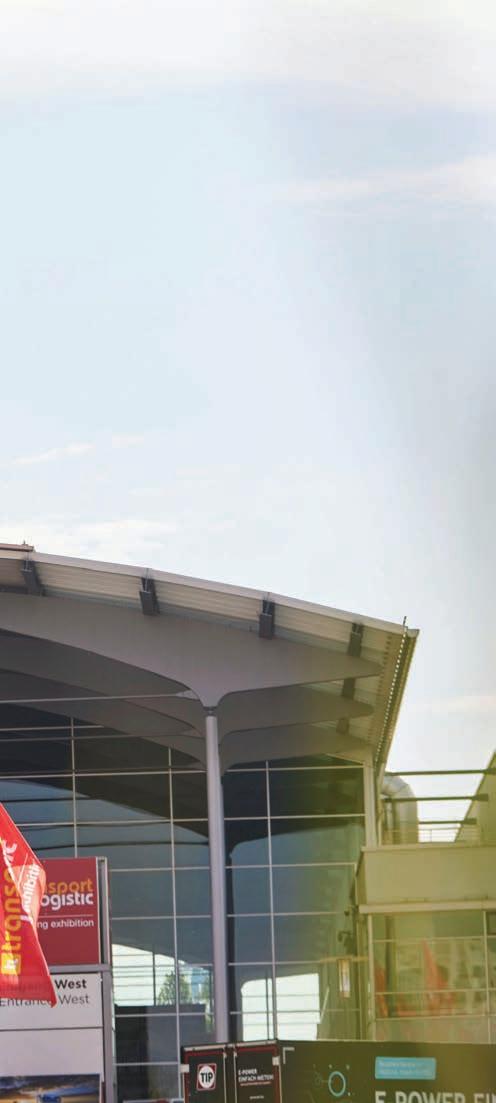
is really unique. To sum it up: nothing happens without logistics.”
Federal Minister of Transport and Digital Infrastructure, Dr Volker Wissing, was also impressed at the opening of the event.
“What you see here shows once again that the
transport and logistics industry is right up there when it comes to innovations, progress and modern technologies,” he said. “And what becomes especially clear at this trade fair is that climate goals aren’t just nice words, but rather that the industry takes them very seriously. You can see it everywhere you look, at every booth.”
Kuehne + Nagel Managing Director, Tobias Jerschke, agrees with the Minister’s appraisal. “Transport Logistic is still the world’s most important leading trade fair, for us as well of course,” he said. “This year I really liked the way the sustainability topic was a common theme running through the entire trade fair. This is a strong signal for the whole industry and will help us to focus even more precisely on this important issue.”
Andreas Schmid Group CEO, Alessandro Cacciola, said: “Messe München succeeds time and again to perfectly map the latest trends and developments in the industry. This year I perceived sustainability in particular as a strong and positive topic, and Transport Logistic is therefore a place where the future of logistics is being actively co-shaped.”
Krone Managing Director Sales & Marketing, Dr Frank Albers said Transport Logistic acts as a meeting point to interact with industry’s players.
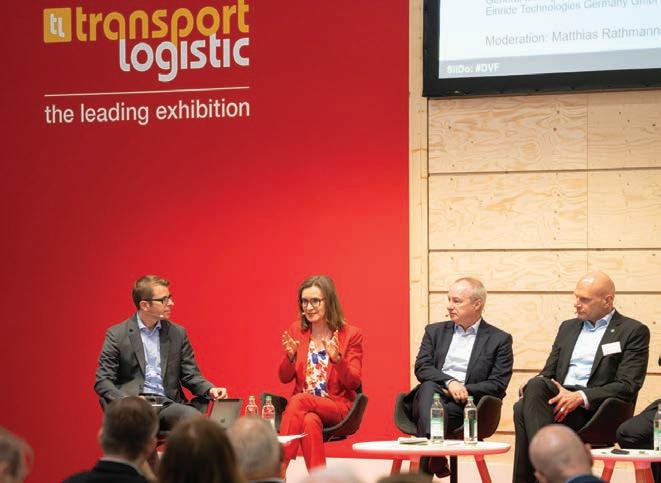
“As an international event the trade fair offers us the opportunity to present our ‘Mission Beyond Zero’ and the accompanying solutions, discuss issues and challenges and also expand our own horizons. This year our eTrailer in particular and the respective service solutions were among our top priority topics. Transport Logistic is one of the most important trade fairs for the industry. We have the chance here as a company to present our product portfolio holistically and to also share our know-how. During the four trade fair days, Transport Logistic maps the entire spectrum of the transport and logistics industry. From road haulage to maritime logistics and air freight through to intralogistics and rail transport. This allows us to enter into dialogue with the experts and decision-makers of the various modes of transport and to discuss the necessary topics, so we can make the entire industry more sustainable.”
Meanwhile, Hellmann Worldwide Logistics CEO, Reiner Heiken, said the event is an excellent platform for networking.
“Over four days we meet customers and partners from all over the world here,” he said. “It is also inspiring for us, time and again, to take part in so many panels and discussions.”
For DP World CCO Logistics Europe, Markus Kanis, having a presence at Transport Logistic is incredibly important.
“It’s a unique opportunity to showcase to our partners, customers, and the industry as a whole the added value we can bring to the table as we establish ourselves as an end-to-end
logistics solutions provider, making trade flow across Europe and beyond.”
Sustainable digital solutions for increased transport efficiency: Schmitz Cargobull
Schmitz Cargobull showcased its suite of products and solutions, emphasising sustainable, reliable and safe freight transportation. These enable customers to achieve maximum efficiency and transparency in the supply chain and also connect all relevant parties in the transport process.
“Anyone trying to advance the level of digitalisation in their processes will increase the efficiency of their transport business as well as their profitability,” the OEM said in a statement. “And if they are designing these transport processes to be sustainable, they will also reduce their emissions and environmental footprint.”
At Transport Logistic 2023, Schmitz Cargobull demonstrated how its products and digital services make the daily working routines of dispatchers, fleet managers and drivers easier and how sustainable digital products can be used in practice to generate profits.
The EcoGeneration of semi-trailers flaunt aerodynamic design and have been on the road since 2021. This year, the S.CS EcoVARIOS curtainsider was on show. It features an internal height of 3m and a total height of 4m. It is particularly well-suited to high-volume and automotive transport tasks where three pallet cages have to be transported on top of one another. Both the front and rear sections of the body can be flexibly adjusted, too.
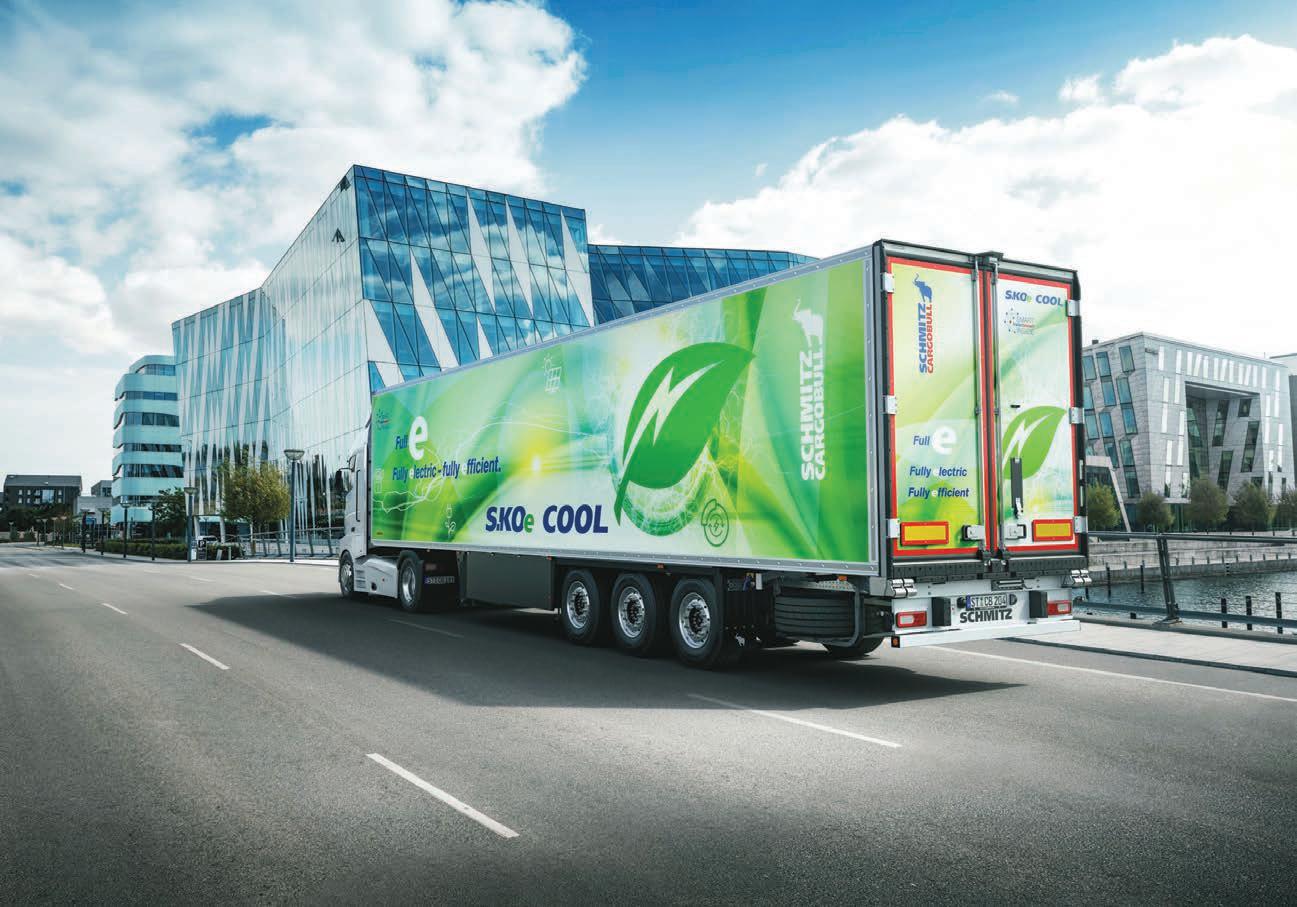
The aerodynamic trailers reduce drag, thus lowering fuel consumption and carbon emissions. In practice, users have been reportedly able to achieve savings of way above 5.0 per cent. This concept offers high savings potential, particularly for payload-intensive goods. The lifting function for the rear enables the trailer to be raised easily if the entire cargo area is required. And this is achieved without any significant change in trailer functionalities,
transport performance and the usual handling. The effectiveness of the aerodynamic body in providing excellent sustainability through maximum fuel savings does not come at the cost of expensive, easily damaged attachments.
Looking at refrigerated transport, Schmitz Cargobull has the S.KO Cool which comes with security features that comply with TAPA TSR1 standards. The Transported Asset Protection Association (TAPA) is an organisation made up of manufacturers, logistics service providers, freight forwarders and law enforcement authorities that applies proven methods and procedures to improve the security of valuable assets around the world. Its goal is to reduce losses in the supply chain. By complying with TSR1 standards, the Schmitz Cargobull S.KO COOL refrigerated semi-trailer meets TAPA’s highest benchmark.
The OEM also has additional equipment for supporting the safety of vehicles and goods. These include flashing side marking lights (required by law in Germany from 2024), dynamic ramp protection, immobilisers and a pharma utility package as well as CIS Cargobull Interface System and solar panels.
On trend with electrification, the all-electric S.KOe COOL box body semi-trailer is equipped with a fully electric cooling unit with integrated power electronics, a battery system and an axle generator, and thus operates emissions-free. The electrified semi-trailer is also extremely quiet, enabling early-morning and late-evening deliveries in urban areas.
The electrically operated S.CU ep85 cooling unit is designed to cool and heat freight without generating any emissions. It offers a cooling output of up to 15,800 W and a heating output of 10,500 W. Batteries on the landing gear replace the diesel tank and also offer customers the chance to install an extra pallet cage with space for 36 euro pallets. The payload of the fully electric reefer box body with a battery and electric axle is around the same as that of a refrigerated semi-trailer with a diesel unit. The additional weight of the battery in the fully electric refrigerated semi-trailer is almost completely balanced out by the removal of the generator.
The electrified Schmitz Cargobull trailer axle recuperates energy during braking, among other processes, and thus extends the cooling unit’s operating time or reduces the recharging times of the battery via the power grid. This also reduces
waiting times at distribution centres. An intelligent battery charging management function ensures that the battery’s charge level remains as high as possible to provide greater reliability when the semi-trailer is stationary, such as in traffic jams.
Thanks to three pre-defined modes (ECO, STANDARD and SAFE), the semi-trailer can be optimised according to the customer’s usage conditions and objectives. ECO mode ensures maximum energy and cost efficiency during refrigerated transport. STANDARD mode delivers cost-efficient protection against cargo spoilage, while SAFE mode provides maximum protection against spoilage. The modes can be selected via the display and keypad on the transport cooling unit or via the TrailerConnect portal and app.
The generator performance of the electrified axle is precisely matched to the requirements of the cooling unit. The system is fully integrated into the Schmitz Cargobull telematics system, enabling the respective system status such as the battery charge level, remaining range and remaining charging time, to be monitored via the telematics portal.
Smart assistance systems for transport safety and efficiency: JOST
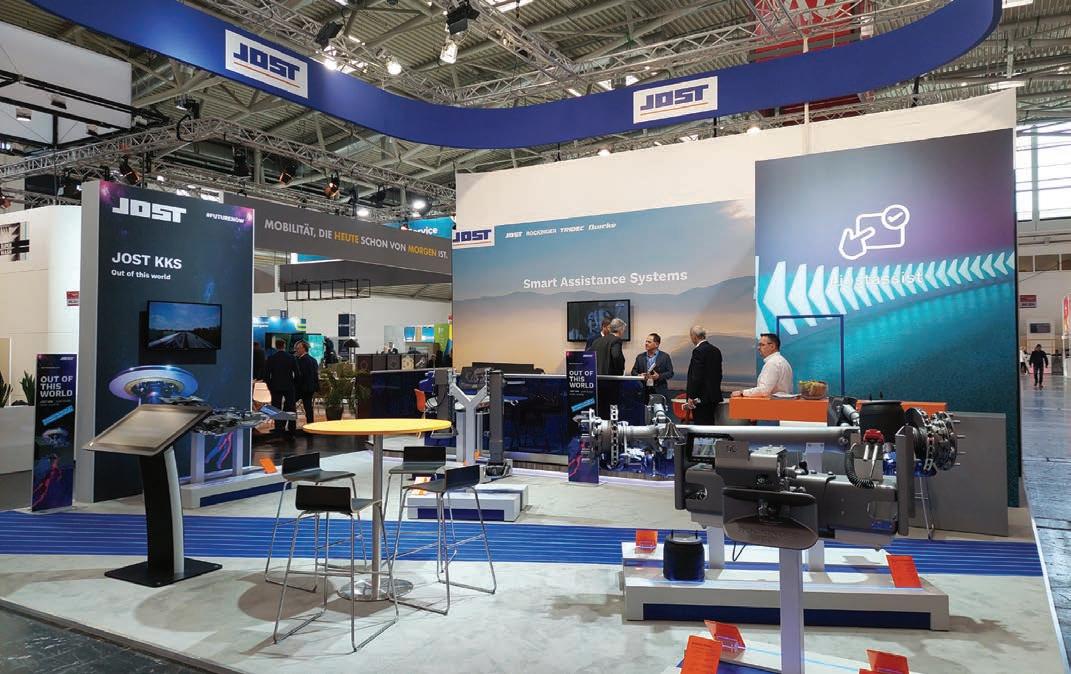
The job of a heavy vehicle operator can be challenging however equipment specialist, JOST, has some new tools in its arsenal to make life a little easier. At Transport Logistic, JOST championed the KSS automatic coupling system, the King Pin Finder assistance system, the Drawbar Finder upgrade kit and the weight-optimised DCA Weightmaster Plus axle. The transport industry is an important pillar of the national and international economy. JOST develops advanced and numerous products to enable the industry to face current challenges such as the driver shortage.
“JOST assistance systems increase the efficiency of a fleet and make the job of truck drivers easier,” said Dietmar Franke, Head of Trailer Germany, Austria, Switzerland at JOST. “Less stress and more safety during the coupling process of the semi-trailer make the job more attractive. The KKS enables automatic operation and monitoring of the entire
coupling and uncoupling process by remote control from the driver’s cab. Drawbar Finder and King Pin Finder, which can be integrated directly in the dashboard, are a practical support during coupling and hitching up. We are looking forward to the transport logistic as visitors can experience the solutions for themselves on our stand in the hall and on the outdoor exhibition area.”
The KKS enables drivers to couple and uncouple semi-trailers via remote control without leaving the driver’s cabin, automatically, safely and quickly. The driver is guided through the entire coupling process, with sensor technology providing live information on the KKS remote control throughout every step of the process. For example, the support plate sensor indicates that the trailer plate is touching and the position of the king pin is also monitored by sensors. Climbing out of the cabin to manually open the fifth wheel, cranking down the landing gear and manually connecting the spiral cable, air and brake connections are all a thing of the past for drivers.
JOST presented the King Pin Finder, a camera integrated in the fifth wheel coupling, as a new product at Transport Logistic. The optimal position of the camera allows the coupling process to be precisely monitored and carried out on the dashboard in the driver’s cabin. The JOST King Pin Finder provides a precise view of the king pin and assists with reverse manoeuvring by displaying the live camera image. This enables the driver to find the ideal coupling height and optimally align the tractor. The ROCKINGER Drawbar Finder can likewise be integrated directly into the dashboard and supports the coupling process via camera. Here, a
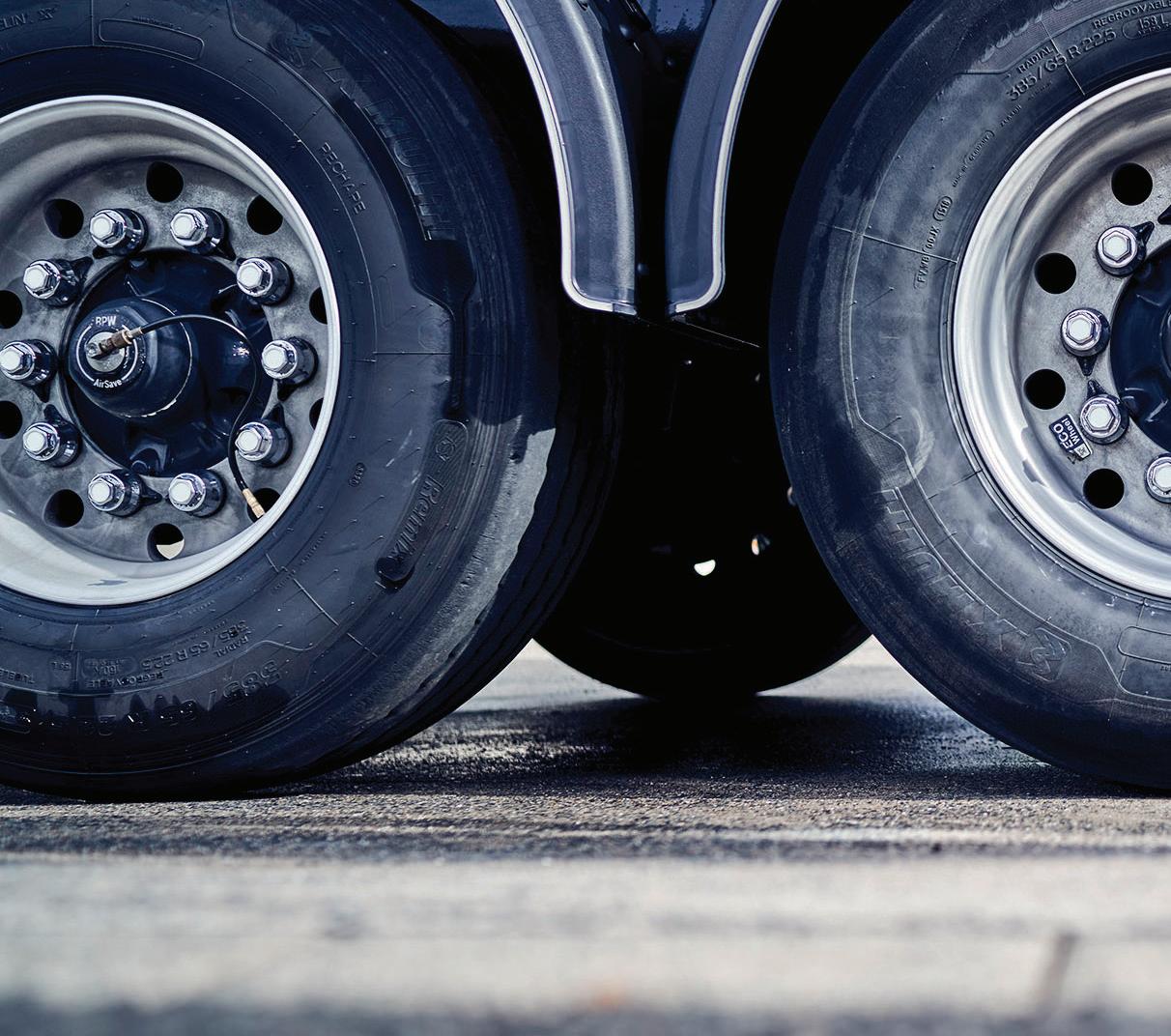
camera sits in a central and protected position above the towing hitch, functioning as an extra set of eyes and preventing misalignment of the drawbar eye. By providing both horizontal and vertical guidance, it enables precise coupling. The driver no longer needs to get out of the truck to check that the drawbar eye is aligned correctly. The assistance systems provide support through their intuitive handling and help to avoid accidents and damage.
AI-based predictive maintenance and more: BPW The BPW Group focused its trade fair presentation
on efficiency, safety and sustainability with the overarching theme of ‘Solutions for driving value in transport’.
In terms of fleet efficiency, BPW and idem telematics presented details of a new generation of running gear for the first time, which will pave the way to AI-supported predictive maintenance and revolutionise maintenance management by using telematics. The running gear is the basis for the intelligent trailer of the future, which senses the condition of all relevant running gear components itself, predicts their condition, organises maintenance appointments at the optimal time itself – and reliably orders the right spare parts to the workshop. Such efficient maintenance management is a real benefit for fleet managers, who will have more time for other activities.
On the subject of reducing carbon emissions, BPW unveiled the eTransport – an electrically driven axle that has been specially developed for installation in distribution vehicles in innercity transport traffic and can be individually adapted to the requirements of any fleet. Even
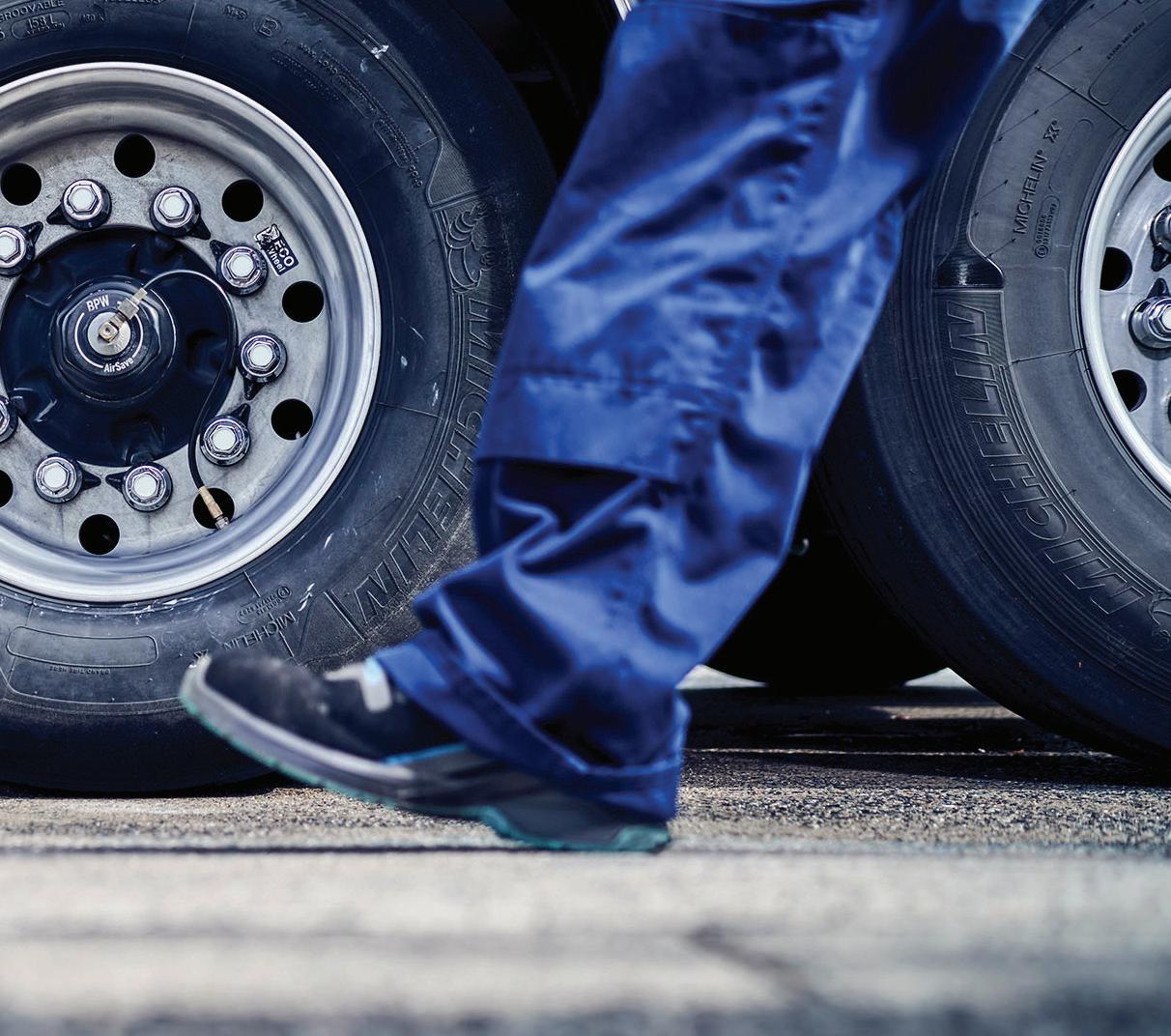
larger vehicle classes over 7.5 tonnes can be equipped with eTransport thanks to the scalable concept.
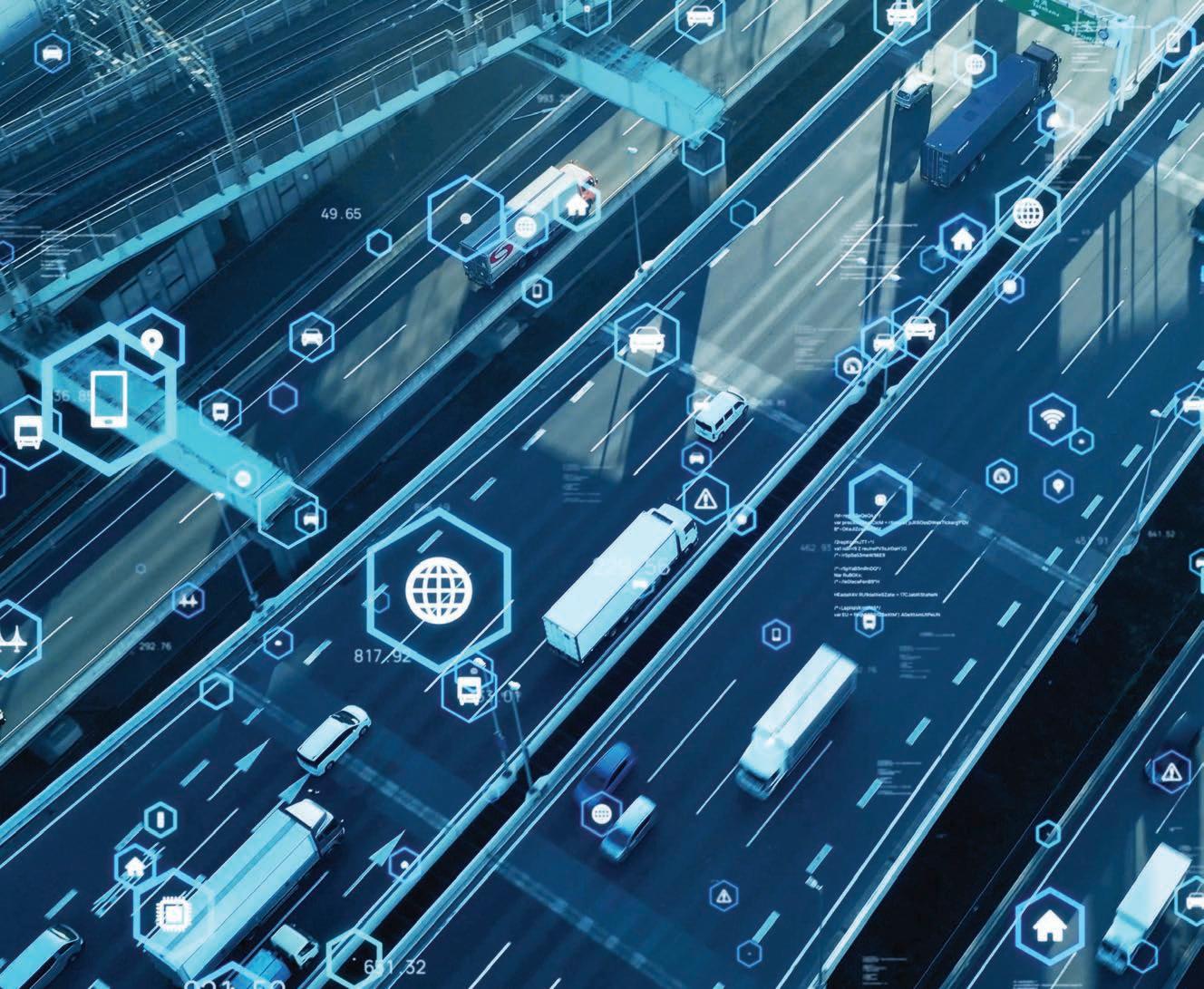
BPW’s ePower axle generates energy during driving and deceleration via two generators integrated into the axle, which can be used to operate hybrid or fully electric refrigeration units. In this way, the haulier saves up to 4,000 litres of diesel per year and trailer for the operation of the refrigeration unit, depending on the configuration. As an overall system, ePower fits seamlessly into BPW’s axle and running gear architecture, but also into the cooling technologies of the development partner Thermo King. The entire system was developed by both partners as an integrated, modular overall solution.
There was even talk of ongoing innovation with load restraint technologies. Transport damage caused by poorly secured cargo is an everyday occurrence in the transport industry. Over and over again, sliding and tipping lorries cause serious accidents and damage to the load. With the intelligent iGurt load securing system, BPW is tackling one of the main causes: the handy sensor measures the pre-tensioning force during lashing and while driving and displays it on the housing, the driver’s smartphone and, if desired, also in the telematics portal. In this way, correct load securing can be monitored in real time and seamlessly documented; damage caused by excessive tension can also be reliably avoided.
Also, maintenance management is one of the most important and at the same time most demanding tasks of the fleet manager: legal inspection regulations, manufacturers’ maintenance schedules or even status and fault messages of the vehicles themselves must always be kept under control, and maintenance must be skilfully planned and documented. These tasks are now taken over by the intelligent maintenance calendar – which considerably relieves the burden on the fleet manager. But this is just the beginning: in the future, it will no longer be rigid maintenance dates or mileage that decide whether and when vehicle components need to be serviced, but increasingly intelligent sensors and algorithms. Among other things, idem telematics’ cargofleet 3 already records tyre pressure and brake pad wear and triggers warnings if necessary: a first step towards
FAST FACT
predictive/preventative maintenance. In Munich, the company will also be showing for the first time the AI-based evaluation of braking processes, which plans maintenance in line with demand and thus with optimum economic efficiency.
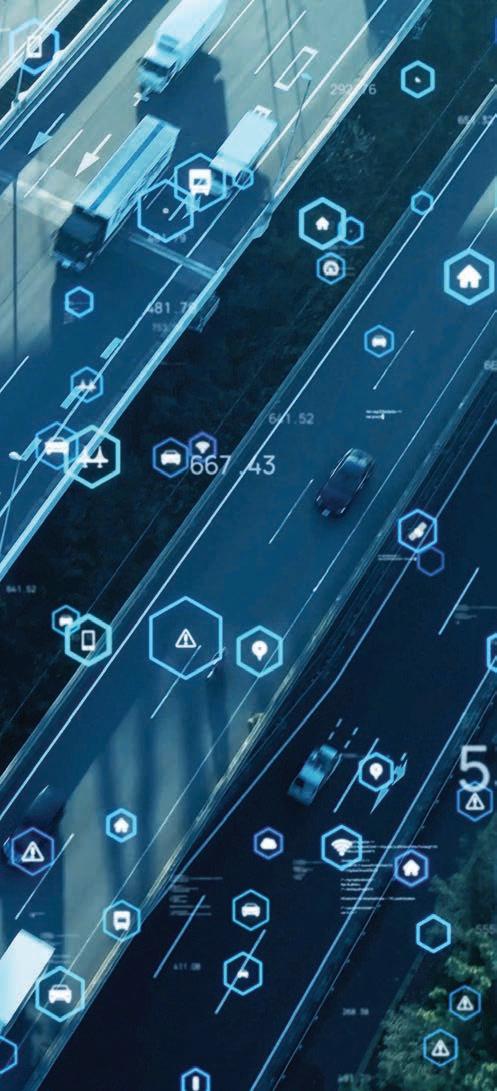
Another trade fair highlight is order-based route management, which enables transport companies
to manage data on a route and order basis and to pass on selected information – such as the calculated arrival time – to end customers in a controlled manner. In this way, vehicle operators can make their transports more efficient and expand their services.
Independence including data sovereignty make idem telematics’ truck telematics a successful product: it is also more versatile and can be customised. Among other things, the range of functions includes the download and archiving of tacho data, the control of driving/resting and working times, an infringement evaluation and naturally the integration of trailer cooling data.
Jens Zeller, idem telematics Managing Director, said: “Artificial intelligence is justifiably the hot topic in the industry. The whole world is currently talking about the possibilities of text and image recognition – yet AI can unleash its full potential in complex, mobile systems such as transport. With cargofleet 3, we have established a recognised industry standard for the transport and logistics sector that creates a stable basis for the use of AI. This is particularly important for transport companies that value investment security. At the same time, idem telematics offers the vehicle and logistics industry and application developers a powerful, system-open platform to successfully establish AI-based solutions in the market.”
BPW has also revealed the next development stage of trailer running gear at Transport Logistic. With its holistic approach to digitalisation, BPW has already fundamentally changed the way trailer running gears are developed, built and maintained. Now the innovation leader is advancing the digital DNA of its running gears to artificial consciousness – the trailer of the future thinks independently and manages itself. BPW revealed the first details of the new generation iC Plus running gear at Transport Logistic.
‘Born digital’ – under this concept, BPW has assigned digital DNA to all of its running gear components, from the axle to the last screw. This DNA accompanies the entire life cycle of the trailer – from design and production to everyday use as well as maintenance and spare parts supply – thus ensuring unrivalled efficiency.
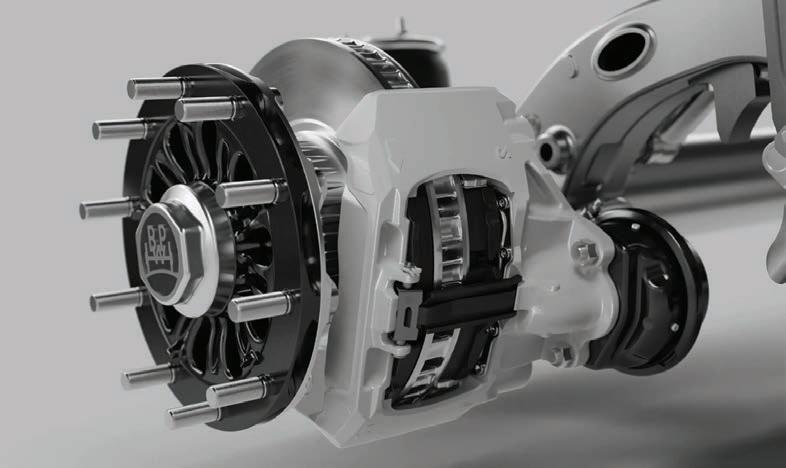
Thore Bakker, General Manager Trailer Solutions and Mobility Services at BPW in Wiehl, said: “The new generation of running gears iC Plus is the starting point for holistic digitalisation and intelligent networking of the entire vehicle life. It enables digital maintenance management as a first step and is developing further into a self-monitoring vehicle that optimally controls its maintenance. In future, on this basis, we also want to ensure that AI-supported analyses of road conditions and load can be used to optimise economy and safety.”
www.transportlogistic.de
CALIFORNIA
BY 2024, VEHICLES PURCHASED FOR TRANSPORT USE IN CALIFORNIA WILL HAVE TO START TRANSITIONING TO ZEROEMISSIONS. IT IS THE FIRST OF VARIOUS REGULATIONS SET TO UNFOLD OVER THE NEXT 20 YEARS, PITTING INDUSTRY AGAINST POLICY. ARE THESE DRACONIAN ENVIRONMENTAL LAWS OUT TO UNFAIRLY PUNISH TRANSPORT, OR IS IT SIMPLY THE WAY OF THE WORLD TODAY?
California has an enormous role in international trade. It also has a big air pollution problem. These two facts have come to a head with politicians and environmental bodies determined to deal with this environmental crisis. But the transport industry is feeling maligned and say the approach is irresponsible, will drive businesses into bankruptcy and destroy livelihoods.
In April this year, California’s air regulator, the California Air Resources Board (CARB) passed a new law that demands what some see as a major upheaval to the supply chain – The Advanced Clean Fleet rules.
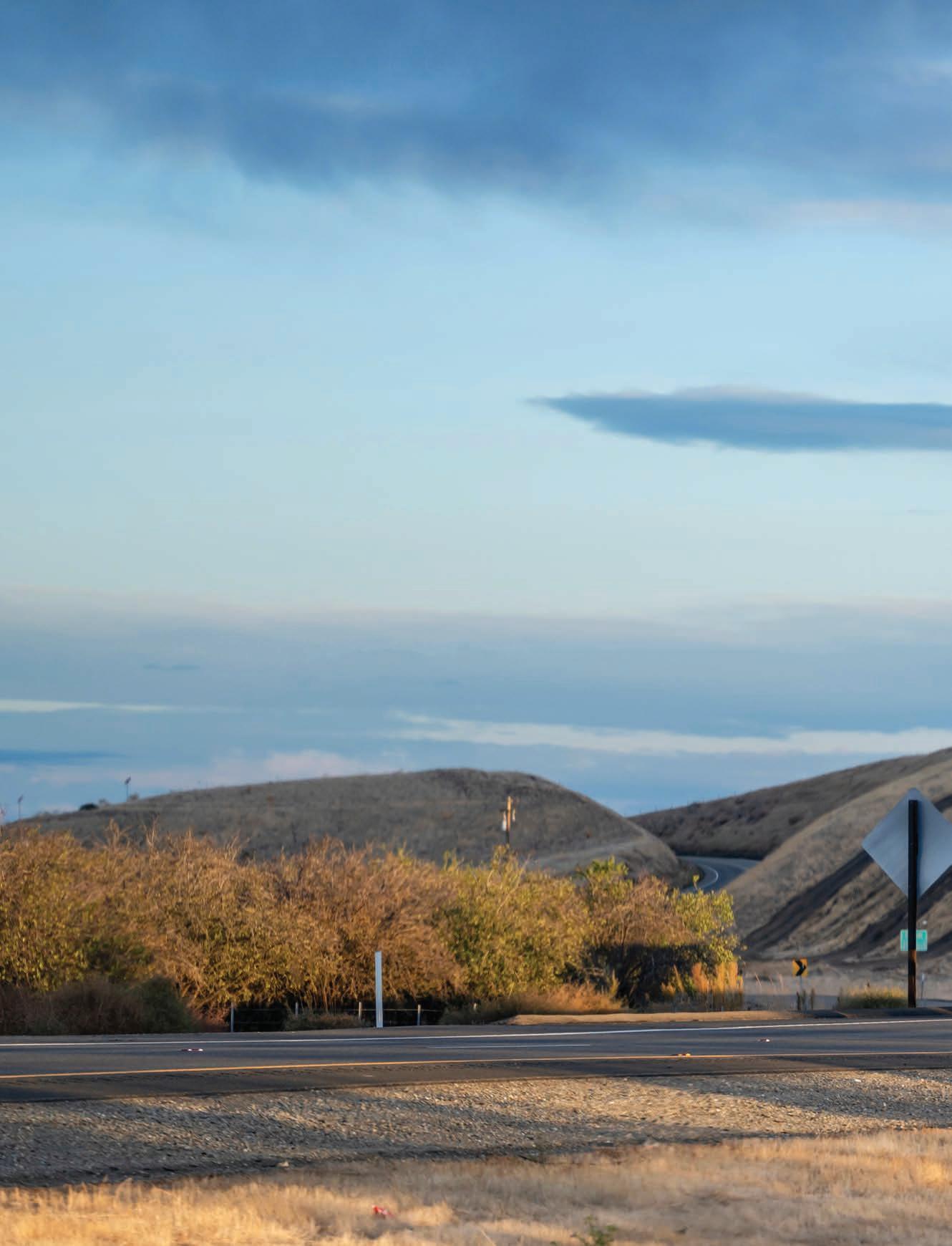
From 2024, any trucking or shipping company that purchases a new truck is required to buy a model powered by batteries or hydrogen fuel cells. By 2035, all large trucks that move goods between ports, rail yards and distribution centres, must be a zero-emission vehicle, due to the impact truck traffic has on residents living near heavily trafficked corridors.
It is all part of California Governor Gavin Newsom’s plan to fully transition all trucks in the state to zero emissions by 2045. And they aren’t just picking on trucks. California wants to ban the sale of petrol-powered cars by 2035 as well – a nationwide first. It’s all part of a lofty goal to reduce its pollution by 85 per cent by 2045.
In many ways, these decisions shouldn’t be surprising. California has long been at the forefront of environmental protection. It was where ‘Earth Day’ – a day to consider the world’s environment and support laws to protect it – was created in the
DREAMS
1960s. In the 1970s, California passed a number of landmark environmental laws, including the California Clean Air Act and the California Coastal Act. It also takes its civic duty seriously, especially considering it has the world’s fifth largest economy. Despite these decades of effort from both government and grassroot organisations, California appears to be losing its air pollution battle.
Air quality conundrum
According to data from the Environmental Protection Agency and the American Lung Association, California has six out of 10 of the most polluted cities in the US. These include the
top four – Los Angeles, Bakersfield, Fresno and Visalia.
CARB’s air monitoring data shows that more than 90 per cent of Californians breathe unhealthy levels of one or more air pollutants during some part of the year.
While there are a variety of arguable reasons for this including its geography, weather patterns and climate, there is little question that trucks are the largest single source of vehicle air pollution in the state. They are responsible for more than 35 per cent of the state’s transportation-generated nitrogen oxide emissions and a quarter of the state’s on-road greenhouse gas emissions, despite only representing six per cent of vehicles on California’s roads.
CARB says, that over time, the Advanced Clean Fleet Rule will generate $26.6 billion USD in health savings from reduced asthma attacks and respiratory illness.
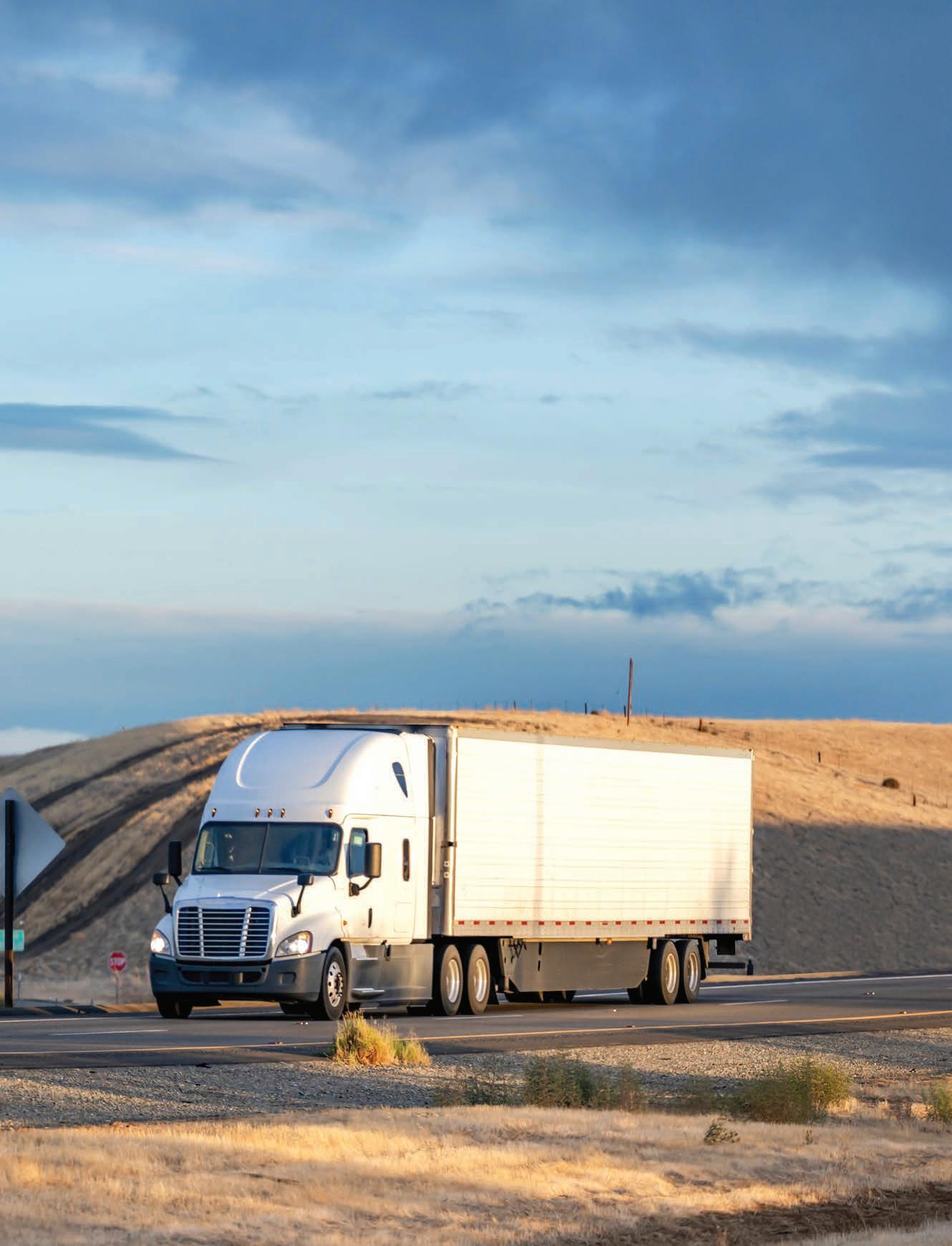
Where trucking is king
and the Port of Long beach, handling 31 per cent of all American container based imports and exports.
A large portion of trucking companies in California are either small or owner-operators. In fact, small business owners transport nearly a third of the state’s containerised goods and they say they can’t afford the investment to upgrade their vehicles.
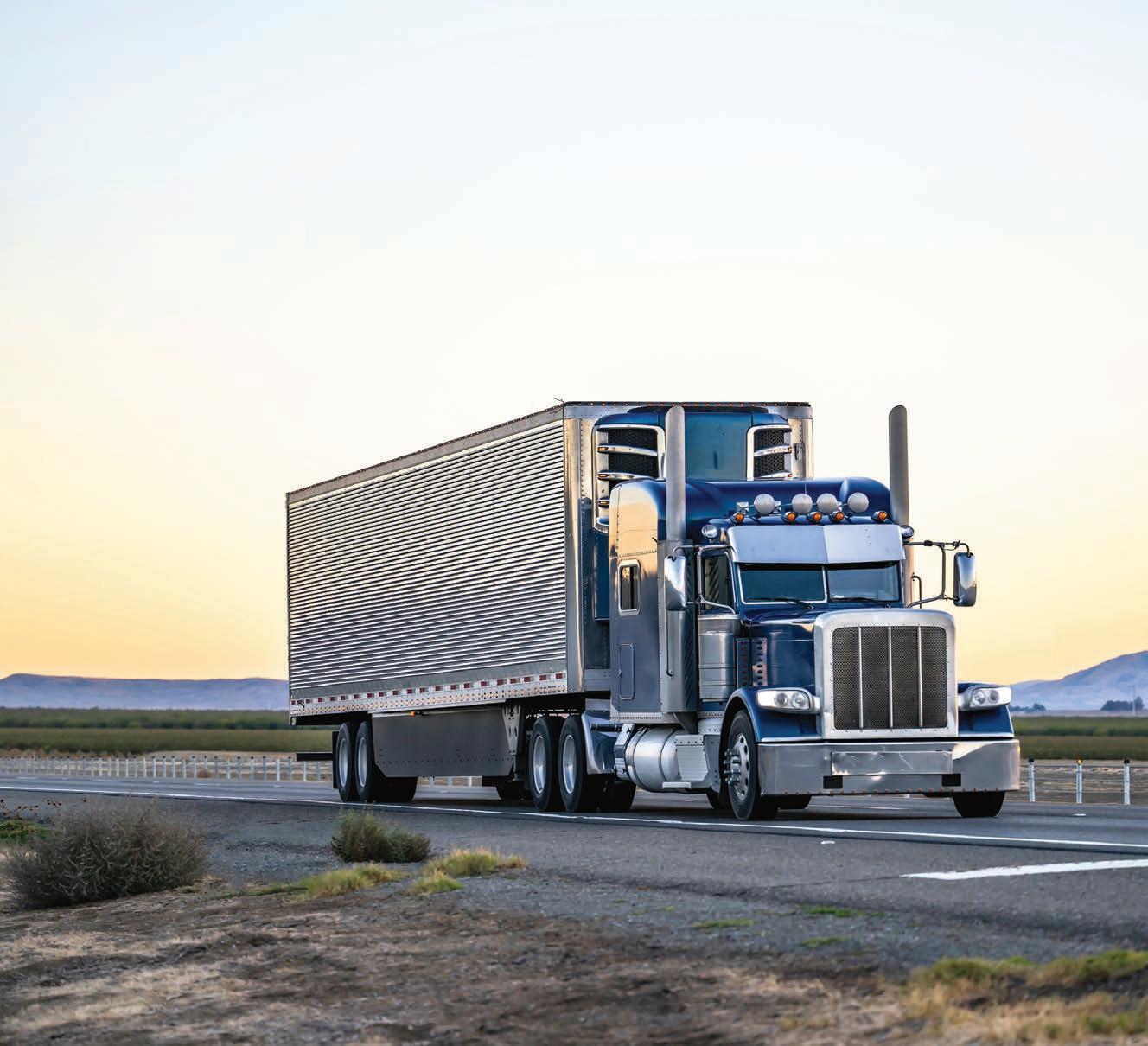
Even with generous state and federal funding and tax credits for owners, that can cut the cost of expensive battery-powered or hydrogen trucks in half, truckers say it’s still a financial stretch.
The American Trucking Association (ATA) has been one of the most outspoken critics of the Advanced Clean Fleets regulation, saying it has unrealistic targets, unachievable timelines and ignores the fact that clean trucks are early-stage technology and the infrastructure to support them isn’t there.
“Fleets are just beginning to understand what it takes to successfully operate these trucks,”
ATA President and CEO, Chris Spear, said in a statement. “What they have learned so far is the vehicles are significantly more expensive, charging and refuelling infrastructure is non-existent and zero-emission vehicles are not necessarily a onefor-one replacement—meaning more trucks will be needed on California roads to move the same amount of freight.”
The Harbor Trucking Association, which represents freight industry companies working out of West Coast ports, says it’s all for transforming the transport industry to zero emission, but the deadline simply won’t work.
“If we want to see sustainable emission reductions that are meant to protect the health of local communities, we will need a more targeted approach that truly takes into account the woeful lack of fuelling infrastructure for heavy duty zero-emission vehicles, along with the technical limitations of available equipment,” said Matt Schrap, CEO of the Harbor Trucking Association.
Despite the push back, the plan does have its supporters including other American states, thirteen of which have pledged to match or consider matching California’s clean truck policies.
Is there a plan?
There are legitimate questions surrounding how the plan will all roll out. Truckers are concerned about both the cost and lack of infrastructure and, even if there are enough charging stations for everyone, experts are questioning whether the electricity grid will be able to support the increase demand.
The state, for its part, plans to spend nearly US$3 billion between 2021 and 2025 for zeroemission truck incentives and fuelling infrastructure as part of a US$9 billion zero-emissions vehicle package agreed to by Governor Gavin Newsom and the state legislature in 2021.

CARB Chair, Liane Randolph, says the Advanced Clean Fleet rule is innovative and reasonable and what’s more, it will provide zero emission manufacturers and fuelling providers the assurance that there will be a market and demand for their products.
“We have the technology available to start working toward a zero-emission future now,” she said in a statement.
CARB argues that the rules are flexible enough to take into consideration available technology. For example, it says, yard trucks must transition by 2035, work trucks and day cab tractors must be zero-emission by 2039 and sleeper cab tractors and speciality vehicles must be zero-emission by 2042. The rule also allows fleet owners to receive exemptions based on available technology.
An analysis of the sales and purchase requirements estimates that about 1.7 million zero-emission trucks will hit California roads by 2050. The California Energy Commission estimates that the state will need new 157,000 chargers to support 180,000 medium and heavy-duty electric trucks and buses by 2030.
Commercial enterprise is starting to get in on the action. Daimler Truck North America announced a $650 million joint venture to develop charging and hydrogenfuelling infrastructure for medium-duty and heavy-duty commercial trucks. It plans to add charging stations and hydrogen stations along various freight routes, starting with a Southern California site.
The rest of the world
While you could argue that California has just implemented the strictest clean fleet rules in the world – that certain fleets such as drayage and last mile delivery be zero emission by 2035 – the 2045 deadline for all medium and heavy-duty trucks isn’t unique.
In Europe, most countries have a similar deadline for new trucks. Norway, for example, has the most zero emission trucks in use and as of 2022, there were more than 10,000 zero emission trucks on the road, accounting for 5.0 per cent of all trucks in the country.
Norway has a number of policies in place to support the adoption of zero emission trucks, including tax breaks, subsidies, and grants and the country also has a well-developed charging infrastructure for electric trucks. Other countries with a significant number of zero emission trucks in use include the Netherlands, Sweden, and Denmark.
The Global Memorandum of Understanding on Zero-Emission Trucks and Buses is another example of the green movement. The international agreement was signed by 15 countries in November, committing the signatories to working together to enable 100 per cent zeroemission new truck and bus sales by 2040 with an interim goal of 30 per cent zero-emission vehicle sales by 2030. The countries involved include Canada and the United Kingdom. Regardless of what happens in California, the fact is that any future US president could retract the law. Donald Trump revoked a similar rule that allowed California to set auto tailpipe pollution standards. Perhaps with this in mind, California policy makers will look to other countries who have already tackled the zero-emission challenge and appear to be winning.
www.globaltrailermag.com
COLDCHAIN PHILIPPINES
12-14 JULY
Manila, Philippines
A cold storage and logistics business-to-business event in the Philippines.
www.coldchainphilippines.com
SUPPLY CHAIN & LOGISTICS ARABIA

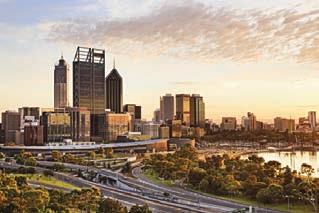
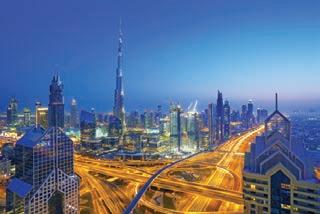
19-20 JULY
Dubai, UAE Logistics and supply chain forum in the GCC region.
www.sclarabia.com
DOWERIN MACHINERY FIELD DAYS
30-31 AUGUST
Dowerin, Australia
The Dowerin Machinery Field Days provides a vital information highway and one stop shop for all farmers, primary producers, agricultural workers, and their families, in a community environment that encourages a unique engagement and connection with industry and commerce. www.dowerinfielddays.com.au
NUFAM 2023
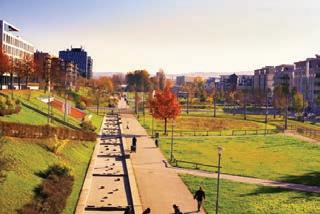
21-24 SEPTEMBER
Karlsruhe, Germany
More than 350 manufacturers and service providers from 13 countries have represented at this commercial vehicle industry event.
www.nufam.de
CEMAT AUSTRALIA 25-27 JULY
Sydney, Australia

From materials handling to robotics and automation, CeMAT is an opportunity to experience modern technologies and solutions that are applicable to Asia Pacific and beyond. www.cemat.com.au
KEEP A LOOK OUT
Solutrans 2023
21-25 November
Lyon, France
www.solutrans.eu
TransporterTage Berlin
30 November - 3 December
Berlin, Germany
www.transportertage-bb.de/die-messe
Breakbulk Middle East 2024
12-13 February
Dubai, UAE
www.middleeast.breakbulk.com
Work Truck Week 2024
5-8 March
Indiana, US
www.worktruckweek.com
Elmia Lastbil 2024
21-24 August
Jönköping, Sweden
www.elmia.se/en/lastbil
IAA Transportation 2024
17-22 September
HVTT 6-10 NOVEMBER
Brisbane, Australia

The 17th International Symposium on Heavy Vehicle Transport & Technology (HVTT17) will take place jointly with the 9th International Conference on Weigh-In-Motion (ICWIM9) on 6-10 November 2023 in Brisbane, Australia. The theme for the joint conference is Technology Convergence 2023 – Setting the Wheels in Motion: Reimagining the Future of Heavy Vehicles, Roads and Freight. hvttforum.org
Hanover, Germany
www.iaa-transportation.com
MEGATRANS 2024
18-19 September
Melbourne, Australia
www.megatrans.com.au
Bauma 2025
7-13 April
Munich, Germany
www.bauma.de/en
TO GROW EV FLEET
CEVA LOGISTICS
This plan was announced recently at Transport Logistic in Munich, Germany, as the company commits to its net zero 2050 target.
CEVA Logistics will be investing in 1,000 delivery vans, 300 straight trucks and 150 tractor units deployed across dedicated fleet operations, LTL and last mile pick and delivery operations—as well as for special projects like the recently launched European Clean Transport Network.
The expanded EV fleet would reduce the company’s CO2 emissions by an estimated 67,000 tonnes per year—the equivalent of 30,000 round trips by a truck between Paris and Munich.
The company is pursuing an ‘asset right’ strategy for its EV fleet. Along with the vehicles of its own employee-driven operating model, CEVA will also enable the transitions to EVs for some of its dedicated subcontractors. In the company’s shared user networks—where trucks are not dedicated to a specific customer—CEVA will sell the certified CO2 savings to customers to further support its EV fleet investment.
CEVA Logistics identified electric battery trucks as the most promising technology to replace fossil fuels and initiated its transition to electric vehicles several years ago. This decision permitted the company to build up its experience operating more than 200 EV vans through
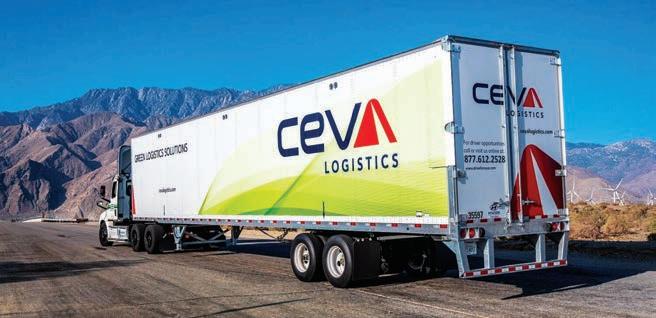
its Colis Privé subsidiary and more than 20 EV trucks across all continents.
In another example, CEVA has been operating seven JAC iEV1200T electric box trucks in its Ground fleet in Brazil since the end of 2021. The EVs have a range of 200 kilometres per charge and a 3.5-tonne load capacity via the 26 cubic metres of cargo space. After one year of use, the trucks covered more than 14,000 kilometres and transported more than 150,000 packages. The EVs are expected to provide annual savings of 56 tons of CO2 emissions—the equivalent to preserving more than 1,600 trees each year.
CEVA Logistics is also expanding its EV fleet in Thailand in 2023 to support sporting goods retailer Decathlon. The two companies began working together in Thailand since 2021 for nationwide ground distribution. After beginning with only one electric van, the fleet is now three electric vans and two EVO G9 electric straight trucks with a gross vehicle weight of 33,000 pounds. Two more G9 trucks are expected to join the fleet in 2023.
“An EV fleet of this size is a significant, tangible step in our journey towards a more sustainable future,” said CEVA Logistics Global Ground Leader, Xavier Bour. www.globaltrailermag.com
Ready

EveryhugeE-Mobility-Conceptstartswith asmalldetail:ThenewE-Axle-Systemby SAF-HOLLAND–yourfirstprogressivestepinto therightdirection. Getreadyforthemostsustainablewayrunningyourbusiness andstarttodevelopyourfleettowardsmoreefficiency,safetyand responsibilityforthefuture.
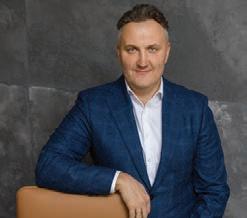
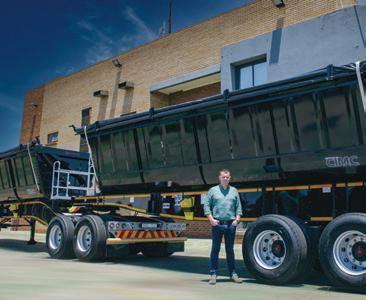


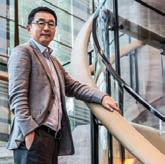
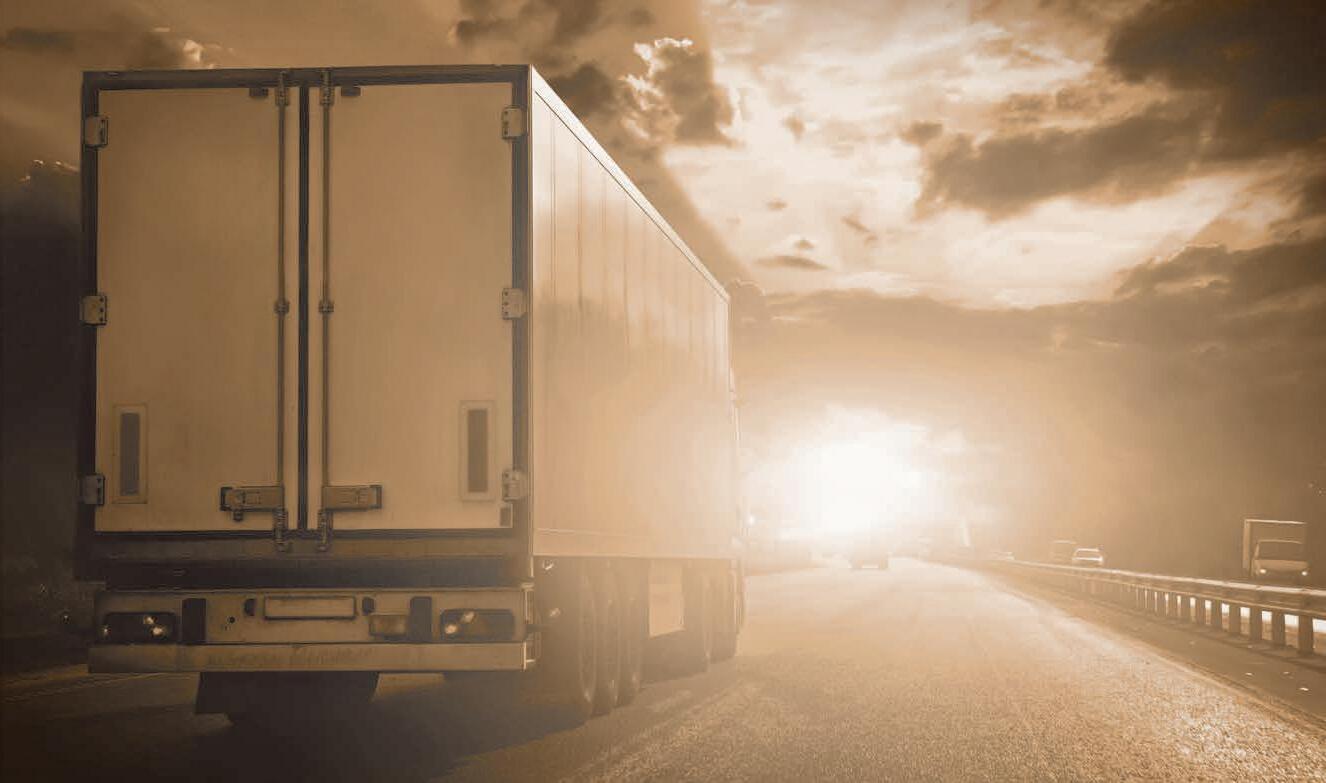
Into E-Mobility with SAF-HOLLAND
Heavy transportation traffic becomes electric, green and quiet with the recuperation axle SAF TRAKr
Every great E-Mobility concept begins with a first step: the new e-axle system from SAF-HOLLAND – the innovative technology for the electric transformation.
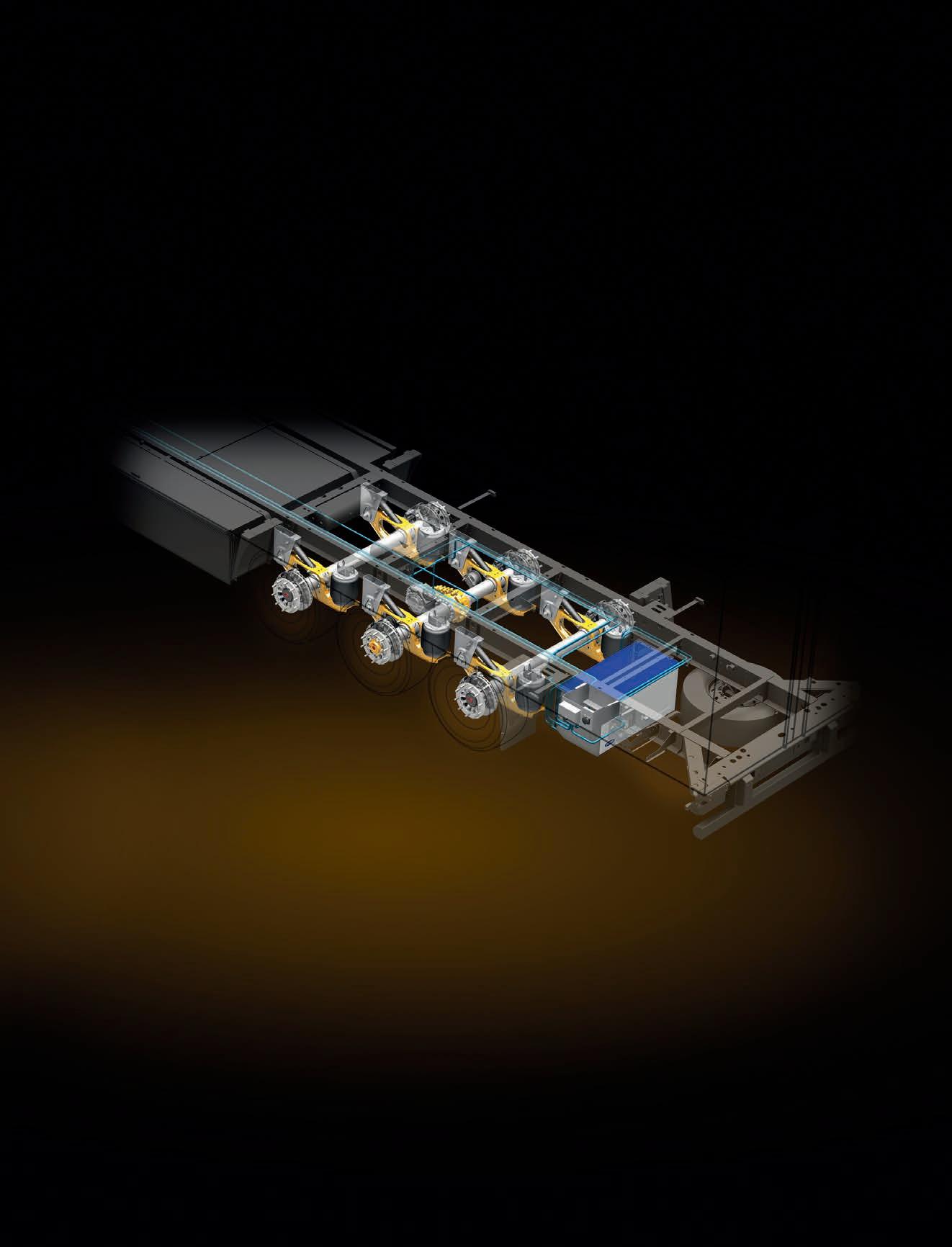
safholland. com

